 - Eric Hamza Byas-1.jpg)
 - Eric Hamza Byas-2.jpg)
| EDITOR'S NOTE | 3 |
|---|---|
| FAMILY LIFE | |
|
5 |
|
9 |
|
9 |
|
12 |
|
15 |
|
17 |
|
21 |
| EARLY YEARS 1966-1987 | |
|
24 |
|
27 |
| NASSAU UNIVERSITY MEDICAL CENTER (NUMC) 1987-1999 | |
|
32 |
|
35 |
| ISLAMIC CENTER OF LONG ISLAND (ICLI) | |
|
47 |
|
52 |
| ISLAMIC MEDICAL ASSOCIATION OF NORTH
AMERICA (IMANA) AND ISLAMIC SOCIETY OF NORTH AMERICA (ISNA) |
|
|
59 |
|
61 |
|
61 |
|
66 |
| ARFA AND FAROQUE KHAN FOUNDATION (AFK) | |
|
68 |
|
69 |
|
73 |
|
74 |
|
75 |
| AMERICAN COLLEGE OF PHYSICIANS (ACP) | |
|
76 |
|
79 |
|
80 |
| AMERICAN COLLEGE OF PHYSICIANS (ACP) | |
|
83 |
|
87 |
FAROQUE A. KHAN
ARFA KHAN
TAHNIA DISA
SOHAIL NABI
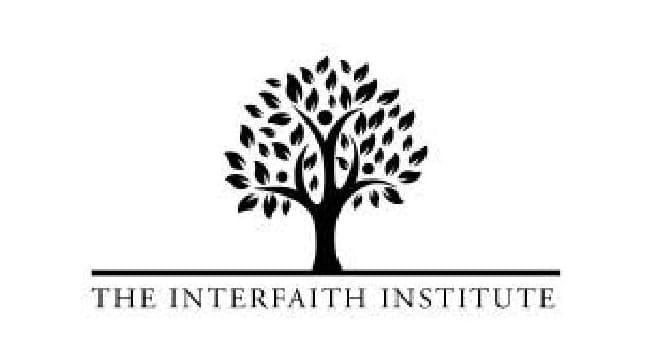
WEBSITE : WWW.INTERFAITHNY.COM
WEBSITE : INFO@INTERFAITHNY.COM
These writing pieces and brief testimonials were compiled through submissions from the friends, families, classmates, and colleagues of Faroque A. Khan. We gathered a list of persons and we recognize that no list can be complete; we regret any omissions. We have strived for accuracy, and any errors of fact are ours.
My parents Sara and Ghulam Hasan Khan were blessed with seven children, five boys and two girls, with brother Rashid born 1923, the oldest, and I, the youngest, born in 1942. We had a typical large Kashmiri family in a multicultural environment. I received my early education in an Irish missionary school and after 9th grade, I transferred to another school. It was a given in our family that we will all get educated to the best of our abilities. The reader will be surprised to learn that our home in the 1950s, when I was growing up, had all kinds of mementos from Harvard University Alpha Omega Alpha and Tau Beta Pi which my dad had received when he was an engineering student at Harvard from 1927-1930. Dad was a trailblazer in that he was the first in the family to get educated and then obtain a scholarship for Harvard University. I did well in my studies, passed matriculation with a very high grade and then the pre-med exam, and was all set to go outside Kashmir for my higher education as all my older siblings had done. However, in 1959 a new medical school was established in Kashmir and I was selected for the first batch. I was disappointed because I didn't get a chance to leave home and see the rest of the country, but there was a mixed blessing in this: I received quality education with minimal financial burden on my parents and I also met my future wife Arfa, the valedictorian of our class. We got married on April 16, 1966. My childhood was quite happy and fulfilling as we were very active in outdoor sports and reading. Remember, this was all before the advent of television and social media. The comments from my three surviving siblings, brothers Nazir, Rafique, and sister Mumtaz will provide additional insights into our family life. After marriage, our family expanded and the reader will enjoy reading the comments from my wife Arfa and the many nieces and nephews which provide an overview of my early childhood.
A question often asked is why did we come to the United States and not the United Kingdom as many of the Kashmiris up to that time had been doing. Personally, I had a very poor opinion about Britain based on the 200+ years of colonization of the subcontinent and we also learned that there were training opportunities in the United States and many international graduates were being welcomed because of the physicians scarcity caused by the Vietnam War and the resulting draft. So after some deliberation, we decided to come to the United States. We landed on Memorial Day in 1966 at Kennedy Airport and the next day, we went to Barberton to join our program at Barberton Citizens Hospital. Our annual salary was about $3,500 and my first two-week paycheck was about $139.
After completing our training, Arfa and I were all set to return to Kashmir. However, my dad, much to my mom's displeasure, wrote and advised us to stay in the United States. Paraphrasing, he wrote “you will be an eyewitness to the atrocities committed against the Kashmiris”. I'm glad we took his advice and made the United States our home by choice.
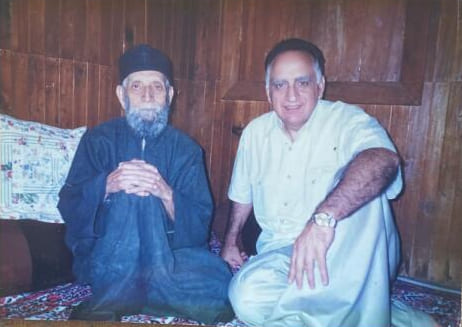
Faroque Khan and Ghulam Hassan Khan, father of Faroque Khan.
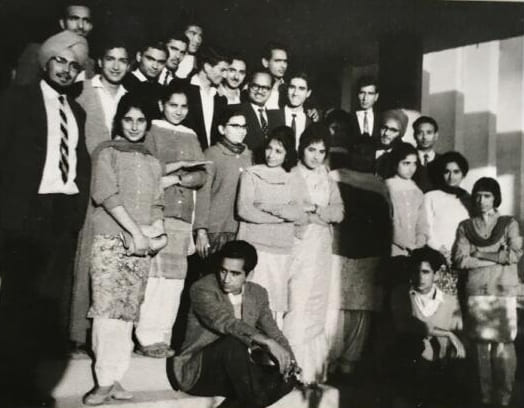
First batch of students in Government Medical College, Srinagar, Kashmir in 1963.
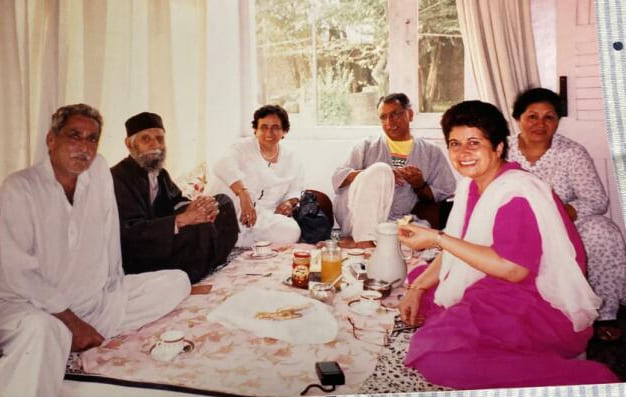
Family tea time in Barzalla, Kashmir. From left to right: Brother Shafi (deceased), G.H.Khan (father), Sister Mumtaz, Brother Rafique, Bhabhi Bilquis( Shafi's wife), and Arfa.
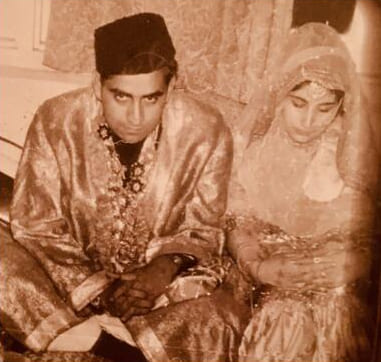
Arfa and Faroque Khan's wedding on April 16, 1966.
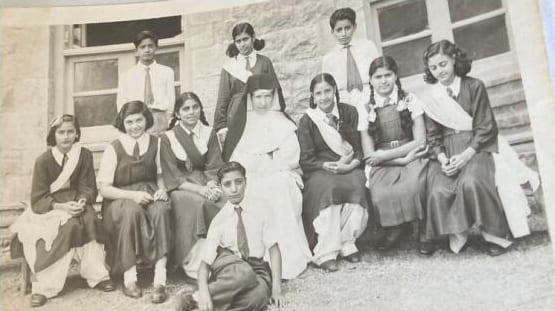
Ninth grade class in 1955 with Faroque Khan standing in the back right.
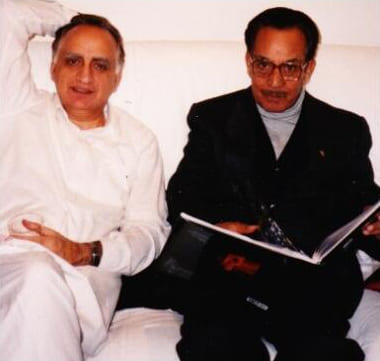
Brother Nazir Khan with Faroque Khan.
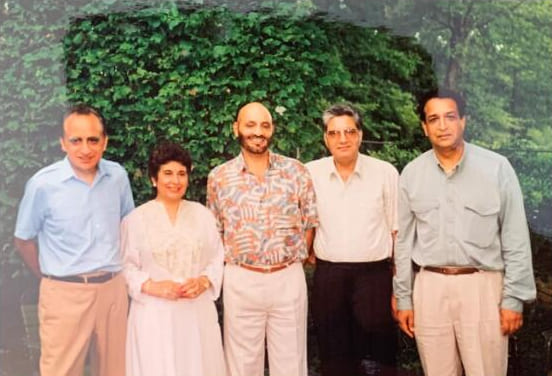
Medical school classmates from left to right: Faroque Khan, Arfa Khan, Shafi Wani, Altaf Hussain, and Mohinder Gupta.
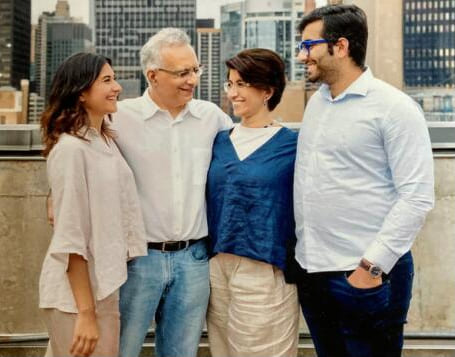
Picture of Arif, Seema, Hasan, and Leena.
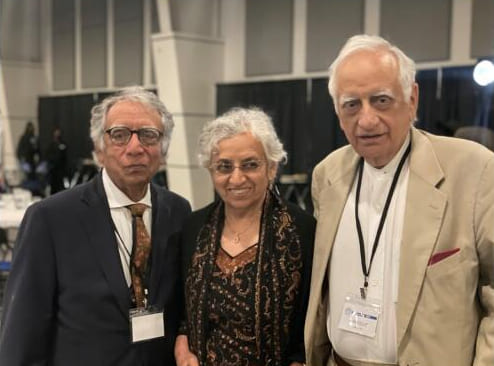
Siblings Rafique, Mumtaz, and Faroque Khan.
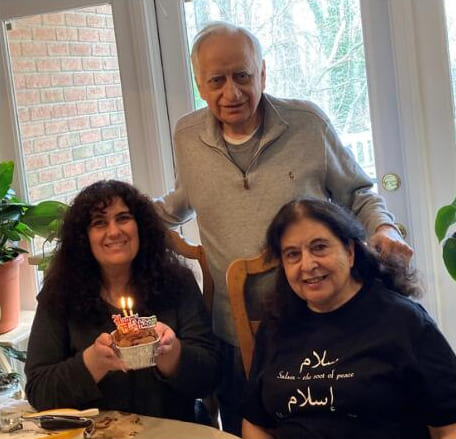
Shireen with her parents Arfa and Faroque Khan.
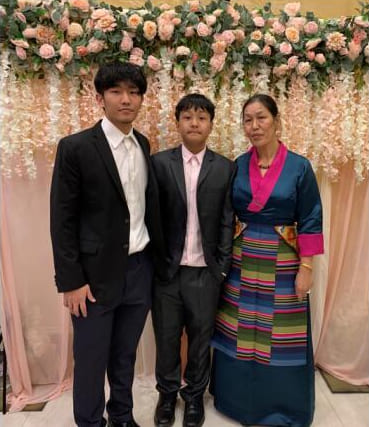
Jangmu Sherpa with her sons Dorjee and Kunjang.
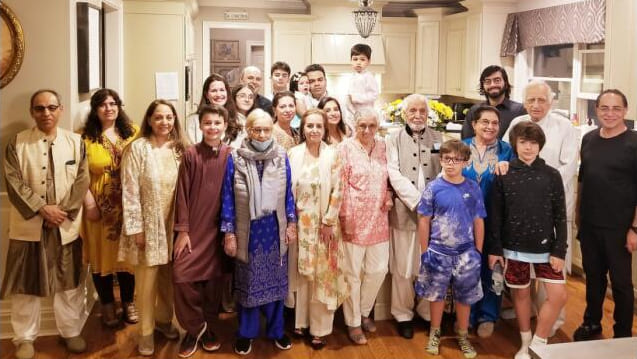
Eid with Brother Nazir Khan and his kids/grandkids/greatgrand kids.
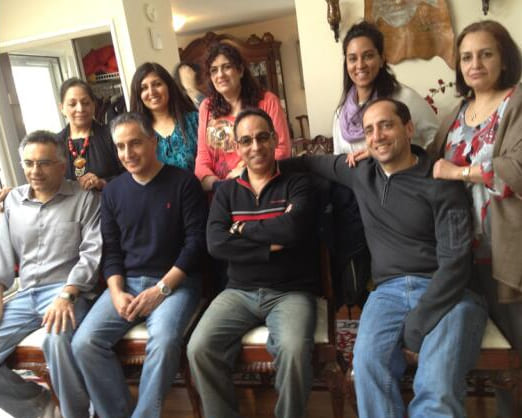
First cousins seated left to right: Arif Khan, Amjad Khan, Zahid Khan, and Obaid Khan; standing left to right: Daisy Khan, Sarah Khan, Shireen Khan, Sabiya Mir, and Mussarat Shareeff.
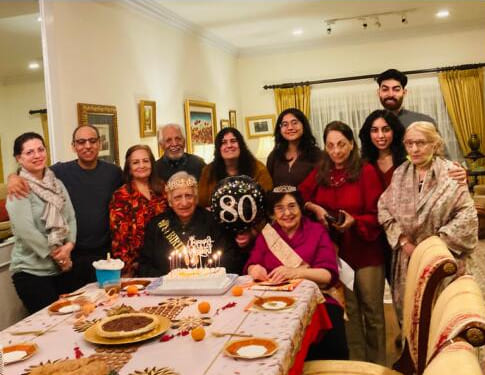
Family celebrating Faroque A. Khan's 80th birthday.
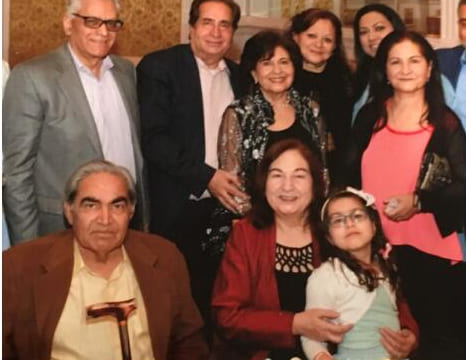
Sitting left to right: Mr. Ata and Zahida Khan; standing left to right: Nazir Mir, Ayaz Rasool, Arfa Khan, Shama Rasool, Bita Mir, and Rabia Mir.
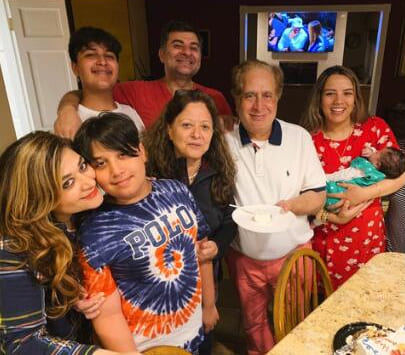
Rasool Family: Left to right: Reema, Kaleb, Shama, Ayaz, and Nighat with newborn Adam; back row from left to right: Noah and Omar.
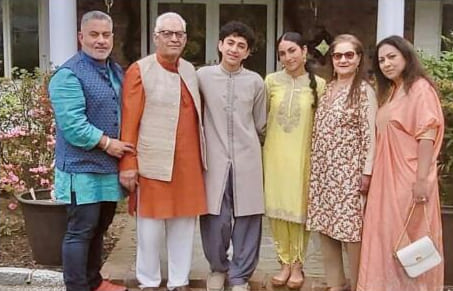
From left to right: Amir, Nazir, Jaiden, Eva, Rabia, and Bita
Mir.
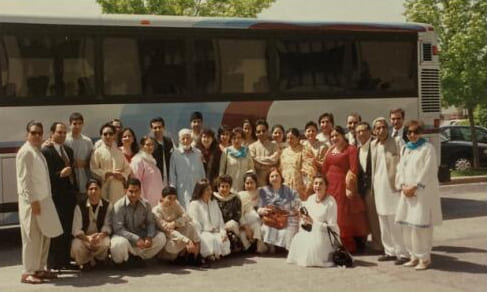
Arif’s barat on Memorial day 1995.
“It is the secret of strength: we are much more likely to find it in the service of others then in service to ourselves” - David Levithon
I consider myself very fortunate and blessed to have married the person who is being honored today for his lifetime achievement.
I met Faroque in 1959 in the first batch of the newly inaugurated Government Medical College, Srinagar Kashmir. In the fourth year of medical school Faroque proposed to me, and I agreed to marry him.
We planned to go to the USA for our postgraduate training. Faroque, being a good event planner and organizer, had registered us for the ECFMG exam. This was a requirement to go to America for postgraduate training. He also had obtained the forms for internship at Barberton Citizens Hospital in Ohio, completed them, and gave the papers to me just for signing. Why Barberton Citizens Hospital? Because Faroque’s elder brother, the late Shafi Khan, had a friend there in training. Dr. Ataulla Butt would be there to help and take care of us. And this was true! Dr. Butt went out of his way to help us.
Faroque’s father, the late Ghulam Hasan Khan, was the first Kashmiri to go abroad and do engineering at Harvard University (1927- 1930). He had laid 5 preconditions for Faroque to go to USA: #1. Marry a respectable young girl; #2. Return back after training; #3. Don't forget your relatives; #4. Give to charity; #5. Help the needy.
We got married on April 16, 1966. That was the happiest day of my life!
After a few weeks we landed at JFK Airport New York on Memorial Day in transit to Barberton Citizens Hospital Ohio. We were received by our friend Dr. Rashid Makdoomi. We spent our first night in the USA in an on-call room in Queens General Hospital where Rashid was a trainee.
Citizens Hospital, we moved to New York for our residencies at Queens General Hospital which was affiliated with Long Island Jewish Medical Center. Faroque did his residency in nternal Medicine and I did mine in Radiology.
Faroque then did a fellowship in Pulmonary and Critical Care at Albert Einstein College of Medicine. He became chief of Pulmonary Medicine at Queens General Hospital and later went on to become Chairman of Medicine at Nassau County Medical Center. He has trained over 350 residents and fellows who are practicing all over the world.
Faroque and I are founding members of ICLI. It actually started in 1980 when few families with young children decided to teach them about Islam. We started the “Sunday School” initially in each other's basement. After more families joined in, we moved to a storefront. After even more families joined, the Quaker church in Westbury was kind enough to let us use the classrooms of their church on Sundays.
The late Dr.Tariq Javaid found on Brush Hollow road in Westbury a one acre property with a small house, which we thought would be suitable for an Islamic center. The house cost $149,000 but there was only $10,000 in the bank. Funds were raised overnight, and the property was bought with cash! The basement of the house was designated as the prayer area, and on the first Friday congregational prayer only 3 people showed up.
The bylaws were made, which included that the executive committee should include a woman and this has held true until now. A few names were suggested and finally everybody agreed to name the institute as the Islamic Center of Long Island (ICLI). Faroque was president 1987 to 1988 and again from 2003 to 2005. Faroque is a life member of the Board and as chair of the long-term planning committee he initiated several outreach programs. These include dialogue with the Jewish community called American Muslims and Jews in Dialogue (AMJID) in 1992, the TV program “Our Muslim Neighbors” after 9/11, and the Islam 101 program for the Elder Hosteler after 9/11. He also initiated and organized the program honoring Muslim women of the community.
n 1984 while at Queens General Hospital, Faroque applied to 200 pharmaceutical companies asking if were interested in clinical trials of their products on patients in his hospital. Two replied. One of those was Miles Pharmaceutical. They wanted a clinical trial of the new drug Ciprofloxacin (Cipro) for treating lung infections in at least 20 patients. They offered $2000 per patient. Faroque ended up completing the study in 500 patients! This study was initially performed at Queens General Hospital and then was continued in Nassau County Medical Center. Miles Pharmaceutical was bought by Bayer, headquartered in Germany. The results of the clinical trial showed that Cipro was good for treating lung infections. This was the largest study of its kind. Bayer asked Faroque to present the results practically all over the world: including Germany, France, Italy, Belgium, Indonesia, South Africa, Nigeria, Australia and New Zealand. I accompanied Faroque on all these trips and was thrilled to visit different countries and experience different cultures.
Faroque was the first Muslim to be offered Mastership by the ACP and also the first Muslim to be selected as a Regent of the ACP. As a Regent he was sent to places with smaller chapters of ACP to advise and to answer any questions they might have had. On behalf of ACP Faroque was sent to Chile, Bolivia, Argentina, and Panama as well as to India, Pakistan and Bangladesh. I accompanied him on all the trips and got to visit all these countries and experience different cultures.
Faroque served as president of IMANA and as its board member. IMANA held annual scientific meetings locally as well as abroad. The international meetings were held in places like Turkey, Spain, and China. I attended all these meetings and got to explore more countries.
Faroque was invited to Riyadh to consult on the ailing His Highness King Fahd of Saudi Arabia. There he met the CEO of the new large medical complex, The King Fahd Medical City. He asked Faroque to set up a research program there. Faroque intended to stay for one year but ended up staying there for 6 years. Because of him I was invited to do a locum in radiology in the same hospital, which I did annually for a period of one month each year while Faroque was there. Faroque was responsible for setting up a local chapter of ACP in Saudi Arabia, the first one in Middle East!
On April 16, 2023, we will celebrate our 57th wedding Anniversary. We are blessed with son Arif, daughter Shireen, daughter in-law Seema and grand children Hasan and Leena. I can say that our marriage has been fulfilling and happy!
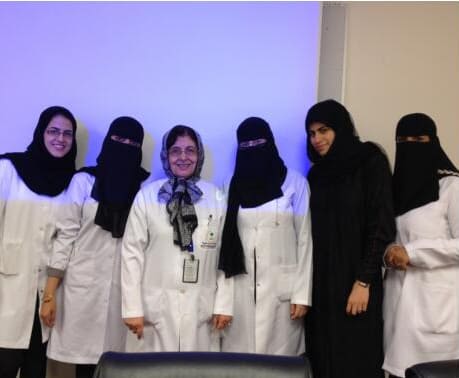
Dr. Arfa Khan with Radiology residents at KFMC Riyadh, Saudi Arabia.
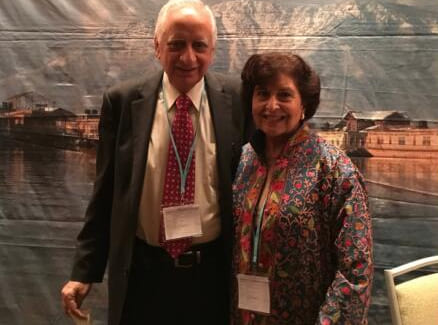
Dr. Arfa Khan with Radiology residents at KFMC Riyadh, Saudi Arabia.
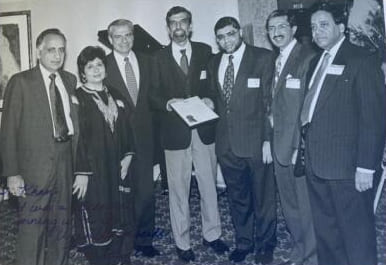
Dr. Arfa Khan with Radiology residents at KFMC Riyadh, Saudi Arabia.
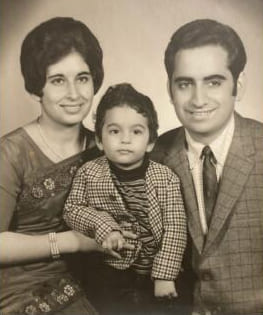
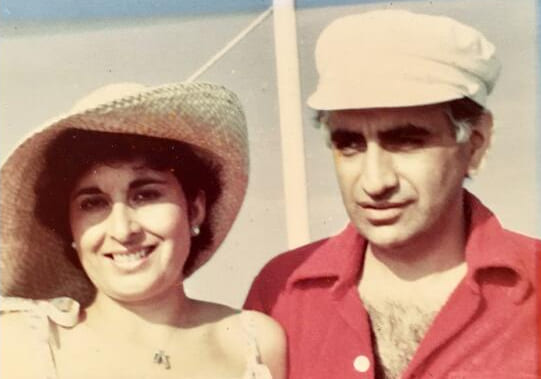
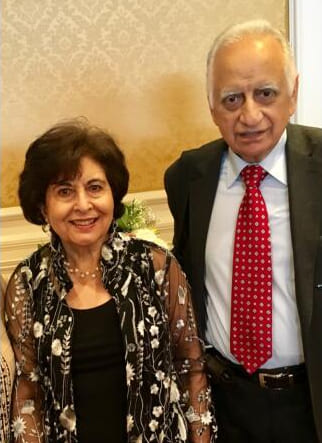
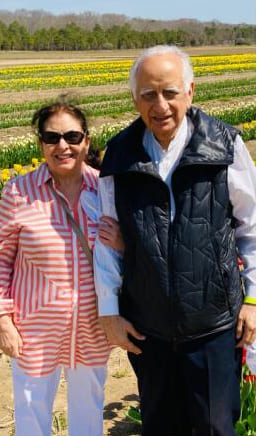
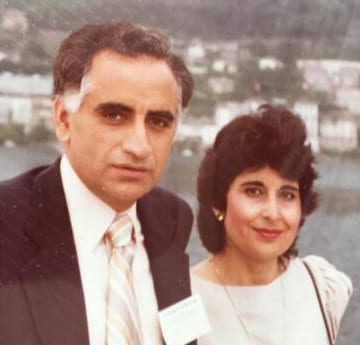
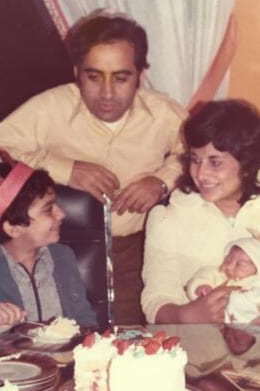
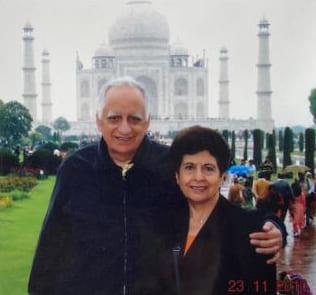
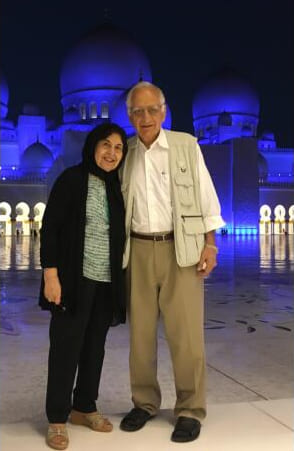
My parents were blessed with seven children--- they saved the best for the last. Faroque and I are the youngest. They were tougher on our older siblings, but by the time we came along, their parenting was very relaxed, and we had a very normal loving childhood. Faroque was good at his studies, but sometimes he would fall asleep during doing his homework, and our mother would finish it for him.
Faroque is younger than me, but somehow ahead in many ways.
He attended medical school in Srinagar, and I went to Delhi the same year. After graduation, we were both posted in the same hospital--- he would drive us back and forth. So that we could be independent of each other, he gave me driving lessons. Thanks to Faroque, I was among a few women in Kashmir that drove.
He got married and left for the United States. Two years later, he sponsored me and received me at JFK along with Arfa and Arif. Manzur and I stayed with them till we got jobs. Again, he taught me how to drive in the US in his big, red Ford.
Faroque and Arfa have helped many people in many ways. They have always been there for my family and me. A few events come to mind. Manzur and I had gone to a bank for a car loan and he happened to come simultaneously. He offered money, so we did not have to get a loan.
He kept Manzur busy at White Castle while my daughter Sabiya was born. Their apartment was Sabiya’s first home. All four of us were busy with our residencies, but we took care of one another. Faroque and Arfa bought a house in Long Island and encouraged us to get one in the same community. Our children were lucky to group up in each other's company.
I admire my little brother's compassion, integrity, respect, and excellence. I pray and wish him a long and healthy life.
Jamal and Hannah Mir:
You arrived here in America from Kashmir with $8 in your pocket. You left behind you a trail for generations to follow behind you. Your legacy has been to make our family proud and our community a better place. You have done this in the best way: through kindness, generosity, and thoughtful engagement... always in the spirit of brotherhood, sisterhood, and friendship. And on top of that, with an excellent sense of humor through it all. Thank you for being a great example of what a Muslim should be, of what an American should be.
My brother Faroque has always been a trendsetter! I often wonder if his birth in 1943 had anything to do with my mother and older sister giving up their burqas. At age 5, when he smoked father’s Hukkah, our home “Khan Manzil,” was declared a “No smoking zone.” When he became a doctor, he was stationed in a "moving tented hospital" where he became the first doctor to carry out circumcisions, previously done by barbers.
He was always among the top 10 in his studies until he entered Medical College where a beautiful and smarter Arfa Rasool continually beat him for a period of five long years, ending his winning streak. This academic rivalry turned into mutual love. He was the first in the family to duck an arranged marriage and married for love. He was a popular neighborhood doctor. On his marriage, he overheard a neighbor complaining about his sick wife; without a thought, he put on his coat and at midnight left his wedding chamber to treat the patient.
In 1964, when I was training in America, I sent Faroque internship papers; in 1966, he and his wife moved to America. In 1974, he took my daughter, Daisy, to America and educated her in Interior Architectural design. She designed the carpet for Long Island’s first big mosque, the Islamic Center of Westbury which he co-founded, and millions of foreheads prostrated on this carpet. He is the first Muslim to establish an Interfaith Institute in New York where people of faith come together to build bridges. Today, Daisy is following in his footsteps, and I give full credit to my youngest brother for her professional success, and I am pleased that she is dedicated to carrying his legacy forward.
Faroque, my little brother, is the bestest among his siblings. Using the baseball game metaphor, Faroque, in his earlier innings, excelled in his academics (first base), became a world-renowned physician (second base), nurtured a loving family (third base), remained an obedient and caring offspring of parents and community (home base). And, add to that: Faroque continuously uses his knowledge and resources, hitting home runs to better lives in his birthland and his adopted homeland.
Faroque is the youngest among seven siblings spanning a 20-year spread from 1923 to 1943. By the time Faroque was born, our family life was blissful in our idyllic homeland of Kashmir, now the most militarized region on earth. For his 10th class matriculation examination in 1957, the first university-level examination, Faroque stood first among all the Kashmir students. He is among the first batch of physicians trained in the Kashmir Medical College, started in 1959. He graduated in 1964, among the top ten grads. However, Faroque was not the first, that was Arfa Rasool. Faroque and Arfa, two competitors in medical college, become life companions. Theirs was what in Kashmir was known as love-marriage, a very rare happening in Kashmir then.
The love birds married in April 1966 and, 6-weeks later, flew to Barberton, Ohio, on Memorial Day to begin their medical careers in America. A year later, they moved to New York to continue practicing medicine. Faroque specialized in lung disease.
Faroque’s expertise as a world-renowned physician, visiting royalty like King Fahd of Saudi Arabia and business tycoons like Bajoria, the Jute King of India, has brought affluence. But, Arfa and Faroque continue to live unpretentious lives. Their home is in the first house they bought in the 1970s.
But when it comes to helping others, there is no frugality, only willing benevolence. Aspects of their philanthropy include:
Establishing and funding programs like training nursing students from Kashmir in overseas hospitals, guiding medical professionals from overseas to get trained in Americans Hospitals, help start the Research King Fahad Medical Center and a chapter of the American College of Physicians in Saudi Arabia, helping set up the Nargis Dutt ICU in Bombay, India.
Starting and managing the AFK Foundation. That has, since 1997, helped with student scholarship and humanitarian relief. Students benefiting are spread worldwide, in New York, London, and Kyrgyzstan. Faroque has helped hundreds of medical professionals advance their careers and helped deliver better medical care in the United States, Kashmir, India, and the Middle East.
Conceptualizing and then shepherding the Islamic Center of Long Island. Faroque’s leadership was central to forming the oldest purpose-built mosque on Long Island. The center serves as the nerve center for the Muslim community in Long Island. Under Faroque’s leadership the center has blossomed as a pivot for cultivating interfaith outreach in the United States.
Growing up in Kashmir, our values derived from parental behavior. Seeing our parents help others and avoid ostentatious displays became our moral compass. We Khan siblings do our best to remain on that compass; Faroque does the bestest.
Faroque bhai is a trailblazer. He is a visionary leader who has left an indelible mark on the Long Island community as well as the American Kashmiri diaspora. As his brother-in- law, he has not only impacted my life and my families life, but also the lives of many others in the community.
Faroque bhai is a trailblazer. He is a visionary leader who has left an indelible mark on the Long Island community as well as the American Kashmiri diaspora. As his brother-in- law, he has not only impacted my life and my families life, but also the lives of many others in the community.
Faroque bhai’s contributions to the Islamic Center of Long Island extend far beyond his role as a leader. He has been a mentor and role model to countless individuals, providing guidance and support to those in need. His compassion and empathy for others have been an inspiration to many, and his commitment to promoting understanding and unity among people of all faiths and backgrounds is truly remarkable.
Faroque bhai’s impact on our family is immeasurable. His kindness and generosity have touched the lives of everyone he has come into contact with. Whether it is through his mentorship or his unwavering support, Faroque bhai has been a pillar of strength and a source of inspiration for our family. Faroque bhai’s legacy will continue to inspire generations to come. His vision, leadership, and commitment to building bridges of understanding and compassion will remain a beacon of hope and inspiration for all those who follow in his footsteps. Thank you, Faroque bhai, for all that you have done for the community and for our family.
My hearty congratulations to Dr. Faroque Khan (for family he is Faroque Bhai) for receiving the Interfaith Institute of Long Island “Lifetime Achievement Award”. Faroque Bhai’s decades of work in interfaith relations and ability to build trust have not gone unnoticed. What impresses me the most about Faroque Bhai is that he responds to pressing interfaith needs with such visible joy/zeal and humility. He has made it his life’s work to ensure that interfaith dialogue and cooperation become a social norm in America. Over the past three decades, his efforts have reached a large number of religious and non-religious institutions thru direct interactions or visual presentations. As a respected Muslim leader in the community, a keynote speaker at various intuitions, author of number of books and articles, including intersection of racial equality and interfaith cooperation, he has contributed on local and national issues of religion, diversity and civic engagement.
Faroque Bhai’s work in interfaith has strengthened our civil society by lifting up the voices of New York’s diverse faith communities. At this moment when many religious and ethnic groups feel under attack, and news of hate crime prostrates/spread on the internet, we hope the work of Interfaith Institute of Long Island and faith leaders like Faroque Bhai are part of the solution.
Thank you Faroque Bhai for your dedication to the family and all the work you do on behalf of the Muslim community. “Quran tells us to focus on cooperating with others on the path of righteousness and piety – in whatever we do in life, and hold the morals of compassion and goodness above all else”.
Congratulations!
“There is no higher religion than human service. To work for the common good is the greatest creed” - Woodrow Wilson
Congratulations Faroque Bhai for this awesome honor richly deserved for your interfaith work of numerous years in the spirit of Islamic teachings. You make us proud and we hope you continue to promote interfaith understanding for years to come.
There is a whole trail, a whole history of good things that have led to this point.
You have been a distinguished scholar of medicine in pulmonary and intensive care and medical education, leading up to the rank of professor of medicine at SUNY, Stony Brook. Your numerous scientific review publications, book chapters, countless national and international presentations as well as awards, including first international medical graduate Regent of American College of Physicians, are a testament to your contributions to the medical field. Above all, you touched the lives of many newcomers training as medical postgraduates in internal medicine and pulmonary medicine.
Happy beginnings and difficult challenges are the foundation of every great accomplishment. Thank you for shining through!
Wishing you good health and happy family life.
Friendship changed to relationship.
Faroque’s mother and my grandmother were neighbors and friends at Barzalla Baghat in Srinagar, Kashmir. Faroque’s sister and I were friends in college and medical college. When Faroque married my sister, Arfa, this friendship changed to relationship. Faroque is like a brother to me. I will never forget when I was new to the USA without any place to live, without a car, and very nervous and insecure and homesick, Faroque helped me with interviews and driving me to places. He also gave me a lot of moral support that helped me through a very difficult time of my life. Still now, I can depend on him for any help and advice. May God give him health and happiness and all the best life has to offer.
The scientific and societal impact my father has had is staggering and spans multiple roles. These include: a physician to his patients, a professor to his trainees, a published academician in his field, a provider for the needy, a leader for his community, a spokesperson for interfaith dialogue, and more. As his son, I can share stories from my school years that reflect who he was and foreshadowed the societal leader he was to become.
When I was in elementary school in the 1970s, Dad used to take me to NYC for comic book conventions, long before they became mainstream. What I specifically remember is what he was doing while waiting for me to take me home from the city. Dad would be reading and annotating a large hardcover book Christianity, Judaism, and Islam.
When I was in middle and high school in the 1970s and 1980s, I remember being tasked with licking and stuffing envelopes for community events and fund-raising mailers. Also, I remember all sorts of people staying over the house. They included relatives starting out, trainees seeking opportunities, refugees who needed help, and sometimes prominent individuals invited to interact with the local community. Maurice Bucaille was a French physician most known for his book The Bible, The Qur’an, and Science. When he was invited to visit our community, I was assigned to pick him up and take him on his itinerary. Dad told me that I would never forget escorting him. He was right.
When I was in college in the 1980s, to visit home from New Haven I took connecting trains via NYC to Long Island, all of which took a few hours. Once my college roommates came home with me to visit. When it was time to go back, Dad volunteered to drop us at the Long Island station. But then he drove past Hicksville station and said “I’ll drop you off closer to NYC.” But then we passed Queens. Dad said “It’s just a little further, I’ll drop you off in NYC.” He ended up making the 90- minute drive to New Haven just to drop us off.
These anecdotes are examples of desire for interfaith understanding, activism in community service, action to help those in need, and going out of one’s way for others. His phenomenal life accomplishments followed, and nothing pleases me more than to see him recognized. Congratulations Dad and I love you!
Back in the 1980s & ‘90s, my father turned the international medical conferences he attended into family vacations. So, I have to thank Dad for all my free for me world travels. Because of Dad’s attendance at Islamic Medical Association conferences, I got to ride a camel in Jordan and had unforgettable trips to Spain, Morocco, Greece & Turkey. Also thanks to Dad’s work when developing Ciprofloxacin, I got to see Switzerland, Prague, Italy as well as East & West Germany the year after the Berlin Wall came down!
Speaking of medicine... I tend to become ill when the seasons change. It became more noticeable when I went away for college. When my illness(es) kept me up at night, I’d call Dad asking what to do. After asking about my symptoms, if I took my temperature, and how long I felt sick, Dad would say use over the counter medicines based on my worst symptoms. My dorm was across the street from a 7-11 convenience store. I started going to that 7-11 when I felt sick and would tell Dad about it after feeling better. Dad then started referring to how I took care of my physical health as my “7-11 School of Medicine education”. He still does. Recently, I considered applying for a learning specialist position at CUNY School of Medicine but hesitated because it sounded like medical education experience was needed. When I told Dad, his response was “Your 7-11 School of Medicine education wasn’t enough?” ...Nope.
“Legacy, what is a legacy? It’s planting seeds in a garden you never get to see” - Lin-Manuel Miranda, Hamilton the Musical
No one would ever associate Lin-Manuel Miranda’s Hamilton rap with Dr. Faroque Khan, the perfect image of a mild- mannered, soft-spoken, retired physician, who doesn’t look like he listens to rap. Yet, one summer, I found my father-in- law engrossed in listening to the Hamilton CD on repeat, first checked out from the library and then purchased. He told me he was trying to understand the lyrics so that he could watch the play. Simultaneously, he read everything he could about Hamilton, so he would understand the context of the story. Then, although he didn’t like traveling into NYC, he tried to get tickets to the play on Broadway with his “partner-in-crime”, my mother-in-law. When he couldn’t, they watched it multiple times on TV.
This story epitomizes my father-in-law’s approach to life. He is a still water that runs deep like the ocean, open to all experiences, fearless in learning, diligent in understanding the unfamiliar, respectful of others’ views. His tolerance, his courage, and his gracefulness under trying circumstances has never been more evident than his desire to serve the Interfaith Institute in a manner reflective of the best of all people. Every time I visit, he enthusiastically shares a new story of a new part of faith or a way of belief that he has been exposed to, with a love and respect that he teaches us by demonstrating it in his own behavior.
And it is his behavior that I believe is his greatest legacy, and what I admire most. He never asks someone else to do something that he is not already living himself. He serves by example, always helps others asking nothing in return, is unfailingly kind, and listens more than he speaks. When he does speak, he does so with wisdom. This is what makes him the epitome of a true leader and representative of the spirit of IFI, an institution built on tolerance, courage, and the willingness to learn about others.
To myself and many others, Faroque Ahmed Khan (aka Dada-Ji) is a role model in how to be a leader in different worlds. He’s recognized as a leader to his homeland of Kashmir, as even when far away, he’s a provider of education and relief. He’s honored as a leader to his adopted community of Nassau County for bridging different faiths with quiet humility, despite the loud voices pushing them to divide. He’s loved as a leader to his family for always being there for guidance, support, or a warm laugh. What makes him so naturally a leader in such different contexts? He doesn’t chase this responsibility, it falls upon him because it’s who he is.
In this journal you’ll find many examples of him teaching, helping, and inspiring others. He leaves his mark not only outside, but inside his home: a shelf full of books, a garage full of newspapers, and a freezer full of butter pecan ice cream. His legacy is not only that of a great man and a great leader, but a great grandfather.
To the general public, Dr. Faroque A. Khan is a legendary pulmonary physician and pioneer in interfaith dialogue. His numerous medical and community-building accomplishments distinguish him as an exceptional figure in public service. But Dr. Khan’s celebrity as a superstar doctor and inspiring community leader is something that I have only come to appreciate recently. For most of my life, he has first and foremost been my Dadaji. And as my Dadaji, he has incited more awe, humility, and love within me than one could ever think possible.
One time that I felt in awe of Dadaji was when I visited during Thanksgiving after starting college. I was abuzz with all the shiny knowledge and experiences I had acquired and was eager to show my grandfather how I had grown. Over dinner, I recited factsheets about colonialism in the Middle East and internally assumed expertise on the topic. But Dadaji, over the mountain of dahl and rice on his plate, quietly responded about the British in Palestine as if he were actually there. I was amazed that Dadaji knew so much about subjects he never formally studied, and suddenly, it hit me that the dozens of books lining the shelves of his study are books that he has actually read. Dadaji consistently seeks to expand his mind and understand the world around him. I realized his quiet is not for lack of knowledge or confidence, but for a natural instinct to listen and to learn. This was one of many moments in which I hoped deep in my heart to be just like him one day.
A time I always feel humbled by Dadaji is during Ramadan. Growing up, I spent Ramadan at my grandparents’ house where suhoor, the crack-of-dawn meal before beginning your fast for the day, was a community affair. My mom would herd my brother and I, both half-asleep, to the kitchen downstairs where without fail, Dadaji would already be enjoying his paratha and egg while reading the newspaper. Any complaints spinning in my mind about the injustice of my disrupted sleep would die when I saw Dadaji eat, pray, and quietly work at his desk all before the sun came out. I aspire to one day achieve such great faith and discipline.
Finally, I feel love for Dadaji in every moment we have spent together. At dinner, he pinches my arm under the table and pulls on my ears while looking in the other direction like an innocent bystander. “Elder abuse!” He would exclaim to the rest of the family whenever I retaliated. Every morning, we go for walks to the exercise park where he relays the wisdom he’s gained in his decades of life. In recent years, I’ve begun to finish his sentences about clinical trials at Queens General Hospital, culture shock in the United States, and all the other stories I now know like the back of my hand. In the evenings, chuckle to myself when I pass his bedroom door and the floor vibrates with the power of his monstrous snores. Dadaji is my respected elder, my teacher, the head of my family, but he is also my friend. I’m incredibly impressed at the extraordinary life that Dr. Faroque A. Khan has achieved. But even more so, I am blessed to know him as my Dadaji.
I have worked for Dr. Khan since May 1998; however, I do not see it as work because, from the beginning, they have always treated me as their family. I think of my job with them as taking care of my parents because they have taken care ofmeasifIwastheirown.WhenIcametotheUS,they sponsored me, helped me with my home, and then supported me through my wedding. I realized how much they cared for me when my husband passed away and when they did what they could to ease my grief. They then ensured that my sons, Drojee and Kunjan Sherpa, were also they cared for me when my husband passed away and when they did what they could to ease my grief. They then ensured that my sons, Drojee and Kunjan Sherpa, were also set by advising me about their schooling, their upbringing, and welcoming them into their home. In good times and sad times, they have always given me their unconditional respect and affection. Dr. Khan always teases me that I know more about everything than they do. The truth is, he taught me how to be so careful and observant, and I learn from them every day. I am very blessed that they are in my life, and I pray for them always.
Faroque Chacha is a truly remarkable person. His kindness and generosity have touched the lives of so many people across the world. He has a heart of gold and is always willing to lend a helping hand to those in need. His selflessness and compassion are an inspiration to us all. I am so grateful to have him in my life and I cherish every moment I’ve spent with him. Faroque Chacha epitomizes the true meaning of love and kindness. Over the years, he has developed a common interest in technology and cricket, that has brought us closer and each time I meet him, these are 2 topics we discuss.
There is so much for all of us to learn from Faroque Chacha, whether it is his calm demeanour, the measured talk, getting things done, timeliness, positive attitude, and bringing people together. He is the north star when it comes to having a successful career and family life, a role model for us and the next generation to follow. I wish Faroque Chacha the best of health and congratulate him on this well- deserved recognition for his contributions.
Growing up in the same home, I got to spend a lot of time with Faroque chacha. There are many good memories of the time we spent together but I will share just a few. One of the earliest recollections I have is catching frogs for him, so that he could practice dissection. He assigned me the task to wake him up during exam times and, if he failed to quickly wake up, throw cold water on his face. Only had to do that once. But the most important memory that I have with him is from December 1963. I was just 13 years old when a holy relic was stolen from the Hazratbal shrine. It caused Kashmir valley to come to a standstill. It is estimated that half a million people took to the streets. A huge rally occurred at a central mosque in Srinagar. I accompanied Faroque chacha on the 5 mile march with the demonstrators in bitterly cold weather. That peaceful march made me politically aware at a very young age. I remember how we were served chai(hot tea) along the route by the Pandit community. That experience of a peaceful Kashmir has been something that I can never forget.
My uncle, affectionately called "Chacha," has been a lifesaver to me in more ways than one. The first time was when I got into a scrap with a rabid dog, and he, a medical student at the time, gave me a series of shots to prevent rabies. Ever since then, he's been known to say, "Don't mess with Daisy, she even bit a dog back!"
When he heard that my education was at risk, he came up with a plan to rescue me. He took me under his wing and brought me to New York, where I could continue my studies under his guardianship. Under his guidance, I learned the importance of giving back and that actions do speak louder than words.
Chacha's commitment to egalitarianism extended even to the construction of the Westbury mosque, where he advocated for equal space for women in the main prayer hall. When I faced opposition to my vision of building an Islamic community center in Manhattan, Chacha provided a clinical metaphor to reassure me. He understood the opposition from his own experiences in the post-9/11 era and likened it to a chemical reaction where an enzyme triggers a bubbling up of everything at the bottom.
The influence of Chacha on my life cannot be measured. By bringing a teenager to America, he took a significant risk. Before I departed, my grandfather, Ghulam Hassan Khan, inscribed in the Quran, “Make the Khan name proud.” With Chacha’s guidance and inspiration, I am confident that I can accomplish this mission. I am determined to emulate his qualities of integrity, modesty, benevolence, proficiency, and perseverance, in pursuit of achieving remarkable feats.
All my life Faroque Chacha, or Chachu as we fondly call him, has been a guiding light, a North Star if you will for the family. My earliest impressions of my father’s youngest brother are of a smiling, tall uncle that my siblings and I saw every summer. He was someone my parents were clearly fond of. My father would always have a smile on this face when there was a mention of his brother. The same brother who’s lip he smashed with a badminton racket I think, which added to Faroque Chacha’s good looks. My mom used to call him Gregory Peck. I think the biggest influence Chachu, as we call him had was on our grandfather. Abuji, always shared stories of a smart young man who went on to break all barriers professionally.
After coming to the US, I realized that Chachu had created a little bit of Srinagar here. The Islamic Center of Long Island or ICLI as it is called was a mosque away from home, and a place to reclaim my religion. Chachu continues to be selfless, helpful without expecting anything in return and gently clearing the path for my first job, which led to the start of a new career and friendships.
Chachu has such a calm demeanor. He is wise, so caring, and compassionate. He has a way with words. He can hold a conversation with a 10 year old and a 10 year old with so much ease. What strikes a chord with me is his love for the community as a whole. Our family wishes the best for him always. We love you Chachu.
I am almost certain that I am Faroque Chacha’s favorite nephew. I have a few facts to prove it.
On his wedding day, I accompanied him as his “Poth Maharaza” (Junior Groom), a long-standing tradition in Kashmir. Celebrating birthdays was not a big tradition in our home, on his visit to Kashmir, he arranged the celebration of my 10th birthday. When I was bitten by a dog, he came to my rescue and administered 14 injections to my stomach.
When I landed in New York in 1990, I stayed at their home in Long Island, where he gifted me his Chrysler convertible LeBaron and, the next day, gave me directions to the SUNY Farmingdale campus. He trusted me to be his "welcome committee" at JFK airport, where I received countless new doctors emigrating to the USA under his sponsorship.
I was fascinated as a Civil Engineer when he took me to the ICLI Mosque construction site. It was heartwarming to see how my uncle was following in his father’s footsteps, who helped build our neighborhood mosque in Barzalla, Kashmir.
My larger-than-life uncle is rightfully honored here today. As his nephew, I am particularly proud of his efforts. When I see the expanded ICLI campus, I feel indebted; we not only worship here, but our children have received the greatest gift of all, the education of their faith.
Dr. Faroque Khan is truly a living legend whose accomplishments have inspired and benefited countless individuals. As my uncle, he has undoubtedly had a significant impact on my life and the lives of many others. It is an honor to pay tribute to him and his remarkable achievements.
Dr. Khan's dedication to medicine is unparalleled. His decades-long career as a physician has allowed him to touch the lives of countless patients and their families. His tireless efforts to improve the status of his community and promote young doctors are a testament to his selflessness and commitment.
Faroque uncle’s contributions extend far beyond the field of medicine. He has been a respected community leader and an advocate for social justice throughout his life. His unwavering dedication to advancing the rights of marginalized individuals and groups is a testament to his values and integrity.
Faroque uncle’s legacy will continue to inspire generations to come. His example serves as a reminder of the power of determination and hard work to effect change in the world. His compassion and commitment to making a difference in the lives of others have left an indelible mark on the world and on the hearts of those who know him. Thank you, Faroque uncle for all that you have done and continue to do.
Dr. Faroque Khan, called Faroque chacha by his numerous nieces and nephews, has been a role model, hero and mentor to me since I was a young girl. I vividly recall Faroque Chacha when he was a medical student in Kashmir, a charismatic house doctor to our entire family, friends and neighbors; he exuded the rare confidence and demeanor befitting a great physician in evolution, and this is the image that has stayed for years. Upon his graduation from medical school (with honors), he married the best outgoing graduate, had a fairy tail wedding and moved to the US to begin his career.
During my teenage years, Faroque chacha and his family visited Kashmir regularly for summer holidays, and during these visits he provided me with positive feedback about medical the profession in the US; particularly advances in medical research, and he always encouraged me to strive for the best. He often reminded me that “it takes only 5% intelligence and 95% hard work to make a genius”. He certainly followed this mantra himself; with his diligence, commitment and positive outlook, Faroque Khan went on to become a great physician, research guru, chairman of medicine, VP of ACP and a Regent, and with time as the need of the hour was, he transitioned to community work.
Faroque chacha has played a vital role in my life. As a medical student in South India, he supplemented my tuition and pocket money for quite a while, and upon graduation he even offered to pay for my ECFMG exam and sponsor me if I was interested in coming to the USA. I chose to get married and pursued my career in India, and many years later, as a twist of fate, my husband passed away and I decided to relocate to the US with my two children and start my career all over again. Faroque chacha was always there for me, he offered me his unwavering guidance, staunch support, and even helped me get into a research program till I got my feet on the ground. He even played a role model for my teenage children, chauffeuring them to their summer driving lessons and engaging them in conversation (a task not easy by any means, and an experience that my kids remember to this day). He has not only been an exemplary role model, but a father figure to me as well.
I attribute a lot of my success to the encouragement, motivation, and inspiration that I received from my uncle. The qualities I admire most, and have truly inspired me, are his determination, compassion, goal- oriented approach and most importantly commitment to making the world a better place. He is a devoted and caring husband, he has committed himself to the advancement of education for the underprivileged and strongly believes in peace and harmony amongst communities.
Faroque chacha has received zillions of accolades and achievements, he has also faced a lot of challenges and ordeals, however, I have never heard him utter anything negative against those who have wronged him, and he holds no malice. The above qualities set him apart, not just as a great achiever, but as a great, humane, leader. I wish him good health, happiness and big God Bless.
It is with great admiration and respect that we gather to celebrate your lifetime achievements. Your dedication to the medical profession, your passion for social justice, your commitment to interfaith dialogue, and your contribution to the creation and growth of the ICLI masjid are all testaments to your unwavering commitment to making the world a better place.
Through your example and tireless work in the medical profession, you have been an inspiration for generations of physicians. Over the years, I always admired how you always stayed true to your roots and supported opportunities to give back to countless young doctors and nurses in Kashmir by setting up clinics and education.
Your contributions to the interfaith community have been invaluable. Your willingness to engage in dialogue and build bridges between different religious communities has fostered greater understanding and respect between people of different faiths. Our world needs more and more of this! Finally, your role in the creation of the ICLI Mosque is a testament to your deep commitment to your faith and your community. Through your leadership and dedication since day #1, you have provided a place of worship and community for countless Muslims in the area. As one of your many nephews, you also served to remind us first-generation Americans of the value of religious and cultural identity, and the ICLI was very much a part of shaping this identify. Not to mention how cool I felt having an uncle who was always being recognized, photographed, or quoted in the newspaper!
Faroque Uncle, your achievements are a testament to your character, your compassion, and your unwavering dedication to society as a whole. You have also always been such a loving, jovial, and supportive Uncle throughout my childhood, and well into adulthood, and have always served to remind us of the importance of family. Your humble and nurturing approach has always made us feel at home and at ease in your presence. Karol Place will always hold a special place in my heart and represents so much for our entire LI Kashmiri family.
We are grateful for all that you have done and will continue to do, and we are proud to call you our uncle and friend. Congratulations on a lifetime of achievements, and may you continue to inspire us all.
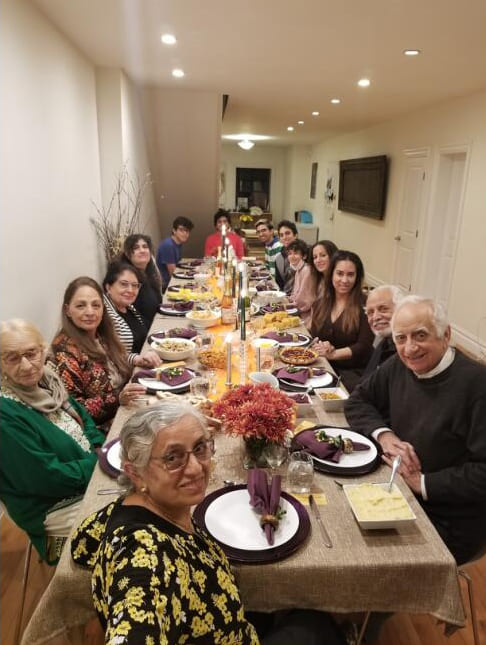
Two Thanksgiving get togethers at Sabiya Mir's and Zahida Khan's.
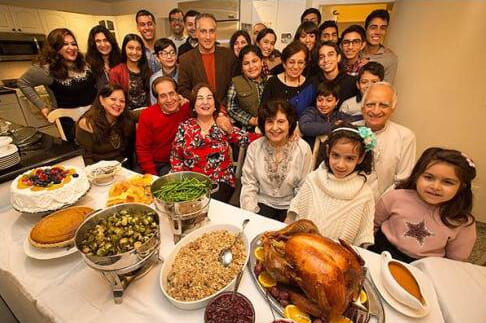
Two Thanksgiving get togethers at Sabiya Mir's and Zahida Khan's.
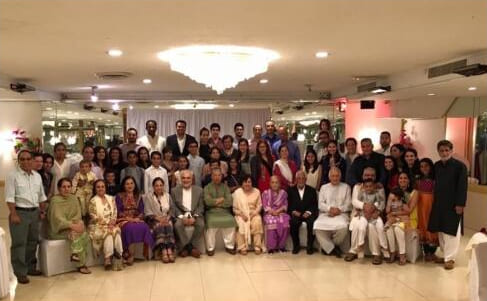
Todays honoree, Dr Faroque Ahmad Khan, and I, Dr Ghulam Jeelani Dhar, were classmates in the newly established medical school in Srinagar, Kashmir from 1959-1964. Our faculty was mostly British trained and the USA as a training for post graduation was a rarity. Faroque managed to change all that. He learnt that if a medical graduate passed the ECFMG exam, he/she would be eligible for residency training in USA. The closest ECFMG exam center was in New Delhi about 500 miles from Srinagar. One day, Faroque casually mentioned that he had registered for the exam and suggested I also take a chance and, with some luck, may be allowed to take the exam though I had neither prepared for it nor completed the required formalities. I will never forget Faroque’s off-hand remark: "Well, you need to pass ECFMG if you want to go to USA. We are going and you can come along and try for it and if you are not permitted to do so, you can at least have a good vacation." It is that generosity that allowed me to tag along with Faroque, Arfa, Mumtaz (Faroque’s sister), and Amarjit Singh and manage to navigate the bus ride followed by train ride to New Delhi. The next challenge for me was to track down the person in charge conducting the ECFMG and plead with him to let me sit for the exam, albeit without ever having applied for it. I guess miracles do happen and this time in my case thanks to the honoree Faroque Khan, I was allowed to take the exam and did pass it unknowingly without any prior knowledge or preparation. Subsequently, following Faroque, the honoree, I also managed to come to the USA and train as a Gastroenterologist and we have remained in close contact ever since. Thanks to Allah.
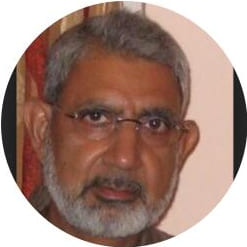
It is our honor and privilege to write this letter of appreciation for Dr. Faroque Ahmed Khan who is not only a colleague, but more importantly, a dear friend.
I have known Dr. Faroque for many years since our time together in high school back in Srinagar, Kashmir, after which we got together again in medical school for 5 years along with Dr. Amarjit Singh, Prem Gupta, and his present wife, Arfa Khan. We moved to the US together in 1966 and did our internship and residency at North Shore LIJ. His presence has always been comforting, to the extent that our kids would visit each other’s houses to play. I also owe him a great debt as his wife taught mine how to cook Authentic Indian food.
Throughout his life, he has shown compassion in his work, teaching medical students and house staff, as well as going out of his way to serve the community, raising funds for the schools in our hometown, providing fresh water, as well as building the roads. Not only was he serving his community abroad, but also right here as the chairman of the Mosque, Founder of the AFK foundation, a well-known Pulmonologist who showed a keen interest in pulmonary diseases, giving various lectures Nationally and Internationally, and chief of medicine at Nassau County Medical Centre.
He has also been bestowed the Masters of American College of Physicians (which is awarded to very few Physicians).
It has been our pleasure to have known him and share what little we can about him, and we are proud to call him a brother. We wish him and his family good health and happiness in the future.
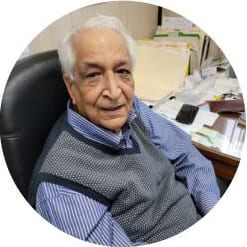
My friendship with Faroque Khan began when we joined the newly built Medical College in Srinagar, Kashmir several decades ago. About a year and half following our medical graduation, six of us classmates came to the United States for higher studies and five including Faroque, Arfa, Amarjit Singh, Mohinder Gupta, and myself settled in the Nassau County in Long Island. Ever since, we all have been very close.
Faroque did quite well in his medical residency and pulmonary fellowship and received his certification in internal medicine and pulmonary disease. Soon, he joined the Department of Pulmonary disease at Queen General Hospital and a few years later, became Director of the Department. In addition to being considered an excellent teacher, he was a good orator too and was well respected by the residents, fellows, and attending staff.
After spending several years at Queens General, Faroque moved to the Nassau County Medical Center where he was appointed to the prestigious position of the Chairman of the Department of Medicine. Around that time, he also attained the rank of Professor of Medicine at Stony Brook School of Medicine and became Master of the American College of Physicians.
Following retirement from Nassau County Medical Center, Faroque's passion for medicine took him to Saudi Arabia for a duration of 3 years or so to coordinate medical research and advance medical education at a well known medical institution.
Presently Faroque is very busy and active in running a multi faith group that he founded several years ago.
In brief, Faroque has been a very liked and successful pulmonologist and medical teacher. He has gained lots of respect and admiration from his peers. Above all he is a real gentleman and a good human being. As they say, " Behind every successful man is a woman" and that woman is Arfa, who herself served as a senior Radiologist and professor of Radiology at LIJ hospital.
Finally my wife Neelam and I are very happy to join you all in celebrating the life and achievements of my old friend Faroque Khan. Our heartiest congratulations to Dear Faroque, Arfa, Arif, Shireen, Seema, grandchildren, and other family members.
As a friend of Dr. Faroque Ahmed Khan, I feel privileged to have known him for many years. We first met back in 1959, when we both joined the first batch of Government Medical College in Srinagar, Kashmir. Even as a student, Faroque's amiable personality shone through, and it was clear that he had a bright future ahead of him.
Faroque was not only a meritorious student, but also excelled in extracurricular activities. As the Sports Secretary, he exhibited exceptional leadership qualities, displaying his organizational skills in the planning and execution of various sporting events within college, whilst also being a proficient athlete. His prowess in cricket was evident; he skilfully bowled both legbreaks and offbreaks.
Over the years, I have watched with admiration as Faroque's professional and academic journey has unfolded. He has achieved so much, both in his medical career and in his contributions to the wider community. But what has always struck me most about Faroque is his unwavering kindness and generosity towards others.
Soon after graduation, he married our batchmate, Arfa Rasool, the best outgoing graduate of our college. After passing USMLE, they left for the USA to pursue higher studies. It was no surprise to me that they went on to achieve great success together, both in their personal lives and in their careers.
Faroque's achievements in the field of Pulmonary Medicine are truly remarkable. Rising to become a Professor of Medicine at the State University of NY (Stony Brook) for 21 years, followed by a 12-year stint as Chairman of Medicine at Nassau University Medical Centre, is no small feat. But what's even more impressive is the number of internists and pulmonary diseases specialists he has trained over the years-- an astonishing 350 individuals, who are now practicing all over the world.
Faroque's contributions go beyond just his medical expertise, particularly in facilitating interfaith dialogue. He has written and spoken extensively on Islamic Medical Ethics, particularly on end-of-life issues, organ transplantation, and surrogacy. As a leader in his field, he has held numerous positions of responsibility, including serving as Regent of American College of Physicians (ACP), President of the Islamic Medical Association of North America (IMANA), and President of the Islamic Centre of Long Island. He has also been a member of the Majlis Shura of the Islamic Society of North America, and he played a key role in establishing a research centre and facilitating ACP chapters in KSA during his time as an Advisor at the King Fahd Medical City (KFMC) in in Riyadh. Notably, he sponsored and hosted about 100 nursing students from Bibi Halima Nursing College, Kashmir at the KFMC to improve their skills so as to man the tertiary care health facilities back home.
What I find most inspiring about Faroque is his emotional connection to his Kashmiri roots. Despite living in the US for many years, he has remained deeply connected to his homeland and regularly visits Kashmir. He has also been a generous supporter of the Moaj Foundation, a voluntary NGO that provides assistance to marginalized families in the region. His commitment to empowering women through training and education, as well as his dedication to improving healthcare facilities in the area, is truly admirable.
As a friend, I have always valued Faroque's warmth, generosity, and sense of humour. He invited me and sponsored my participation in the Istanbul meet of IMANA in 1992 where I delivered the Ibni Sinna Memorial Lecture. I also attended 1994 meet at Chicago- courtesy Faroque. Having difficulty getting my visa, he went out of his way to arrange my H-1B when I spent a month at the Nassau Medical Centre. Arfa and Faroque were my gracious hosts for one month. Despite their excellent hospitality, they never allowed me to smoke inside their house!
Even though we live far apart, we have managed to stay in touch over the years, and I feel honored to have him as a friend.
I wish Faroque and Arfa good health, happiness, and continued marital bliss. Their achievements, both individually and together, are a testament to the power of hard work, dedication, and love. I feel lucky to have them in my life and look forward to many more years of friendship.
Faroque has this great habit of reading all the time and this might seem to give an impression of boring company - but if you get close to him, he opens up and is fun-loving with lot of humor. We have been close since our college days, as well as through medical school and then postgraduate studies in medicine. He married Arfa Rasool, our classmate, who has been helping him to pursue his goals. She is close to my wife Jas and I and has become very successful in her own life.
Faroque became a pulmonologist and excelled in his career, reaching the highest positions in this specialty. He has another side to his life which I was not aware of early on- that is, being interested and active in interfaith religious teachings. Faroque has been doing great service for his community and charities. Although he has gone through some difficult times, I never saw him getting down - he faces every challenge with a smiling face, accepting it as a will of God. I appreciate this personality and courageous character. Faroque has a great family and we have had the privilege of knowing them. Jass and I passed his house in Barzalla recently while visiting Kashmir, and it brought back lot of great memories of our life there. When Jas and I had come there after our marriage, we were greeted and welcomed as part of their own family. God bless Faroque with good health.
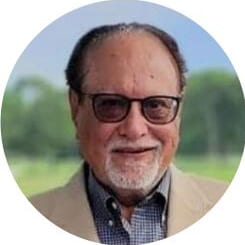
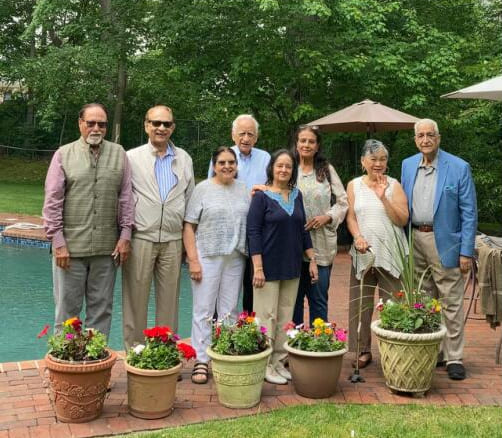
Classmates and spouses from left to right: Amarjit Singh, Prem Gupta, Arfa Khan, Faroque Khan, Neelum Gupta, Jas Singh, Sally Gupta, and Mohinder Gupta.
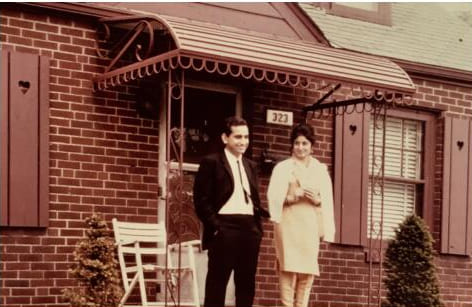
Arfa and Faroque Khan at their first home in Barberton Ohio May 1966.
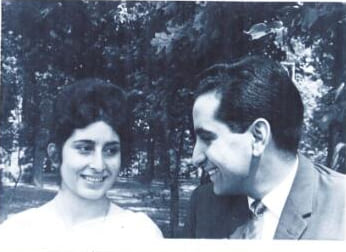
Arfa and Faroque Khan at their first home in Barberton Ohio May 1966.
Arfa and I started our professional journey in USA in Barberton Citizens Hospital in Ohio 1966. The Barberton experience provided us a low key small town experience in USA. Also, on April 6 1967, we were blessed with the arrival of our son Arif Omar Khan. This was obviously a very new and challenging experience for us as new parents in a new country in a new environment with minimal to non existent family support. Few months later in July 1967, we moved to Jamaica, New York to continue our training at Queens General Hospital (QGH) which was a whole new experience. Our residency started at Queens General Hospital in Jamaica Queens in July 1967. We were lucky and able to rent an apartment within walking distance of the hospital. The training in medicine was demanding, exhausting, and enriching with a large patient base and very demanding schedule. I was on night call every third night throughout the year in addition I had to make some quick adjustments in my approach to the nursing staff. ex I had graduated from medical school in Kashmir which followed the British system in which the nurse is referred to as a sister. So as a new resident on 3N in QGH I called the nurse “sister kindly come and help me with this patient new patient” she came over put her arms around my neck and stated in no uncertain terms— honey you and I are going to have a relationship but not that of a sister and brother”. There were many other incidents where we had to make adjustments in our understanding and approach to patients another example I had never been exposed to a patient with sickle cell disease which didn't exist in Kashmir and at QGH there were many black patients who experience this very devastating illness called sickle cell anemia. The weekly bedside rounds with the chairman of medicine doctor Edward Meilman was a treat, he was a great clinician, a great teacher and paid attention to all the medical and social needs of the patients and I learned a lot from him. The three years passed by quickly I 24 completed my residency and then took a year of fellowship in lung diseases at Albert Einstein College of Medicine in the Bronx and program director was the well known physiologist Dr. Henry Williams. This was a new experience— daily drive from Queens to Bronx over the Throgs Neck Bridge—toll of 25 cents. I enjoyed my year at AECOM, learned quite a bit of Physiology however I missed the clinical ambiance of QGH and the personal touch offered by Nathan Seriff, so I returned and continued with Nathan Seriff as his senior fellow and later on associate, he appointed me as an attending in 1972 and I continued to work with him, helped establish the first RICU and a busy thriving pulmonary service and training program. We were blessed do have some great clinicians on our faculty to name a few Dr. Frank Lamberta, Dr. Bernie Epstein and they had great clinical sense and had grown up in the 40s and 50s and we learned quite a bit of clinical pulmonary medicine from them which they happily transmitted to the junior staff. We became part of the newly established medical school in Stony Brook and received students from Stony Brook for rotations. I was happy and enjoying my work. In 1977 my boss Dr Nathan Seriff abruptly left the department after he had some differences with the administration and we were kind of left high and dry. I was surprised when the CEO invited me to his office and said: “Look we have an opening if you want to take on this new challenge you're welcome” and it was my first opportunity to take on a management role. After some thought and discussion, I decided to give it a try and was appointed chief of division of pulmonary medicine at QGH, we had minimal staff, one pulmonary fellow—Dr Shashi Patel, bulk of the staff had also left. We resurrected the program and developed a very busy program in pulmonary diseases at Queens General Hospital —the attached testimonials from Drs Shashi Patel, Sunil Mehra, Parvez Mir and Khalid Rehman, Saleem Bajwa provide additional insight.
As the program was on an ‘auto pilot” it was getting rather monotonous, so I decided to write a letter of solicitation to the 200 plus sponsoring drug companies which were listed in the PDR and I described our program, what we had to offer and were willing to do some clinical research if they had a product suitable for our department. From the 200 letters we sent there were two responses and one of them was from doctor George Arcieri who represented Myles pharmaceuticals, they had just launched clinical investigations of a new product called the fluoroquinolone which had a novel method of working as an antibacterial agent. Dr Arcieri visited with me and basically said OK we'll give you a trial of 20 patients and let's see what you can do with it and they thought it would take us a few months. Our research team got that project done within a few weeks and the protocols from other similar projects started rolling into our program. We gained a reputation as a center which delivers reliable clinical research results. Our patient enrollment kept expanding and eventually after we were done with all the investigations with Ciprofloxacin, the new drug, we had studied 500 patients the largest clinical study on ciprofloxacin for respiratory infections in North America. This brought in a lot of attention and I was invited to give talks all over the United States and even overseas, describing the results and what we had observed. We had noted some interesting interactions which had not been previously reported and our experience was well received. So I consider the period of 1977 to 1987 as a very productive period. In my professional life we ran a very high quality pulmonary fellowship program, we were reporting new innovative practices from our Respiratory ICU, we set up a special “Asthma bed” for high risk Asthma patients, established clinics like Sarcoid clinic and then we made this major contribution in the clinical research with Ciprofloxacin.
At one of the executive committee meetings of the department of medicine of Stony Brook of which I was a member representing Queens General Hospital doctor Harry Fritz the chairman of medicine at Stony Brook announced that there was a vacancy at Nassau County Medical Center for the chairman of medicine and he basically invited us to submit our applications if we were 25 interested. I mailed my bio directly to doctor Fritts and pretty soon I received an invitation to meet with the search committee of the Nassau County Medical Center Department of Medicine chair search, it was an interesting experience and a frank discussion with the search committee members about my background experience. After several rounds of meetings with the search committee, I was pleasantly surprised when I was offered the position of chair of medicine at Nassau County Medical Center. In January 1987 I joined NCMC which was the beginning of a new phase of my professional career. I of course transferred my clinical research program as well along with the staff and the fellows who had been helping me with the research.
So what's the lesson from this brief introduction about my first 20 years of professional experience. 1. When my boss and mentor Dr. Nathan Seriff resigned, I was invited to replace him by the CEO and I accepted which in retrospect was an excellent decision, we built a well respected teaching program 2. I sent a letter out to the sponsoring agencies across the country asking them if they were had an interest in doing research with us and was pleasantly surprised that we were selected and later on became the leading Research Center for clinical research for Ciprofloxacin in North America and so the message is basically there are opportunities out there we just need to look for them tap into them and then deliver the goods.
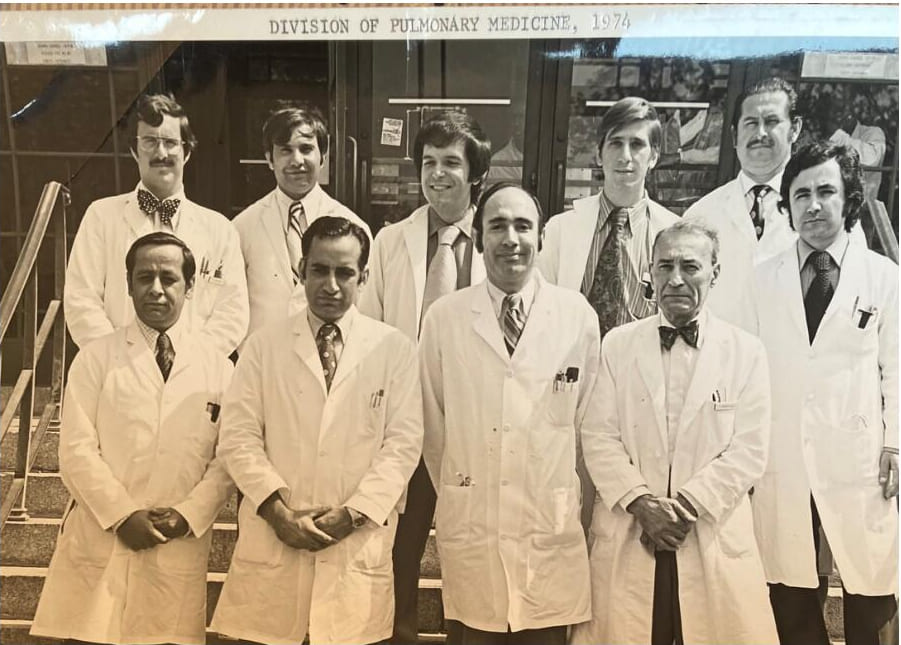
1974 Annual Pulmonary Group Picture—Standing from first row left to right: Drs Rajinder Chitkara, Faroque Khan, Nathan Seriff, Frank Lamberta.
Dr. Faroque Khan is a prime example of the American immigrant story: achieving excellence in personal and professional life and then giving back to the community in more ways than one.
Dr. Khan can take credit for training and nurturing a whole generation of physicians. I, for one, am privileged to be one of the many to have benefited under his tutelage. Dr. Khan's keen and personal interest has benefited many young physicians in their personal and professional lives. Along the way, Dr. Khan excelled in academics and took many leadership positions in academia and with the American College of physicians. Dr. Khan spent a few years in Riyadh, Saudi Arabia where he helped plan and bring to fruition The King Fahd Medical Center.
Dr. Khan's concern for the community at large led to his lifelong involvement with the Islamic Center of Long Island. Dr. Khan's broad vision and belief in diversity led him to nurture the interfaith Institute with respect and tolerance for all faiths and religions.
Dr. Khan is a pillar of the Kashmiri American community as is evident from the love he has for Kashmir and his Kashmiri brethren. I wish him God speed in all his future endeavors.
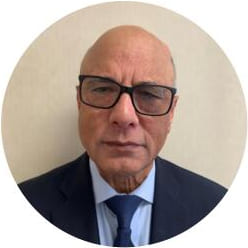
After completing my Residency program in Internal Medicine in 1972, I was blessed with a great opportunity of undertaking my Fellowship training in Pulmonary Medicine at Queens General Medical Center in Jamaica New York in the years 1972-1973. under the mentorship of Dr. Faroque A. Khan. What a superb opportunity to not only advancing in medical field, but also learning discipline, hard work, state of the art knowledge and clinical skills, providing best patient care with the spirit of staying one notch above the others. Dr. Faroque Khan was an excellent clinician, a top notch professional, and the best teacher. Medicine was mainly clinical in those days. We had to use clinical skills, right kind of percussion and auscultation those days. That is why the great professors would spend plenty of time with the residents and fellows by the patient’s bedside.
Making rounds with Dr. Faroque Khan was fun and a great. Dr. Faroque Khan worked for six years (2005-2011) as a Senior Consultant and also as an advisor to the CEO at the King Fahad Medical City (KFMC) in Riyadh, Saudi Arabia. He made an exceptional contribution within this relatively limited time including the establishment of KFMC's Research Center, the establishment of American College of Physicians (ACP) chapter in Saudi Arabia, hosting and sponsoring nursing students from BHNC in Kashmir (almost a hundred of them benefitted from this unique exposure), inviting and hosting Dr. Elias Zerhouni, the Director of NIH, and many other leading academicians from the USA to KFMC. His contributions extended beyond KFMC at both national and regional level. He conducted several national/regional meetings in partnership with the ACP. He provided courtesy input for several national and regional medical schools in a spectrum of fields including but not limited to, suggestions for curriculum, medical and clinical education and research. His engagement with some medical school continued for many years after he left and moved back to the USA. He was strong committed partner with the medical schools at King Abdul- Aziz University, Alfaisal University, and Almajmaa University and obviously, the medical school at KFMC. He initiated the Riyadh monthly academic evening in partnership with ACP. One other important notable contribution is the Journalism Workshop that he conducted with ACP and Chief Editor for Annals of Internal Medicine.
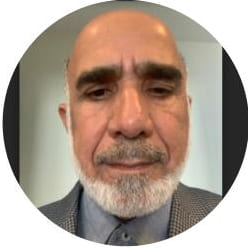
How can you describe a friend and friendship lasting more than 50 years? According to Webster's dictionary, it is a close relationship, a supporter, sympathetic, peaceful, and congenial, and all these describe Faroque. In his quiet demeanor, he has been supportive of our family with all the highs and lows that we have encountered.
Our friendship began at Queens General Hospital where Faroque and my husband Rafael were resident physicians in the early ‘70s. Later, Faroque was my husband's chief in pulmonary medicine at Triboro Hospital where I also was an RN in respiratory ICU.
We established a lasting friendship despite the fact that Faroque and Rafael's personalities were polar opposites. They say opposites attract. Our families spent many ski and tennis vacations together at green mansions. Ski vacations were always an adventure: having nine of us together in a two- bedroom condo (thank God for bunk beds). Faroque, Arfa, and Rafael were excellent skiers. As for me, not so much. Needless to say, I survived and enjoyed coming off the mountain for an enjoyable lunch. Whiteface Mountain gave me a new appreciation for life.
In 1976, we moved to our new home in Syosset. With the helping hand of Faroque and Arfa, we were able to close on our home. Christmas Eve became a tradition at my house. We created our own “God Squad” attending where our families consisted of Catholics, Muslims, Greek Orthodox, and Jews. All were brought together in friendship and love. Friday night's tennis doubles was also a fun night for the four of us. My tennis was better than my skiing! Faroque and I partnered against Arfa and Rafael to keep peace among the couples. Throughout my husband's 11-year battle with frontotemporal dementia, I could always count on Faroque and Arfa for medical advice, support, and a sympathetic ear. Our families have been through so much together but one thing I know for sure is that when you have a friend like Faroque, you can survive and flourish. Faroque, you have accomplished so much in your life with honor and integrity, and humility. I'm honored to call you my friend. On behalf of all Lievano family congratulations on all you have done and will continue to do.
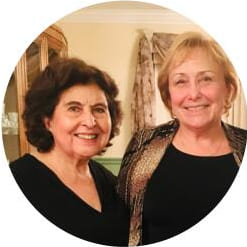
Today, we gather to honor a truly exceptional physician and mentor, Dr. Faroque Khan, who has had a profound impact on the lives and careers of many trainees over the years. I am honored to recall my own experiences with him, and to share some insights into the kind of person and physician he is.
Dr. Faroque Khan was my program director in pulmonary medicine at Queens Hospital Center, affiliated with LIJ/Albert Einstein College of Medicine, from 1982-1984. He trained at least four fellows every year for many years. Later, as Chairman of Medicine at Nassau University Medical Center, he continued to be a guiding force for many physicians.
But, what truly sets him apart is his gift for teaching and mentorship. He knows the art of medicine, and he has a unique ability to train his trainees to become better clinicians and, above all, better human beings. His guidance and example have molded many of us into better physicians, with a strong focus on compassion and empathy.
During my own fellowship, he got me involved with the Nargis Dutt Foundation, a philanthropic organization that provided medical equipment and aid. He emphasized the importance of giving back to the community and helping those in need, and this has stayed with me ever since. With his example of service, I was inspired to serve as President of IALI (India Association of Long Island), later AAPI (Association of American Physicians from India) Queens-Long Island chapter, and now of the Indo-American Lions Club.
He also invited us to his home during fellowship training and treated us as siblings, which was an unexpected and heartwarming experience. This introduced us to his loving wife and family, and how he genuinely cared about his trainees beyond their professional development. He continued to stay in touch with us guiding our future endeavors. I am now proud to call him my friend and peer.
One of the most impressive things about him was his ability to bring in the best in the pulmonology field as visiting professors during fellowship. These leaders in pulmonary medicine from all over the country would come to train and teach us, providing us with diverse perspectives and expertise.
He also had a strong focus on research and current treatments, and encouraged us to pursue these areas with dedication and enthusiasm. With his guidance and mentorship, I wrote my first few research papers and publications, which was a significant step towards my career as an academic physician. This inspired me to continue to publish throughout my career.
But beyond all of these professional achievements, what really stood out to me was his kindness, thoughtfulness, and practical advice. He was always willing to listen and help, and his words of wisdom have stayed with me long after my fellowship.
So many of us that trained with him are successful throughout the tristate area. Because of Dr. Khan’s exceptional training and mentorship, many of his trainees have gone on to become leaders in the field.
Dr. Khan has made an indelible mark on the lives and careers of many trainees, myself included. His gift for teaching, his commitment to philanthropy and community service, his focus on research and publication, and his compassion and empathy have inspired us all to be better physicians and better human beings.
Today, we honor him not just for his professional achievements, but for the impact he has had on the lives of so many trainees. It is a true privilege to know him and to have learned from him, and we are all better off for having him in our lives.
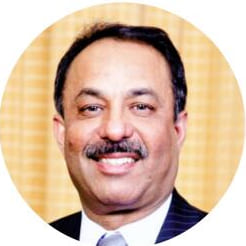
As I reflect on my journey in medicine, I cannot help but think of the invaluable role that you have played in my life. You have been not just a teacher, mentor but also a guide, a friend, and a source of inspiration.
It was you who gave me a chance with my career in medicine and I am so indebted for that.
Throughout my clinical rotations as your fellow in Pulmonary medicine, I watched in awe as you interacted with patients. You had a way of putting them at ease, of listening to their concerns, and of making them feel seen and heard. You demonstrated the art of medicine, and I knew that I wanted to emulate your approach to patient care. Your passion for medicine was infectious , making me who and what I am.
But, you did more than just teach us medicine: you taught us how to be compassionate, empathetic, and kind physicians. You modeled professionalism and ethics, and you instilled in us the importance of integrity and trust.
I appreciated your guidance not just professionally but at all difficult times we went through with our personal life, you were always there for us.
I am grateful for all that you have taught me and so many others. You have been a mentor in the truest sense of the word, and I will always be grateful for your guidance and support. I hope that one day I can pay it forward and inspire future generations of physicians, just as you have inspired me.
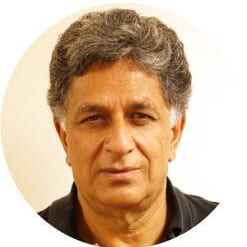
There are very few individuals, who make all the difference in your life. Faroque bhai is one such individuals. From my first encounter with him at Queens Hospital Centre, I was impressed with his warmth, caring, and compassion. He treated everyone with respect, dignity, and made them comfortable.
I was thinking of being an oncologist, but after spending two months with him in training, I pursued pulmonary and critical care. In fact, I was his first chief fellow and subsequently a junior colleague, when he became the chairman.
Though I was interested in academics, family obligations turned me towards private practice. He introduced me to parkway hospital where he was a consultant in very high esteem. As soon as I familiarized myself at the hospital, he handed me his practice, including all the outstanding receivables! I went on to become Director of ICU to Chief of Medicine and Medical Director.
All of this happened because a great man took me under his wings. For a kid born in a small village in Kenya where there was no school, this was a dream come true. Now multiply this by hundreds, that many doctors he trained and propelled them to achieve their dreams.
A man is as good as a life partner he has, and in Arfa, did he found not only his equal but much more. Faroque bhai through his multiculturalism and multi faith initiatives has shown us that not only we can coexist but can become good people.
Faroque bhai, in the greatest vedic tradition, I bow down to my guru, my mentor and my brother. Sameer and Usha join me in saluting you for a lifetime of achievements that cannot be equaled by any one of us or may be not even collectively.
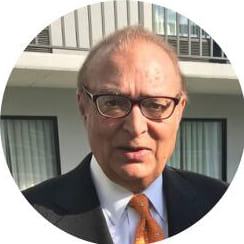
I am one of the, if not the, oldest student of Dr. Faroque Khan. I met him in July 1970. I had been accepted to the medical residency program at the Queens General Hospital in Jamaica, Queens, NY. Although there were quite a few medical residents from the Indo-Pak subcontinent, there was only one attending physician in the program, and that was Dr. Faroque Khan.
For a newly arrived young physician from Pakistan, seeing a familiar face in the leadership position, was comforting. Soon, I discovered that not only he was an attending physician in the Department of Medicine, but he was also the head of the Intensive Care Unit.
Over time, I became a member of IMANA, The Islamic Medical Association of North America, of which, Dr. Faroque Khan was one of the leaders. He helped guide me and many others as we tackled with, developed and published the core principals of Islamic Medical Ethics to serve the non-Muslim medical fraternity of the United States of America.
When I applied for and attained Fellowship in the American College of Physicians, Dr. Khan was there in the top leadership of the American College of Physicians.
Our paths crossed again in Riyadh, Saudi Arabia. I had taken up a job as a hematologist-oncologist at the King Faisal Specialist Hospital and Research Center. Few years later Dr. Khan arrived at King Fahad Medical Center.
Over the last 50 plus years, Dr. Khan and I, have had close bonds whether these be professional, in socio-political activities, at the Islamic Center in Westbury, Interfaith circles and other humanitarian venues.
He has served his community and profession with passion and dedication. I salute him for his remarkable achievements and urge all of us to emulate and follow his footsteps. He has been and will remain a source of inspiration to all of us.
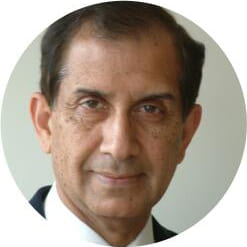
 - Eric Hamza Byas-31.jpg)
Nassau County Medical Center (NCMC) Chairman Department of Medicine: Jan 1987 to March 1999.
I joined NCMC as chair of the Department of Medicine on January 26, 1987. The medical department included 190 plus beds, on multiple floors of the Nassau County tower while the critical care units of medical ICU's, coronary care unit, were on the second floor. In addition, there were three specialized services for step down telemetry, ventilator ward, and the New York State designated HIV units located on the 12th, 7th, and 11th floors. The chairs spacious office was on the 12th floor. The workload was quite heavy, with in patient bed occupancy of over 95% and many times exceeding 100%. There was a fairly busy clinical outpatient of over 24,000 patients a year.
The Department of Medicine training program was accredited for approved three-year training in internal medicine and additional fellowship programs were offered in cardiology, pulmonary, gastroenterology, allergy immunology, hematology oncology, infectious disease, nephrology, rheumatology, and endocrinology.
In 1993, for example, we graduated 20 internists from the three-year program and 15 specialists from the various fellowship programs. As program director, I oversaw the training of close to 99 house officers in the Department of Medicine. Some of the yardsticks which are used in measuring academic excellence of teaching programs include American board of internal medicine pass rate.
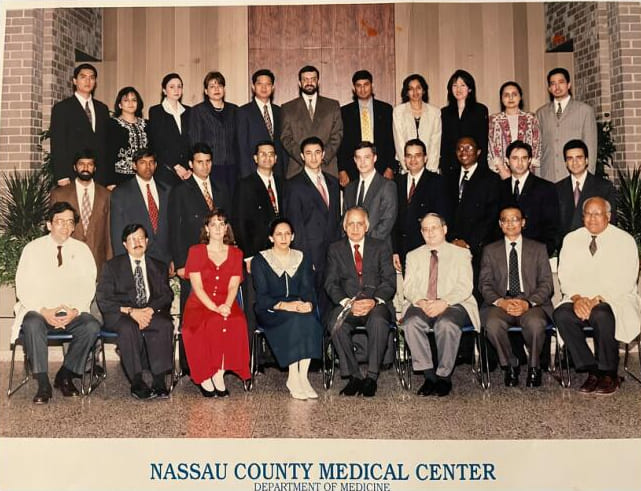
Arfa and Faroque Khan at their first home in Barberton Ohio May 1966.
Carvounis(Nephrology) Peter Rumore(Rheumatology), Laurie Ward (General Medicine), Tanveer Mir (Geriatrics) Faroque Khan(Chair and Program Director), Steve Feffer (Hematology), Linga Raju(Pulmonary) Ernesto Jonas(Cardiology) L- R—Standing 1st row: Syed Raffi, Arunachalam Einstein, Riyaz Bashir, Suhail Shah, Sarfraz Durrani, Dean Babich, Sandeep Mehrishi, Akinola Ayodeji, Javed Fazili, Ghulam Saydain Standing 2nd row L- R Albert Empedrad, Samina Ahsan, Rozina Shah, Zeenat Hossain, Eugenio Capitle, Mohammad Al- Shroof, Mohammed Ashraf, Prathima Reddy, Julie Antique, Naila Manzoor, Norman Panlilio
This was an area which needed close attention. For example, in 1985, 6/12 graduates passed their internal medicine boards, in 1986 only 4/12 passed the boards, and in 1987 only 5/11 graduates passed the boards. Clearly, this area of low under 50% ABIM board pass rate, needed close attention. It was indeed gratifying to see the ABIM board pass rate jump to over 90% after 1990: 1990, 9/13 graduates, in 1991, 13/17 passed, in 1992, 11/ 13 passed, and in 1993, 18/20 passed. This trend continued till 1999. The over eighty percent ABIM pass rate was in sharp contrast to the pass rate of less than 50% earlier in the decade. During this time, the national average of ABIM pass rate was 54 to 56%.
The other area that the Department of Medicine house staff excelled was in the research programs. Every year at the local American College of Physicians research meeting NCMC medical graduates excelled and regularly either the top prize or most of the research prizes. NCMC house staff also duplicated this effort at the National American College of Physicians meeting: in April 1993, six of NCMC residents presented their research papers at the national ACP meeting. This comprised almost 50% of all the papers presented from New York State programs. NCMC house staff were also invited by the National Institute of Health to present in 1992 and 1993. This was subsequently recognized in by NIH in the prestigious medical journal, New England Journal of Medicine, January 6th 1994.
Additionally, our department was part of the NORASEPT 11 trial which provided an opportunity to be at the cutting edge of research along with approximately 30 other centers in the United States. Plus, this research generated significant research dollars for the department and the hospital. Based on this recognition, we were invited by the American College of Physicians to author a book on the training of medical graduates particularly from international medical schools and it was used as a model by many programs across the country.
The 12 years from 1987-1999 as the chair of medicine at Nassau County Medical Center where extremely gratifying for me professionally and it was a great pleasure and an honor to be involved in the training of the highly skilled and very accomplished house officers from around the globe, many of whom went on to be very creative and provide great patient care as well as accomplished many "firsts” in their research endeavors.
In preparation for my role as a chairman of medicine, in 1987, I decided to attend a very intensive management course, at my own cost, at Harvard where they would present problems in large departments and encourage the attendees to identify the root cause and implement appropriate impactful changes. This was a very intensive week long course and I learned quite a bit about management of a large diverse department. Sadly, I was not able to implement or apply many of the lessons I learned because of the barriers and the obstacles that existed at Nassau County Medical Center. Most of the innovative ideas which we presented to administration were not implemented or accepted. The structural and "political’"barriers that existed made it difficult, if not impossible to fulfill the great potential of Nassau County Medical Center.
I might also add that there was major turnover of senior management at NCMC. In the 12 years that I was chair of medicine, I had to deal with seven CEO's and sadly few of them were up to the task of overseeing the complex operations of CEO. The only exception was CEO Dr. Tracy Strevey.
The accompanying testimonials from Ann Borg, the very devoted and efficient staff person I was fortunate to work with during the my 12 years as chair of medicine at NCMC and additional comments, testimonials from the trainees and consultants will provide the reader additional insight into the operations and accomplishments of the department of medicine during the period from 1987-1999.
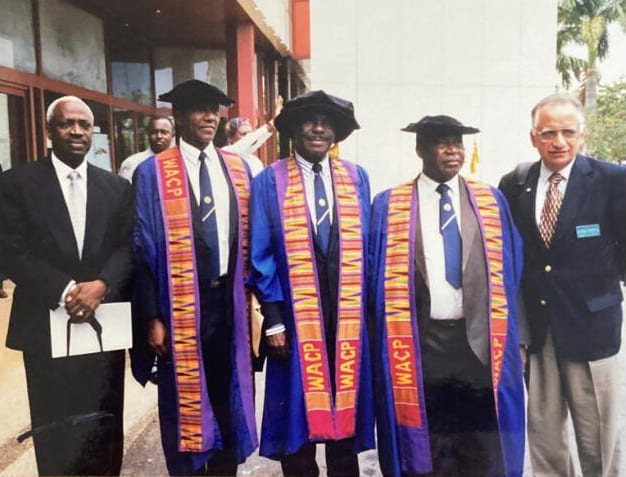
WACP annual meeting in Lagos, Nigeria in 2000; Local delegates with Dr. O. Ojutiku on left and Dr. Faroque Khan on right in Nigeria as a Regent of ACP.
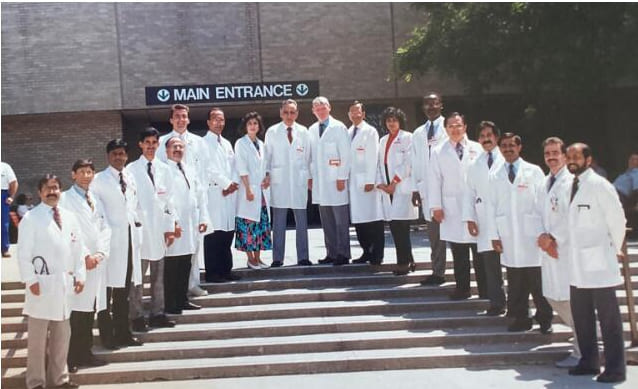
NUMC main group entrance: Dr. Faroque Khan with staff and third year medical residents.
As I reflect on my years at NCMC from 1987-1999, two anecdotes summarize the ongoing issues facing NCMC.
1. The department chairs met on Mondays to review the departmental, interdepartmental, and institutional issues. The chair of Neurology Dr. Richard Carruthers at one of the meetings said and I paraphrase: "NCMC problems would be lessened or even resolved if the Nassau county treated NCMC as a hospital ward instead of a political ward”
2. Every morning, the DOM conducts a morning report in which all overnight admissions are reviewed by an assigned consultant. At one such meeting, I was presented a case of an elderly female with multiple medical problems, transferred from another hospital. This was during the peak of the AIDS epidemic and the house officer stated that this patient with multiple medical problems was transferred from a neighboring hospital because of Acute Insurance Deficiency Syndrome, AIDS-2.
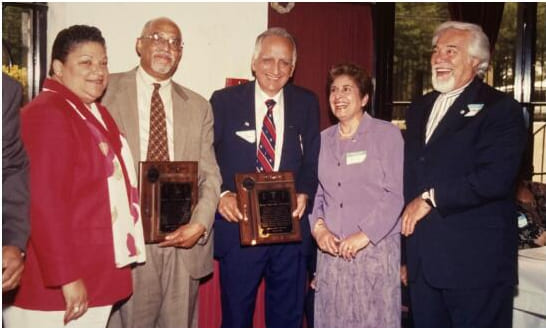
Central Westbury Award Event: Westbury School (WS) Superintendent Robert Pinckney and Faroque Khan recognized for initiating the internship program for Westbury students at Nassau County Medical Center. Accompanying the awardees are the spouses and late brother Ghazi Khankan.
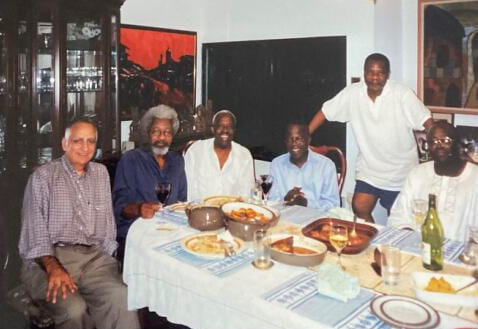
From left to right: Faroque Khan, Nobel Laureate Wople Soyinka, Dr. Ojutiku Batinube, and B. Fashola.
Dr. Khan’s medical contributions are well documented. His leadership and involvement with organizations from The American College of Physicians to The Islamic Medical Association of North American to SUNY at Stony Brook, to mention a few, are evidence of his achievements in the field of medicine. His commitment to the training of medical students and residents cannot be overlooked. Dr. Khan’s dedication to universal tolerance and understanding between diverse communities also deserves recognition.
His struggle for cultural and religious understanding and good will has resulted in the Interfaith Institute of Long Island, a long- established interaction with the Jewish and Muslim communities, participation in the Catholic TV program Our Muslim Neighbors, and an ongoing association in The Multi- Faith Forum of Long Island. In 2014, the Long Island Council of Churches awarded Dr. Khan The Community Service Award, and in 2013, The Long Island Press elected him one of the 50 most influential people on Long Island.
Dr. Khan’s many medical and societal accomplishments deserve to be celebrated. He is industrious in his medical pursuits, persevering in his mission for harmony between diversified worlds, and an intelligent, warm, and caring individual. I have known Dr. Faroque Khan since 1987 when he was appointed Chairman of Medicine at Nassau County Medical Center (now known as Nassau University Medical Center). I was very fortunate to have worked with him, happy to have him as a friend, and delighted and honored to offer recognition of his life’s achievements.
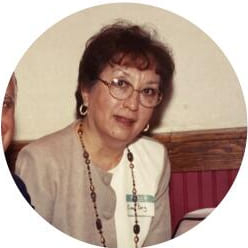
“ Our chief want in life is somebody, who can make us do what we can” – Ralph Waldo Emerson.
Dr. Khan is a mentor, who has inspired multiple generations of physicians and leaders around the globe. I am extremely blessed to have had the honor of being mentored by this legendary academic pulmonologist. During the thirty years of my medical career, I have not encountered a mentor who has influenced his mentees more profoundly than Dr. Khan. His visionary and lifelong mentoring has played a critical role in my career development not only in the field of medicine but also in running an educational charitable organization (Kashmir Education Initiative). The legacy of his values and the spirit of his mentorship will continue to inspire and shape the careers and lives of physicians, through the contributions of his mentees. I am an interventional cardiologist by training, however, my research interest has been the treatment of acute and chronic pulmonary embolism and I believe it was Dr. Khan’s passion for the treatment of lung diseases that attracted me to this research field. With sincere gratitude.
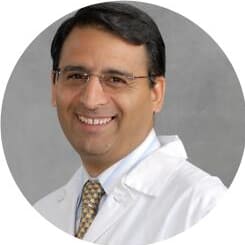
It gives me great pleasure to participate in the celebration of Dr. Faroque Khan’s accomplishments and contributions to the medical community. I was appointed as the Chief of the division of Nephrology at Nassau County Medical Center in 1989 by Dr. Khan who was then the Chairman of the Department of Medicine. I had the opportunity to work in close contact to Faroque for more than a decade. I will like to emphasize his qualities as an exceptional leader, a most effective educator and a very dear colleague and human being. As a chairman of Medicine, he had the difficult task to be the leader of more than fifty full time faculty members and about 100 residents in the department of Medicine of an academic institution. He managed to enhance the academic achievements of most of the faculty and was a significant supporter to enhance the academic title of the vast majority. He spent time to deal with the specific needs of each division. In my case, I found no existing members in my division. Through his guidance I managed to get five faculty that eventually reached within a decade either the professor (3) or associate professor (2) level. He was instrumental in helping me to become a master of ACP while most of the faculty became fellows. The success rate of the residents in the boards of Internal Medicine was close to 100% , exceeding the rates of most institutions in our state. I like to conclude by indicating that he succeed all the above while keeping a very friendly relationship with faculty and residents alike. As an example to his exceptional humane attitude, I like to present the numerous parties he conducted for faculty and residents in his own home and even the tennis tournaments that were organized with the participation of faculty and residents. In short, I consider myself very lucky to get to know and work in this environment under the leadership of Dr. Khan.
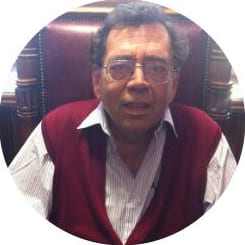
I have had the distinct honor and privilege of knowing Dr. Faroque Khan, professionally as a colleague and personally as a friend, for more than 25 years. I first met him on a Friday afternoon in 1987 at the Islamic Center of Long Island (ICLI), when I was a freshman medical student at New York Institute of Technology’s College of Osteopathic Medicine (NYITCOM) and he was already a distinguished internist and pulmonologist, a full Professor of Medicine at Stony Brook University School of Medicine, and Chair of the Department of Medicine at Nassau County Medical Center. He gave me his business card, encouraged me, as he has countless others, to stay involved with ICLI, join the Islamic Medical Association of North America (IMANA), and be the best physician I can be.
Over the years, Dr. Khan has served as a guiding light and beacon, always available for advice and always welcoming. A wonderful humanitarian who is known for his work in interfaith relations, he is also a legendary figure at the American College of Physicians, where he became the first international medical graduate to become elected to its prestigious Board of Regents. When I became an Assistant Dean and Chair of the Department of Medicine at NYITCOM, and later served as Health Commissioner of Suffolk County, I looked to Dr. Khan on Long Island as a role model of a compassionate, thoughtful leader who cares not only about the health and well-being of his patients and the community at large, but also those who choose to practice medicine or any of the health care professions. His positive impact on society has been felt on Long Island, across our nation and around the world. For that, we are all grateful.
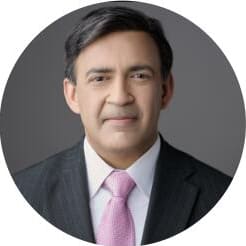
I had the privilege of beginning my career with Professor Faroque A. Khan in 1994. As a student “fresh off the boat” with no direction, I entered the doors of NCMC and failed to realize that my world had changed forever. As we all know, a man of few words, Professor Khan instilled high standards, only reacting to hard work, excellence, and passion. This for me as a research assistant set the stage not just for my professional career but also my personal growth.
The hallmark of working with this scholar left a mark, it seemed that focus, dedication, and love for the field were the only traits of success. By engaging with him, I learned that cutting-edge research required not only caring for the patient and data collection but also attention to detail. This was a tedious process with no guarantee of success and was indeed a lesson. This groomed me to go through a ten-year path of research, scholarship, and surgical training. If academic excellence and clinical acumen were his strengths as a scholar, Dr. Khan also had a generosity of spirit that believed in unconditional giving. He wore his erudition with a commitment to nurturing a future generation of physician’s par excellence— both in his personal capacity and during his tenure as the physician-in-chief. Please look around how many were mentored, and you will be surprised.
His depth and the luminosity of his insight for guiding a future can be traced to his giving, a quality that a lot of us may have missed. The two other feathers in his cap not to be ignored are his dedication to solidarity and equality in religion, as well as his work to secure the future of his people in and out of Kashmir. Not many of us would focus on a character as quiet and composed as his, but there's nothing small or insignificant about his story. Sometimes, it's the quietest marathon runners that turn out to have the most to offer.
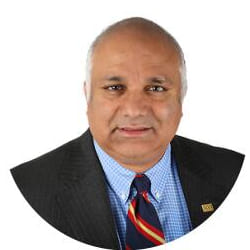
I first met Dr. Faroque Khan in 1974 at the Triboro Hospital in Queens, New York, when I interviewed there for a Pulmonary Fellows position following a prior interview with the department Chair, Dr. Nathan Seriff. The interview went well and I was offered a position. Unfortunately, I could not accept the offer. But fast forward to 1991, while resettling in New York, I found myself again in front of Dr. Khan, who was now Chair of Medicine at the Nassau University Medical Hospital’s Department of Medicine. This time around, I accepted his offer! In the course of closer interaction with him and colleagues in the hospital setting, I noted that he was very much beloved by the Residents and Staff as he brought the Internal Medicine Board Certification pass rate to lofty heights within a few years of his joining the Medical Center.
Simultaneously, I noted his activities at the American College of Physicians where he was a Master as well as a Regent of the college. He encouraged my interest in the activities of the College where I became a Fellow while sharing his interest in the education of foreign trained medical doctors. He influenced the College to establish a mini travel fellowship for middle level teaching manpower for foreign medical graduates of which the first recipient was a Nigerian physician who is now a Professor of Hematology of many years standing.
He has been a strong advocate in the globalization of the College. This initiative saw him bring the College to Nigeria and forge a liaison with the West African College of Physicians. In November of the year 2000, we were in Abuja, Nigeria as special guests of the College. The meeting remains memorable in the annals of the medical community in Nigeria.
Outside of Medicine, Dr. Khan’s activities in the Interfaith Community are well recognized nationally and I suspect internationally too. In the course of attending some of the activities organized under his guidance, I had been privileged to meet some of the key leaders in the community. These are the people he had worked with to foster harmony in the community in matters of religion. Dr. Khan is a contributing member of the Brookville Multifaith Campus where Christianity, Islam, and the Jewish faiths cohabit in the same space which just happens to be the Brookville Church on Long Island. What other testament remains to be said of such an accommodating and tolerant heart!
But above all, Dr. Khan, anywhere your name comes up, it always will be that of a good man who did so much for the medical profession and enhanced religious peaceability amongst all creeds and tongues in your community. You are the original “community organizer.” I wish you the best as you ontinue living your life as you know best and that is in the service of humanity.
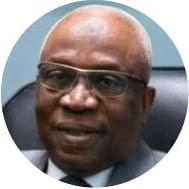
It is my pleasure, a privilege, and an honor to write these few words about Dr. Khan, whom I have known for more than four decades. He has been a mentor, a fellow pulmonary/critical care physician and a true friend in times, good and bad. Everyone knows about his work as the founder and Chairman of the Interfaith Institute of Long Island. Generations of students, residents, and pulmonary fellows know what a superb clinician he is. He has practiced the science of medicine like a true academician and the art of medicine with profound wisdom and great empathy towards his patients. I will not delve into these aspects but would like to write about Dr. Khan, the man behind that excellent clinician, internationally known in his chosen field of medicine and a Master of American College of Physicians. What better way to talk about a man than to narrate some of the stories about him.
I have known Dr. Khan for more than 40 years, from the time when I was perhaps at the zenith of my career as chief of Pulmonary Department, an associate Professor, and a much sought-after physician in Kuwait. However, the turning point and without doubt the lowest point in my life came on August 2nd, 1990, when we got stranded in New York after the invasion of Kuwait. Next morning when I called Dr. Khan, in his typical calm way he said, “why don’t you stop by the hospital tomorrow, and we will see what can be done.” He offered me a research position, which got me started on a career in USA. A friend in need is a friend indeed! And, as he is fond of saying, ‘rest is history.’ By the grace of God, support of my family and Dr. Khan’s good wishes, I never looked back. But what I have never forgotten are the small but thoughtful gestures shown by him which truly reflect his thoughtful, caring, and wonderful nature. While in Kuwait, I had two offices, one in the hospital and one in the Faculty of Medicine. At Nassau University Center, I had no place to sit; he allowed me to use a portion of his office whenever I had to do some paperwork. As I felt a little awkward in ‘street clothes’, he himself put a white coat on my shoulder. When I bought my first car in USA, a small Buick Skylark, he made it a point to stop by and admire it, while his own shiny Mercedes was standing nearby. The intent of those words of admiration was not lost on me. A man of substance and great character treats others in the same manner, whether they are rich or poor, at the highest or lowest points of their life and Dr. Khan is a perfect example of such a man. He has faced some of the difficulties in his professional life and some health issues with so much courage, sense of humor and grace, that he is a source of inspiration to me.
It is a pleasure to talk to him on a regular basis. Most recently, I have sought his advice and support for a book that I have finished writing recently. He was kind enough to write a Foreword for the book. The book describes some of the most fascinating cases of my career and Dr. Khan was involved in treating some of these patients. I wish him a very long, healthy, and productive life.
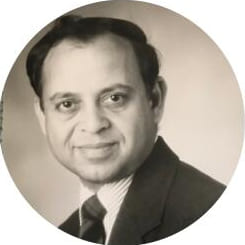
I had the privilege of training under Dr. Faroque Khan in the early 1990s as a resident and chief resident at the Department of Medicine at Nassau University Medical Center (NUMC) in Long Island where he was Chairman of Medicine and Program Director. Today, I am Professor of Medicine at Wayne State University and Chief of Pulmonary and Critical Care Medicine at Detroit Medical Center and Karmanos Cancer Center in Detroit, MI. I would like to share my experience at NUMC under the mentorship and guidance of Dr. Khan.
I had completed my medical education at the University of Jordan and my first trip outside of Jordan was to Long Island, NY. One of Dr. Khan’s unique qualities is his resourcefulness and willingness to extend his support whether it is personal or professional beyond the call of duty. I and many of my colleagues experienced this first hand, as he helped us with housing, acclimatization to a new environment, and connecting us with others. Another of Dr. Khan’s unique traits, and one that served as a model for everyone who interacted with him, is his ability to approach all issues he dealt with—inside and outside of the program—in an organized and systematic way. This is combined with his ability to mobilize and motivate everyone around him to reach their potential. These qualities shone in the way he dealt with others, whether to solve a problem, address a troubled resident, or advance the career of trainees and junior faculty.
Dr. Khan had an amazing intuition that allowed him to spot and nurture talent. He was able to recruit very high caliber trainees to his program. Combined with the outstanding training we had under his directorship, many of us were accepted into highly competitive fellowships and are currently practicing medicine around the country and the world with distinction and remarkable achievement. I remember him encouraging me to publish an interesting case or share in a publication our experience in improving the autopsy rate, or write an essay about Ibn Nafis, one of the pioneers in discovering the pulmonary circulation. His mentorship and guidance were instrumental in advancing my career in academic medicine and in publishing my clinical observations over the years. This was true with other trainees in the program and long before it became common for residents to be scholarly productive.
In addition to his accomplishments at the Medical Center, Dr Khan was a dynamic community leader of the Islamic community in Long Island. I remember his energy and organization to start an Islamic center in Westbury. I distinctly recall the first fundraising that took place to build the Islamic center and I was amazed, as a young trainee from Jordan, at the amount of money he and others were able to raise from the attendees to build the Islamic center. At the same time, Dr. Khan wanted us to be part of this noble effort by encouraging us to donate whatever a small amount we could.
Faroque Khan is a remarkable clinician, educator, researcher, administrator, and mentor. Above all, he is a wonderful human being and a close friend. I am a better person in large part because of his mentorship and continuing friendship.
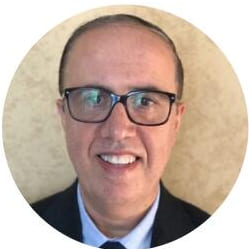
It is not easy to fit Dr. Faroque Khan’s life’s achievements and special moments in the prescribed word limit. Observing his progress in professional, spiritual and personal life over three decades, we are all amazed by how much he has done and is continuing to do for the betterment of everyone. I joined Nassau
County Medical Center (NCMC) at the peak of the AIDS epidemic and watched the training program, under Dr. Khan, become one of the most academically accomplished in the country. Many successes followed but we were all happy when he was appointed to the ACP’s Board of Regents, as the first Muslim representative, which is a constant feature of his achievements.
While running a busy department, he also found the time to serve the Muslim community as President of the Islamic Center of Long Island (ICLI) and the Islamic Medical Association of North America (IMANA). He invited me to participate in small group meetings with the Jewish community and put together a mentoring program for students from the Westbury High School. Just as he did with NCMC, he helped develop ICLI into a nationally recognized place of worship. During the aftermath of 9/11 when Muslim communities came under unprecedented scrutiny, he redoubled his efforts to improve our image with the help of his trusted inter faith partners. One of his admirers was the late Rev. Calvin Butts who would often pose the question to his audience, “When is Dr. Khan going to get the Nobel Peace Prize?”
In so many ways, Dr. Faroque Khan has touched and improved so many lives. He has made lasting contributions in the fields of medicine, religion, interfaith and community affairs and is a great example for all of us to live a purpose-filled life, perhaps embodying the advice of the Mahatma who said, “The best way to find yourself is lose yourself in the service of others”.
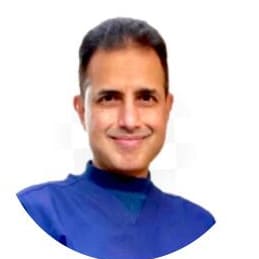
My first encounter with Dr Khan was when he personally called me to ask me why I had canceled my residency interview at NUMC. Although I tried to explain my visa concerns; within a few minutes he had me convinced that we should meet in person and it was then that I saw firsthand how adept he was at helping foreign medical graduates overcome all the obstacles imposed by the immigration service. I subsequently experienced how he went above and beyond to make us all feel very much at home in a foreign country and we would never be as successful as we are today without his unconditional support and encouragement.
I also witnessed his painstaking efforts to first identify and then go through the tedious process of getting physicians who were experts in their fields from all over the world to train at NUMC. Overnight he singlehandedly increased the pass rate of NUMC residents at the ABIM certification exam to 100 percent a feat hitherto unknown before he took over as Director of the residency program. He is an astute clinician and has been a great mentor to all his students.
Even after I left NUMC he made it a point to keep in touch despite his multiple commitments and very busy schedule. His untiring efforts to build and sustain the Interfaith institute are yet another wonderful example of how deeply he cares for his fellowmen and the entire community. Despite his many accomplishments he remains amazingly humble and the following quote from Rabindranath Tagore describes him well “We come nearest to the great when we are great in humility “
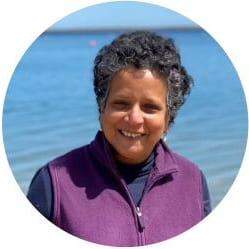
Being a fresh off the boat Indian, navigating the process of getting into residency programs including interviews was intimidating to say the least.
Dr. Khan was my second interviewer, and as cliché as it may seem, interviewing with Dr. Khan and walking the corridors of NCMC was the first time I truly felt I had ARRIVED.
There was a sense of calmness and comfort in the interview as he sat back and let me ramble my well-rehearsed reasons why he should hire mewhile that ever-present smile on his face somehow led me to believe that all along he already was well aware of the group he was going to put together.
Looking back, it became clear that cultivating these groups of people that belonged together was Dr. Khan’s forte and ultimate goal.
With this vision in mind, he turned the history of NUMC around academicallybut more importantly I felt he hadpassed on a sense of duty to all of us to pay it forward.
Dr. Khan’s desire to build cohesive groups working towards the same goal and accomplishing it is evident in his lifetime work with the various organizations.
"If I have seen further it is by standing on the shoulders of giants." His dedication to always being there for others has inspired me to try and lead similarly, mentoring medical students from the UAE for whom he facilitates placement. He has been a role model for me in IMANA and although my involvement is minuscule in comparison, he has always instilled in me a desire to help in any way I possibly can.
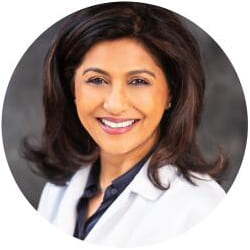
My name is Arsad Karcic, I am a cardiologist from Columbus OH. I came to the US in 1994 from Bosnia, my home country, that was engulfed at that time in a bitter civil war and genocide. After my graduation from medical school in 1994, I had to leave my home country. At that time ICLI and Dr Khan took a large group of Bosnian refugee children to their homes, and became their host families. The Khan family, Drs Faroque and Arfa, took me, a newly graduated doctor, to their home, where I met their wonderful children Shireen and Arif, and their extended family. Although we never met before, they treated me like their own son, gave me all I needed, and helped me recover from the horrors of war that I was exposed to. Dr Khan and ICLI were very active in the interfaith dialogue, and helped spread the truth about the crimes committed in Bosnia .I also provided eye witness account at the congressional briefing held in Washington facilitated by the late Monsignor Tom Hartman and Br Ghazi Khankan(RIP) Dr Khan was an active participant. This was all done with the help of our Christian and Jewish friends and neighbors from NY. Dr Khan gave me an opportunity to work at NCMC, where he was Chairman of Internal Medicine. There, I steadily progressed, and became a cardiologist. I can not mention enough how much he went out of his way to help others in need, privately and professionally. As the war in Bosnia dragged on, my parents were still there. Dr Khan and ICLI helped both my parents to come to LI, and join me. My father was working at ICLI for a while. Later on, Dr Khan helped my brother, also a doctor, to get a training position at NCMC.
Dr Khan improved the lives of countless people, me being one of the fortunate ones to cross his path, who will always cherish his generosity, honesty and kindness.
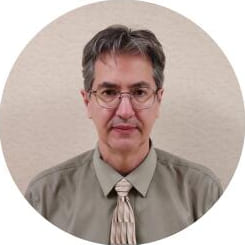
Dr. Khan is one of the most, if not the most well known Kashmiri American, that should give anybody an impression of his stature.
I vividly remember the first time I saw him, he was giving a lecture to medical students and faculty of GMC Srinagar. I as a young impressionable medical student listened keenly to every word, and every slide left an indelible impression, especially the one showing a helicopter landing with trauma patients.
I was lucky enough to train under his guidance and mentorship and got to observe him keenly and learn from him at every interaction. Besides training scores of residents and fellows, many of whom are current leaders in Medicine Nationally and Internationally, he inculcated in us the spirit of social and community service by being a role model and somebody who is looked up to for these attributes by one and all.
Dr. Khan's contribution to the Long Island Community by being a founding member of Institutions like the Islamic Center of Long Island (ICLI), Interfaith Institute of Long Island and Islamic Medical Association of North America and being in leadership roles in scores of other organizations spread across the globe is a testament to his handwork, vision and capability.
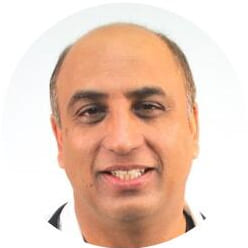
Who would not aspire to be like Dr. Faroque Khan; a wonderful human being, academician, researcher, mentor, national leader, philanthropist and an ambassador across the communities? How many have the honor of being a role model for so many? His great work will perpetually continue through the actions of his mentees.
On my first day in the USA; I arrived at the H building at NCMC, where I was supposed stay for few days. Contrary to my visions of a reception party, no one was available to assign me a room. Somehow, I ended up, with two suitcases and a bag, at the main doors of the NCMC not knowing what to do next. While I was negotiating with a stranger to keep an eye on my suitcases, I heard a voice: “Saydain, what are you doing here?!” This was the first time I came face to face to Dr Khan. Before I could figure out how he knew me, he lifted one of the suitcases and asked me to follow him. Since then, I have followed him in the corridors of Medicine, in the halls of ACP, as faculty member in his Ventilation Workshops, in the lines at the Mosque, listening to the best sermons from him and as a supporter of AFK Foundation. Even today while interacting with a junior, I think of what Dr Khan would do?
His courageous benevolence goes beyond the sphere of his direct influence. I remember, as Medicine Chair, how he saved the career of a surgical resident, as he was being thrown out of the program. One day he himself got admitted in hospital and was treated by the same residents whom he was teaching; he was leading a team which he trusted with this life.
As a beacon of light, he continues to lead us and I pray for his long life and best health, to be here for us for a long time to come.
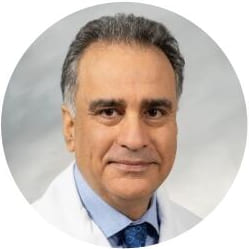
As we celebrate the achievements of Dr. Faroque Khan today, it is important to remember that he has served humanity as a clinician, an educator, an interfaith leader, a community builder and a mentor to many physicians practicing in the US and abroad. Personally, it has been an honor and a privilege to be mentored by Dr. Faroque Khan since the inception of my medical career in the United States. I have been fortunate to receive guidance and counseling from Dr. Khan, having worked with him at Nassau University Medical Center for a decade. It was Dr. Faroque Khan, a Regent and Master of the American College of Physicians (ACP), who introduced me to my professional home of over three decades. I am eternally grateful because he taught me and many others the lifelong skills of a clinician-educator.
Dr. Faroque Khan has taught us the true tradition of medicine as recommended by the great Sir William Osler “The practice of medicine is an art, not a trade; a calling, not a business; a calling in which your heart will be exercised equally with your head.”
Dr. Khan’s imperturbable presence in all avenues of life from medicine and society to ICLI and Interfaith Institute have been exemplary. As an exceptional leader, you have taught us positive behaviors that very few can emulate. Your professionalism remains inspiring, and it has been an exceptional experience to have learnt the art and science of medicine from you. Thank you for everything.
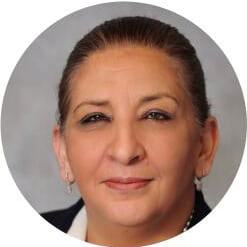
Dr. Faroque Khan remains an icon for the Long Island community, known both locally and internationally. I didn’t know Dr. Khan from before. I met Dr. Khan in the late 90s at ICLI. Always active, steady with realistic goals, and complete dedication is what ICLI groups saw every week with him. At about the same time, Dr. Khan arranged the first ACP meeting in Amman, Jordan; with IMANA visit to Masjid-e-Aqsa. This was impressive. Establishing links beyond what is known is Dr. Khan’s strength. Hence the Interfaith dialogue and development of the Interfaith Institute. This remains Dr. Khan’s legacy.
Later I had the honor of serving in the Department of Medicine at Nassau University Medical Center under him. I found him high in ethics, deeply involved in training U.S. and International medical graduates; making the lives and careers of innumerable doctors.
As organ transplantation developed, the Muslim community had many questions. Dr. Khan’s spoken and written discourse on organ donation, surrogacy, and end-of-life issues was illuminating. ICLI, the vibrant landmark, which we see today has been the Prize of years of perseverance and consistent thinking of Dr. Khan and his team. Its nurturing environment has been the source of advice and guidance to many. Allah (SWT) has chosen Dr. Khan for these far-reaching tasks.
My husband Moinuddin Ahmed and I, wish Dr. Khan, Dr. Arfa Khan, and family health, happiness, and success always.
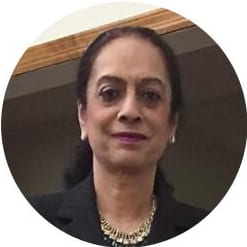
It is a privilege and honor to write about my dear friend and colleague, Dr. Faroque Khan, his life, and his medical accomplishments as tribute is paid to him by the Interfaith Institute of Long Island (IF-LI). I met Dr. Khan when he was appointed chairman of the Department of Medicine in 1987 at the Nassau University Medical Center (NUMC), where I had worked 19 years previously (1970-1989). I was a full-time Medicine and Nephrology Faculty Member at NUMC and had an appointment at Stony Brook University as an Assistant Professor of Medicine. Dr. Khan encouraged me to further my research since I had not published it in some time when he assigned me to oversee the Medical Clerkship Program at NUMC.
As a clinical teacher, Dr. Khan was an excellent role model, a mentor, and a friend who always looked out for the best interests of his junior faculty as they grew and enhanced their careers in academic medicine. Within a year, Dr. Khan recommended my promotion to an Associate Clinical Professorship at Stony Brook University, and when it was approved, he called me excitedly to congratulate me. He introduced me to the Islamic Medical Association of North America (IMANA) nationally, which introduced me to many physicians nationwide.
Dr. Khan is an extraordinary physician, and as such, he made many changes during his tenure at NUMC: he recruited residents entirely on meritocracy; he introduced many new methods to improve the teaching program of the residents; he was an avid clinical researcher, and brought massive funding to the Meadowbrook Medical Research Foundation; he recruited doctors from all over the country and abroad; he was highly proactive with the american college of physicans (ACP) local and national offices, bringing organized courses endorsed by ACP to NUMC, and making the medical center a well-known teaching hospital.
Dr. Khan was always a superb teacher, and residents enjoyed his teaching rounds during the morning report. He was firm and critical when residents could do better. He adored group lunches and dinners at the hospital, local restaurants, and even at his home. He was fond of seminars and lectures centered around learning activities and networking, always highly ethical, courageous, and bold in approaching challenging issues.
NUMC is a very politically oriented place where the local politicians controlled the hospital and discouraged new approaches in offering health care to the local community. As a result, a private practice plan was devised, and Dr. Khan was instrumental in that initiative, where doctors could bill for their services. The practice plan income had to be distributed fairly and equitably, and Dr. Khan played a vital role in uniting all the doctors. These were challenging times, and many doctors decided to leave and enter private practice. Thus, the scene changed dramatically, new faculty members had to be recruited and new chairpersons appointed. In 1989 I resigned from NUMC, entered private practice, and established dialysis centers.
Dr. Khan resigned from NUMC in 1999 and gradually entered other areas of medicine. He went abroad to establish new chapters of ACP and King Fahad Medical Research center in Saudi Arabia. He took a new interest in faith-based community activities and interfaith work. Although he was no longer a pulmonary specialist, teacher, and mentor, he continued to use his talents and skills in community work and political activism. Among his many new ventures was Regent of ACP, President of IMANA, Board of Trustees at Islamic Center of Long Island, and Shura council member.
I will never forget Dr. Khan as a visionary, dynamic, scholarly, and intelligent leader who is always compassionate, down-to-earth, and constantly there to guide his many charges and me throughout the years. Knowing him has been a distinct pleasure as he has enriched my life, and I wish him and his family many years of good health and happiness.
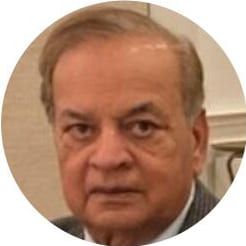
It was almost 30 years ago that I came across a personality that was instrumental in changing the course of my life. What started as a clinical training program led to a phase of my professional life that put me at the forefront of the medical profession in several ways. It led to my evolution as a clinician with ties to medical academic leadership of the country, thanks to the encouragement and guidance from a great mentor, Dr. Faroque A Khan.
I started as an intern in the Department of Medicine at the then-Nassau Medical Center in July 1993. I was fortunate to be offered the chief resident position in 1995. Our team of chief residents consisting of Drs. Shah, Rizvon, Sagar, and I wanted to bring several innovative changes to the program. It was through the encouragement and guidance of Drs. Khan and Mir that we were able to implement them. These mentors always supported us in our endeavors to streamline the training program and strengthen its academic and organizational content.
It was during this time that Dr. Khan walked into our office and asked me if I wanted to apply for the Council of Associates of the American College of Physicians. I consider this as one of the turning points of my career leading to greatly widening my academic and professional horizons. He nominated me for this position and within a year I was part of some very important ACP committees. I ultimately became the chair of the Council of Associates; a position that placed me in the Board of Regents of the American College of Physicians as an ex-officio member. I keenly watched and learned from the academic and clinical leaders of the country. I saw Dr. Khan lead this group of the Board of Regents through some very interesting times that also saw the merger of the American Society of Internal Medicine and the American College of Physicians. This was also an era when ACP- ASIM jointly were reinvigorating lobbying for the physicians in Washington DC and Dr. Khan’s understanding of the political system helped facilitate this unique effort.
This was also a period when Muslims in the United States of America were gearing up to create an identity in their communities. Dr. Khan was at the forefront of this effort and organized the Muslim community of Long Island. I participated in elections campaigns, multi-faith dialogues, and community meetings which helped me develop a valuable insight into the political dynamics of this country.
There are several lives that Dr. Khan touched with his helpful and kind nature. He understood the challenges being faced by many of us in our professional and personal lives and worked tirelessly to help us overcome them. Beneficiaries of his help and guidance are in leadership positions all over the country and owe their success and achievements to this great professional, mentor, and leader. He will always remain in our prayers. We wish him and his family all the health and success.
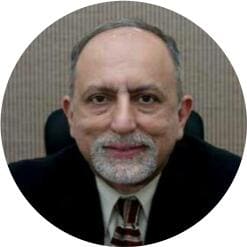
I am Mohammad Al-Shroof, an Internist and the Chief of Staff in Warner Robins, GA, I am one of the many trees that Dr. Khan planted all over the world.
My first interaction with Dr. Khan was in 1990. I was a medical student at Jordan University doing an elective externship at Nassau County Medical Center (NCMC) in New York under the Chairmanship of Dr. Khan. He gave many opportunities to countless international medical students to do an elective in his program. This experience of an elective at NCMC opened numerous great residency program positions for those students from all over the United States.
When Dr. Khan picked me and Nadia from JFK Airport in June of 1994 to start my residency in July and due to the number of bags we had, he ended up using and damaging his pant belt to partially close the trunk of his car. I have bought Dr. Khan 3 belts over the last 29 years to try to make it up to him. Dr. Faroque and Dr. Arfa Khan welcomed us into their home, offering us their guest bedroom for weeks until we settled. I know this guest bedroom has accommodated hundreds of students and guests over the years.
By investing time and effort to become a leader in the American College of Physicians (ACP), Dr. Khan was able to lobby for many rights of physicians and international medical graduates-IMGs in ECFMG, ACP, and in the American healthcare system at large.
Dr. Khan brought out the best in all his residents, constantly encouraging us to partake in research and volunteerism. In the 1996 competition for clinical research by the ACP, out of 10 awards, NCMC medical residents won 3 awards including me. My award was for discovering and recording a new syndrome. One core memory I have of Dr. Khan was during my residency, he invited me to accompany him to an Interfaith activity at a synagogue during Passover. As a Palestinian, this was the first time I visited a Synagogue. Hearing all the speeches that were made that day left a long-lasting effect on me about mutual understanding and the importance of open dialogue.
Under his leadership, the American College of Physicians ACP held its first international conference in Jordan, and I was honored to be a part of it. The impact of the conference on the local Jordanian physicians was tremendous, and the leadership of the American College of Physicians, a very diverse group of physicians, got to explore the Middle East. It was a tremendous opportunity for understanding two different worlds. I was a tour guide for a large delegation visiting many sites in Jordan including a Palestinian refugee camp that my family came from.
I continue to meet Dr. Khan through different activities, especially in the Islamic Medical Association (IMANA) meetings, Dr. Khan was one of the founders of IMANA in 1967 and I became the first President of IMANA born after its foundation. Without him ever preaching to me, I learned many things from Dr. Khan, he taught me to be generous, to lead through others, to forgive people who crossed you, to try to be on the table so you don't end up in the menu, to always give back to the community, to Plant a tree wherever I go for future generations, that doing any effort (even a small effort) is better than doing nothing, and many other things, I live by his examples and I implement them my life daily.
Dr. Khan is my second father. His sacrifices and leadership shaped me and many others.
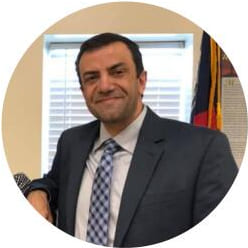
A highly reputed and skilled doctor, a generous mentor, a sincere and honest human being, an educationist par excellence, -- this is a rather modest introduction to Dr Faroque khan. I could go on with this list of qualities and virtues and it would take plenty of time to speak about him. Briefly put, whatever the role he took on, he gave it his time, energy and full attention. His gentleness, his caring ways, his magnanimity endeared him to his patients, friends and colleagues. I'd say, in him met all virtues in a harmonious whole
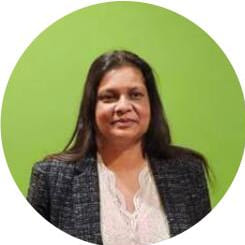
 - Eric Hamza Byas-46.jpg)
Personal reflections by Faroque A. Khan: ICLI President from 1987-1988 and 2003-2005.
The concept of ICLI grew from the concerns of a small group of Muslim immigrant families who settled in Nassau County in the early ‘70s. The need to preserve their religious identity, and cultural heritage, and their desire to educate their children in Islamic principles drew these families together. Our children often would ask us why we don't celebrate Christmas and Hanukkah and why they have decorations and lights up but we don’t. To answer these and other similar questions, a small group with 10 to 15 children started meeting on weekends, initially held in a nursery school in Hempstead, in the basement of private homes or rented church facilities that were often very accommodating to the needs of these new immigrants. The Advent Quaker church in Westbury was particularly accommodating. As the enrollment of students increased, more people started joining. It was obvious that there was a need for a central location and thus emerged the concept of the Islamic Center of Long Island. The property at 835 Brush Hollow Rd. was purchased in 1984 thanks to late Dr Tariq Javaid who recommended this location. The funds for the purchase of this property came from private donations, mostly from the core group of families. After incorporating ICLI as a nonprofit entity under the provisions of the religious corporation law, the community started developing plans for building a mosque. The initial experience was rather humbling. For the first Friday prayer, there were three congregants and I wondered what the future of ICLI would be in the midst of a predominantly non-Muslim neighborhood with many of the neighbors voicing concerns about the mosque in Westbury. The weekend classes averaged 15 to 20 children and the bank balance of ICLI was close to zero. The challenge for the founders was how to go about managing this new entity and overcoming the concerns of the neighbors with none of us having any prior experience in managing a religious center. Thus began a long journey that culminated in the development of the bylaws for the center, engagement with the immediate neighbors, and gradually, the community expanded and invited a professional design for the mosque. Construction began in the early ‘90s. My involvement with ICLI was primarily because of my children, Arif and Shireen, and I was fortunate enough to be in a position to make some contributions which I will summarize in this presentation. In the early ’80s, I was on a number of nonprofit organization boards, both local and national. This experience was very helpful. I fondly remember serving on the executive committee of the Nargis Dutt Memorial Foundation (NDMF), which had a mission of upgrading medical services in Mumbai, India. The lessons learned at the NDMF came in handy. I learned about setting the bylaws, do’s and don’ts of fundraising, etc. I will summarize some of the projects/initiatives which I feel were the key to helping develop and evolve ICLI into a major progressive center, particularly projects in which I was personally involved.
We invited immediate neighbors of ICLI and leaders of Central Westbury Civic Association (CWCA) to the planning meetings for the new mosque in Westbury and made every effort to accommodate their recommendations. Ann and Mannie Sweat were a great help and shared with the Westbury community key information about this new group of Muslims who had decided to build a mosque in Westbury.
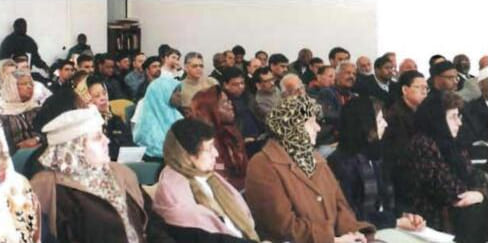
Attendees at the special three-hour symposium titled Malcolm X-Malik El-Shabazz: His Legacy and Contributions - February 28, 2001.
a) George Pataki visited ICLI on August 14, 1994 and launched his campaign for governor of NYS. b) The newly created Nassau Legislators were invited and 16 of the 19 legislators visited on January 10, 1996, they learned about LI Muslims and enjoyed a sumptuous Afghan meal. This event received extensive media coverage in Newsday and New York Times. c) Interfaith coalition to a congressional hearing on Bosnia genocide January 25, 1995. d) NYS 2000 senatorial campaign between Hillary Clinton and Rick Lazio about how the mobilized Muslim community played a key role in this election written by New York Times on November 3, 2000, by Robin Finn titled Public Profile: A Lexus Republican, but No Friend of Lazio. These outreach programs led to my invitation to the Eighth Annual prayer breakfast at the White House on September 14, 2000. Slowly but surely, the community was getting recognized locally and even nationally.
Strategic retreat with Professor Rafiq Beekun:After attending an IMANA strategic retreat led by Prof Rafiq Beekun, I invited him to ICLI and he helped ICLI develop the vision and mission statement and gave an overview of how to develop focused programs for ICLI. This was well received and appreciated by the community.
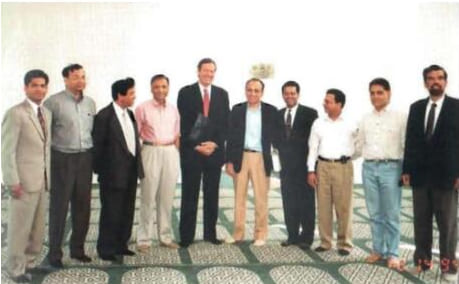
George Pataki with members of ICLI on August 14, 1994 at the launch of his Long Island gubernatorial campaign for New York State.
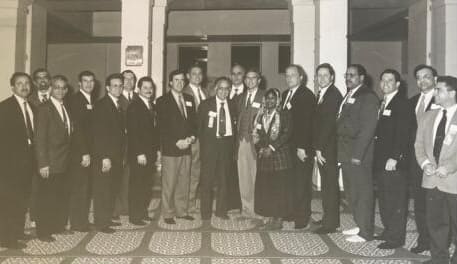
Legislators at ICLI on January 10, 1996.
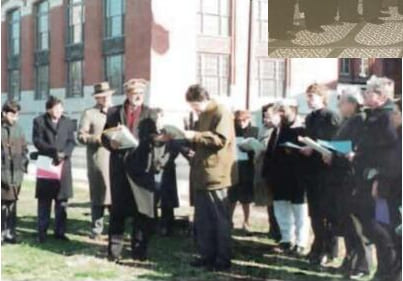
Members of Long Island faith based organizations at the Washington Holocaust Museum with Dr. Arsad Karcic reading a prepared statement - January 25, 1995.
As chair of the Long Term Planning Committee of ICLI board of trustees, we initiated and organized a special event titled “Honoring Muslim Women in Our Community”. We also chaired the expansion steering committee responsible for fundraising and attending to the details of the mega expansion project.
Initiated award-winning program:Initiated the award-winning program American Muslims and Jews in Dialogue with Temple Beth El in Great Neck in 1992. Details can be found on page 83 and 86.
Our Muslim Neighbor Program from 2003 to 2005:In collaboration with the God Squad team of Msgn Tom Hartman and Rabbi Marc Gellman, Our Muslim Neighbor Program aired on the Catholic TV channel Telicare. We provided the funding, content, and speakers. Details can be found on page 84.
Authored the book: Story of a Mosque in America:Published in 2001, the Story of a Mosque in America shared with the larger community in the USA about the lessons learned during the establishment of ICLI. The book was published in 2001 and is available online. The election between Hillary Clinton and Rick Lazio on Chapter 13, pages 143-153, provides an overview of the role NYS Muslims played in the NYS senatorial election.
5 Talbot and 746 Franklin properties:Arfa and I purchased two properties on Talbot Street and Franklin Drive to ensure adequate space for the planned expansion of ICLI. The Talbot property was demolished and became part of the expanded parking lot and the house on 746 Franklin street provided increased access to ICLI. When the financial situation of ICLI improved, we "sold" the Talbot and Franklin houses to ICLI at a discounted price.
First Islamic Art Exhibit on Long Island:Held at Westbury Arts Center and launched in August 2022, I oversaw the overall planning and curation of this exhibit. The exhibit received excellent reviews.
Outreach to Westbury schools:I was able to develop an apprenticeship for Westbury seniors at Nassau County Medical Center.
Outreach to North Shore University Hospital:Thanks to Dr. Fred Smith, we had many trainees from NSUH visit ICLI and after Friday prayers, I spent time answering the questions the trainees had.
Special ICLI guests:Based on my extensive contacts through ISNA and IMANA, we were able to invite guests like Murad Hoffman from Germany, Michael Wolfe, Dr. Hassan Hathout.
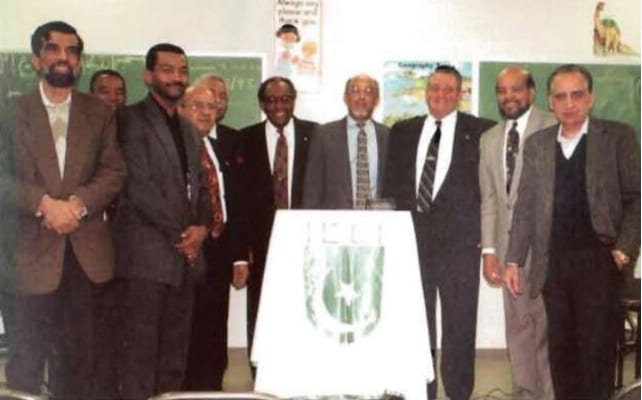
Westbury School District (WSD) Superintendent Robert Pinckeny (fourth from right) with members of ICLI and elected officials of the school board, Village of Westbury, and NAACP - March 12, 1995.
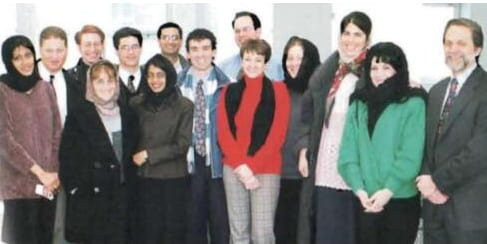
Dr. Frederick Smith (right), Director of North Shore University Hospital program Religion and Medicine, at ICLI after attending the Friday Khutbah followed by a discussion of special needs of Muslim patients, Accompanying Dr. Smith are the physicians in training at NSUH - January 28, 2000.
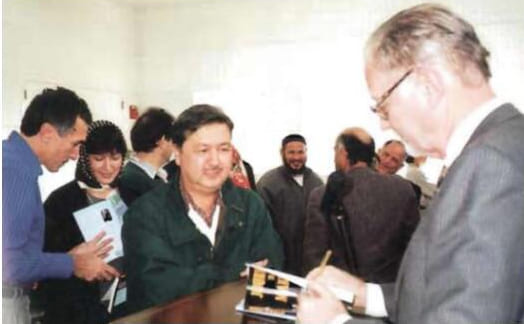
Murad Hoffman with ICLI members signing his book Journey to Makkah - November 15, 1998.
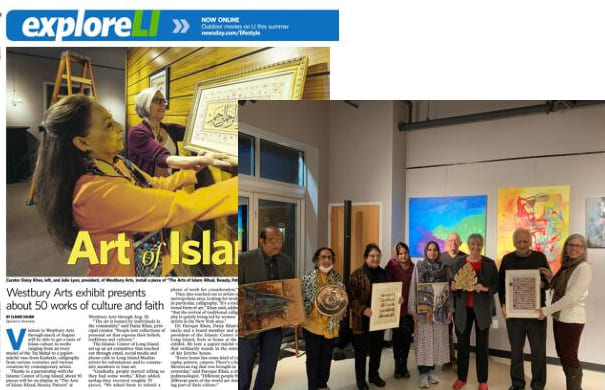
Islamic Art Exhibit at Westbury Art Center in August 2022.
Finally, let me conclude with a description of a unique program we hosted at ICLI way back in August 2004. Based in Boston, the Elderhostelers is an organization that provides 200,000+ older adults with learning adventures. ICLI received a call from the Boston headquarters of Elderhostelers inquiring whether ICLI would be interested in hosting a program on Islam in view of the great interest post 9/11. We were surprised that they would call us all the way from Boston, however before the day was over, they had received a program outline with key elements described in detail. In August 2004, for four full days, ICLI had about 100 Elderhostelers traveling long distances in buses and coming to ICLI. We provided an all-day program on Islam, including the meals, and got to know quite a few people. The attendees were mostly retired teachers, lawyers, librarians, chaplains, and travelers. ICLI charged a fee for this program and the program was so successful that we agreed to repeat it the following year in August 2005.
New York Times issue on September 12, 2004, titled Islamic World Seen in Westbury, provided very nice coverage. Attendees Daniel and Marilyn Brown wrote to Larry King on CNN requesting him to interview the ICLI leadership so that the larger audience can hear the American Muslim point of view. We never heard from Larry King.
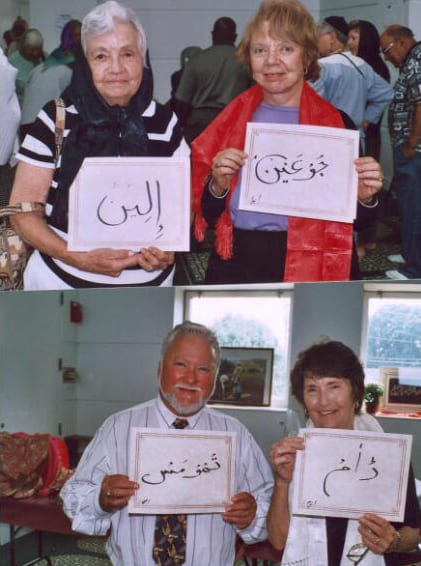
Elderhostelers participating in all-day programs on Islam at ICLI in August 2004.
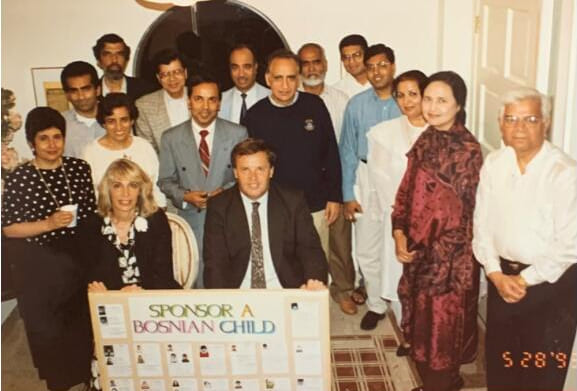
Some of the sponsors of the Bosnian child sponsorship program following the Bosnian genocide.
The lessons learned from this experience were that we need to be open and address all issues such as terrorism, suicide bombings, the role of women, role of prophets, and so many more. We also managed to put together cultural exhibits which increased the comfort level of all attendees and provided ample time for question and answer. Handicap facilities came in very handy as did Arabic calligraphy and henna sessions. Finally, a good and annotated bibliography of written and Internet sites shared with all the attendees. Subsequently, I linked up the Elderhostlers with Dr. Salim Bajwa, a former colleague who lives in Boston, and these programs were continued. Dr. Bajwa mentioned this in his report published in the booklet. An interesting question that I was curious to learn about was why the Boston-based Elderhostelers pick ICLI as a site. After I got to know the leadership of Elderhostlers, I asked them and they said that they tried to reach many centers closer to Boston, however, they were unable to find a host while the ICLI response was prompt and professional. An interesting spin-off was that ICLI also generated a profit from the program in addition to winning the hearts and minds of attendees who were seeking authentic information. Subsequently, I presented the highlights of this program at the annual meeting of the Islamic Society of North America and it was very well received and appreciated. The accompanying pictures from this Elderhostel program give the reader a little glimpse of what the attendees experienced and enjoyed. The take-home message is that there's a lot of interest out there in the larger community in learning about new faiths.
During all the activities spanning many years that I was deeply involved in at ICLI, the role of the volunteer members of the executive committee, the staff in general, and Sr. Menire Terpis, in particular, was/is greatly appreciated. All calls and inquiries, whether from Temple Beth El, Elderhostelers, community members, or neighbors were received, acknowledged, and followed up on. My personal thanks to all the volunteers who served with me as the executive member and a special thanks to Sr. Menire Terpis for her long devoted service to ICLI and the community in general.
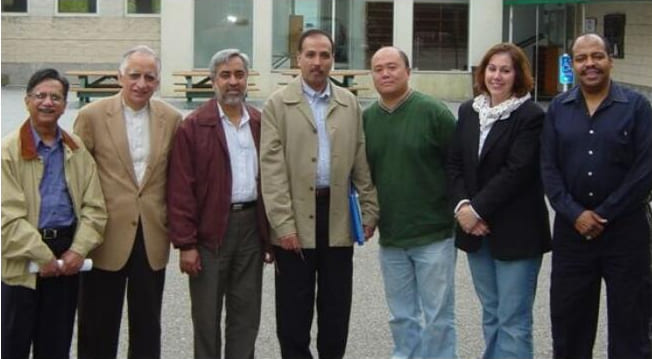
Developed mission and vision of ICLI at the tree day strategic retreat in April 2004 under the watchful eye of Professor Rafik Beekun.
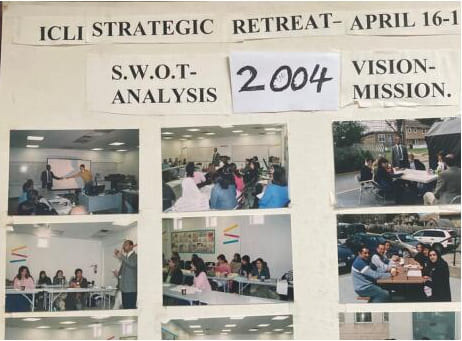
Ten former ICLI presidents at the celebration of Sr. strategic Munire’s retirement.
Dr. Faroque Khan is being recognized for his immense and wide-ranging contributions to the ICLI and the Muslim community. A brief listing may serve the purpose of providing a glimpse of his contributions. He... Converted an informal Sunday school to Islamic Center of Long Island ICLI-a tax-exempt entity Emceed many fundraisers for ICLI Was elected President of ICLI-1987-1988 and 2003-2005 Chaired the Long Term Planning Committee which initiated programs, such as “Honoring Muslim Women of the Community”, The Interfaith Institute, etc. Initiated and launched the unique American Muslims and Jews in Dialogue- AMJID- program in January 1992 with Rabbi Jerome Davidson of Temple Beth-El of Great Neck. Joined Our Muslim Neighbor program of the God Squad hosted by Telicare under the guidance of Msgn Thomas Hartman and Rabbi Marc Gellman. Hosted an Islam 101 program for Elderhostelers after 9/11. Invited special speakers to ICLI—prominent Muslims from across the USA and even overseas like Murad Hoffman from Germany, Michael Wolfe from California Hassan Hathout from California, Sr. Ingrid Mattson, Sayyid M Syed, and many others.
I was fortunate to meet Faroque Bhai more than three decades ago at ICLI. He was respected by the ICLI community due to his many achievements in his professional life as well as his involvement and contributions to ICLI.
Unlike some ICLI members, I never felt intimidated by Faroque Bhai. Maybe the fact that he could be a bit aloof and didn't suffer fools made him seem less approachable to some.
I found him witty and charming with a great sense of humor. An incident from a long time ago comes to mind. At a party, as I was chatting with Faroque Bhai, my kids (then 10 and 9 years old) came up, stood next to me, and announced that they were taller than me. I rolled my eyes and commented that everyone was taller than me. Faroque Bhai said to me, "That's not how you answer. What you say is: diamonds come in small pieces, rocks are big." He truly made my day! What a great comeback.
I will always be grateful to Faroque Bhai for his mentorship, guidance, and encouragement during my incredible journey to becoming the first Clinical Pastoral Education (CPE) trained Muslim Woman Interfaith Healthcare Chaplain on the East Coast.
There is no need for me to mention his tremendous achievements in the Interfaith arena as it is common knowledge.
May Allah SWT bless him with good health, peace, and tranquility, and may he continue with his tireless efforts at building bridges with the larger community, while also working to educate people about Islam. Ameen.
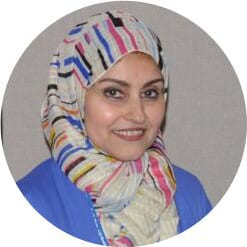
On this beautiful day, my heart is filled with pride and excitement as I attend a special event to honor a remarkable person who has been a friend and supporter to me and my family for over 20 years. Today, we celebrate a lifetime of achievements and a legacy that has positively impacted so many lives.
As I write these few words of tribute, my head is filled with countless memories of the moments shared with this extraordinary person. I remember the way he encouraged me to pursue my dreams and the way he provided guidance during some of the most difficult moments in my life. He has been a friend, mentor, and role model all in one.
His achievements are many, and recognition is long overdue. He has been a pioneer in his field and has made significant contributions to the community through his philanthropic work. His unwavering dedication to the betterment of others has inspired many others to do the same.
I’ve watched with admiration throughout my years of knowing him as a cherished friend and mentor to so many individuals throughout our community. I have witnessed his numerous accolades for his contributions to the community. When he was President of the Islamic Center of Long Island, he chose me to be his General Secretary so I saw up close his humility, his professionalism, and many of his wider visions for the greater community. We even enjoyed very scrumptious meals together along the way. Its always been hard for me to phantom his motivations for all of the work that he has been involved in as he has always been one, through his own examples, to urge others to continue to give back and stressed the importance of compassion, kindness, and empathy in changing the world.
I realize that although this person is being honored for his achievements, he has impacted far more than just the audience in attendance. His contributions have had a ripple effect throughout the entire community and have inspired many to make a difference in their own lives. A most personal example that I am willing to now share, is years before meeting Dr. Khan, as a veteran of the United States Marine Corps, I was somewhat justifiably (I guess) filled with rage, always looking for ways to channel the training that had been solidly instilled into my person, as a solder. “Adapt and survive,” has always been to the order of the day, even as I write these words. Most of the time my world at least within my own head, was one of isolation, outside of the military. But soon after coming to the Islamic Center of Long Island, and meeting the likes of Dr. Khan, his wife, and extended family, all gradually began to change within my own head and heart, for my betterment. The Khans, like most members of the community treated me with love, kindness, and respect. They collectively taught me that where I saw threats, there were none, and that people can genuinely be kind and sincere, something that I had lost at some point, as a soldier. Dr. Khan went out of his way and visibly uplifted me personally, examples too many to describe within this tribute. But the greatest that I will mention, was when my wife and I married, on a cold New Year’s Eve, many years long ago, our ceremony took place in the home of the Khans at Dr. Khan’s insistence.
Faroque Khan, you have been my Brother, my Friend, my supporter, and my mentor, and for all of the roles that you have played in my life, I am forever grateful. You always somehow have been able to leave a sense of gratitude in my heart. I am grateful for the opportunity to be a part of this momentous occasion and grateful for our friendship that has spanned over two decades.
I will always try to continue the legacy of kindness, compassion, and empathy that you have exemplified throughout your lifetime achievements. A legacy that will undoubtedly continue to transform lives for generations to come.
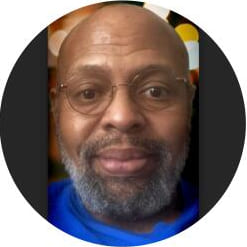
My first introduction to Dr. Khan was made via a TV commercial for cancer treatment.
As chairman, Board of Trustees, Dr. Khan organized a “management retreat” under the guidance of a professional experienced in corporation retreats. This was a game changer and resulted in significant changes both in the ICLI bylaws and committee structures.
Dr. Khan is highly committed to his responsibilities. He proved it during his tenure as chairman. He was working in Saudi Arabia and he hardly missed any board meetings.
The expansion project was challenging due to its size and expected costs. Dr. Khan steered the entire process resulting in the new campus with 12+ classrooms and a full-size basketball court.
Interfaith dialogue and outreach to other faiths resulted in “Interfaith Institute” which has done a great service.
Our Muslim Neighbor program hosted by Telicare under the guidance of Msgn Thomas Hartman with Rabbi Marc Gellman and Dr. Khan was well received by the large catholic and Jewish communities. Our community helped with funding and and provided additional speakers when needed. This included ICLI members and even the youth of ICLI.
Special Speakers: Over the years Dr. Khan managed to invite prominent Muslims from across the USA and even overseas for visits to ICLI such as Murad Hoffman from Germany, Michael Wolfe from CA, Dr. Hassan Hathout from CA, Sr Ingrid Mattson (ISNA president), and Sayyid M Syed, sec general of ISNA and many others.
Newspaper articles Dr. Khan frequently writes for Newsday and other local papers. Two such articles are listed below that have a significant impact on our standing in the community as Muslims.
1.A lead article in NYT at the height of Islamophobia and partly a response to Peter King’s public comments. 2.Between Black and Immigrant Muslims, an Uneasy Alliance published by New York Times on Sunday, March 11, 2007.
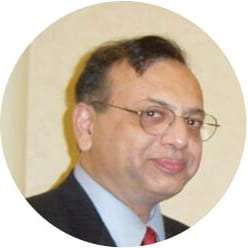
There are so many people one meets during one’s lifetime, but they're very few who have such a positive and profound impact not only on oneself but so many people across all walks of life. I was blessed to have worked with and for Dr. Faroque Khan over a number of years. Dr. Khan stood above everyone else for his selflessness, and commitment to his mission of bringing everyone together in a harmonious way, his valuable contribution to the field of medicine, his insightful wisdom, countless sacrifices, his fearless actions, and his standing up for what is right.
Dr. Khan always prioritizes the needs of others by making himself available to anyone at any time including myself, for which I am so very grateful. His influence has become a foundation upon which I stand today. I have never come across anyone as accomplished, humble, compassionate, professional, and articulate as Dr. Khan. His contributions to the community at large are unprecedented.
I wish Dr. Khan a healthy life ahead and thank him for everything he has done for all of us.
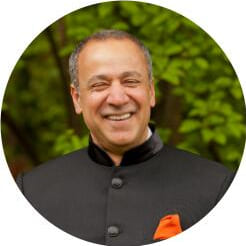
“Think global, act local,” are the words that have resonated with Dr. Faroque Khan’s long-lasting impact on the foundation and continued growth of the Islamic Center of Long Island. As one of the most impactful founding members, two-term President, and continued active Board member of ICLI, Dr. Khan’s visionary leadership has truly led the Center to build the reputation locally and nationally it has today, through the grace of Allah (SWT).
Dr. Khan’s passionate and relentless work in building harmonious relations with interfaith partners, government leadership, civic groups, and neighbors for the benefit of the ICLI Community with the global impact for the Ummah at large in mind, is a legacy that will be recognized for years to come. His leadership in both the initial foundation of ICLI, followed by the expansion of the Center in 2015, launching an outreach video production Our Muslims Neighbors with Msgn Thomas Hartman and Rabbi Marc Gellman, inaugurating the Interfaith Institute, and connecting prominent leaders from across the spectrum is a testimonial to his dedication to serving the Ummah at large and more specifically the ICLI community.
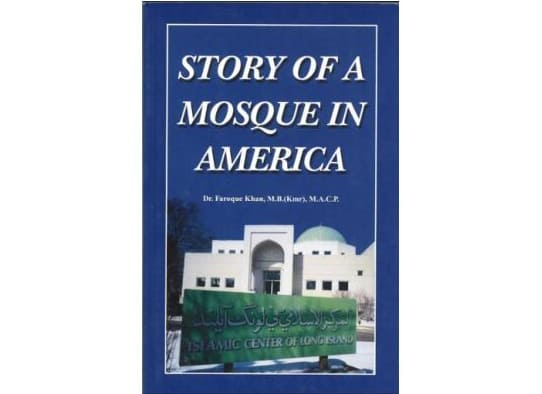
Cover page of Story of a Mosque by Dr. Faroque Khan.
It is not easy to fit Dr. Faroque Khan’s life’s achievements and special moments in the prescribed word limit. Observing his progress in professional, spiritual and personal life over three decades, we are all amazed by how much he has done and is continuing to do for the betterment of everyone. I joined Nassau
It has been Dr. Faroque Khan's visionary ideas, followed by implementation through unity, team building, and charismatic leadership that grants us the ability to recognize and celebrate his lifelong and impactful achievements. I will like to congratulate Dr. Faroque Khan not only on his achievements but more importantly as a mentor and an inspiration to myself and our younger generation.
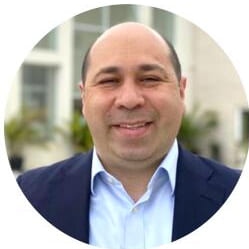
Everybody wants to live a purposeful life. It's part of our human ways, as we don't like the feeling of standing still. We need to constantly move forward to some goal or purpose. If we don't, we are less happy. But it's easier said than done, though.
What is a purposeful life? A purposeful life is when you are moving towards a big goal in your life that aligns with your values and passions and makes you happy. This is harder than it sounds because finding your purpose in life is not always easy.
Dr. Faroque Ahmed Khan found his purpose in life. It manifests in the way he has lived his life, always thinking big and delivering the goods to his beloved community. Whether it is being part of the collective vision of founding an Islamic center or practicing medicine, Dr. Khan always had a bigger purpose in the back of his mind. I have known Dr. Khan for a while now but I still don’t know much about him. To an average person like me, what he has done and continues to deliver seems near impossible. In their lifetime, everyone strives for certain goals and aspirations but rarely comes close to checking all the boxes that they hoped for. I truly believe that Dr. Khan, the way he has lived his purposeful life, has checked off all the boxes.
Hailing from the Kashmir region, Dr. Khan came to the U.S. to pursue a better life and in his pursuit of a better life, he lived an exemplary life for his peers as well as the next generations of community leaders. Dr. Khan’s achievements and successes are numerous and deserve extensive writeup but the editor of this journal has limited us to 500 words hence highlighting some and underscoring some accomplishments during his service to our community.
Founded and served the Islamic Center of Long Island (ICLI) as president, twice, from 1987 to 1988 and from 2003 to 2005.
Led the expansion steering committee which was charged to raise the funds for the expansion project of ICLI. The expansion let ICLI offer expanded services and programming.
Chaired the ICLI board's long-term planning comm, which introduced several new initiatives, and projects and organized some impactful programs including “Honoring Muslim Women of the Community held in 2015.
The Interfaith Institute, a critical institution to build bridges, was conceived and nurtured by Dr. Khan.
Initiated and launched the unique American Muslims and Jews in Dialogue program in Jan 1992, in collaboration with Rabbi Jerome Davidson from Temple Beth El in Great Neck. The programs held by AMJID received wide press coverage and several awards.
Well before residents of Nassau County knew who Muslims are and what Islam stands for, Dr. Khan, in cooperation with Telicare, organized a tv program, Our Muslim Neighbor, hosted by Messenger Thomas Hartman and Rabbi Marc Gellman of God Squad. Raised funds privately to support this much-needed outreach program.
Hosted an Islam 101 program for the Elder hostelers, post 9/11—the Elder hostelers traveled long distances to hear about Islam from Muslims, received great reviews, and also generated a profit for ICLI.
Special Speakers—Over the years managed to invite prominent Muslims from across the USA and even overseas for visits to ICLI.
Served as president of IMANA.
I will continue to admire Dr. Khan for what he has done for our community and aspire to follow his lead in living a purposeful life.
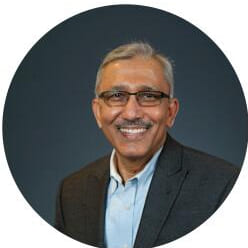
Many of us from different backgrounds and fields of study left our homelands and came to these shores in search of better opportunities.
As we settled and had our children, our common concern to provide them with Islamic education, brought us to this little house in Westbury. This little house stands today after 40 years as grown, multi-campus, nationally and internationally known the "Islamic Center of Long Island".
The parents had formed the Board of Trustees, the Executive Committee, and most importantly the Sunday School. A community was born where parents and children interacted, learned, socialized, and helped each other. That is where I met a most impressive team player, a leader, and a truly personal friend. He was one of the great visionaries setting high goals for the Center and remained humble despite his great achievements. He is:
and that person is Dr. Faroque A. Khan!
Wishing him good health and best wishes to accomplishing his desired works.
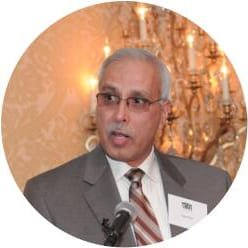
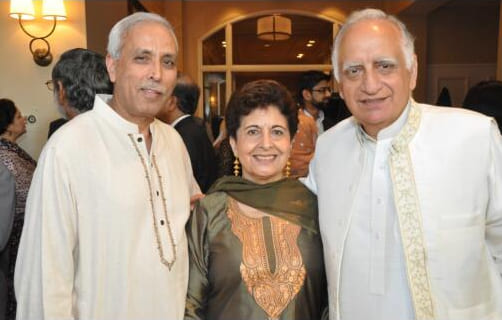
Sajid Shah with Arfa and Faroque Khan.
I have known Dr. Faroque A. Khan since the 1990s when I first started working for Crescent School and the Islamic Center of Long Island.
He has never failed to put in his effort wherever needed, in his own very quiet, unassuming, but constructive way. His positive working relationships with members of the Board, Executive Committee, the center's various committees, and office staff are commendable.
Dr. Khan worked tirelessly in so many projects that made the Center grow, in promoting interfaith understanding and harmony, in hosting the Elderhostel group with Islam 101 after 9/11 (this was a first for ICLI), responding to countless media calls reaching out to ICLI after 9/11, inviting prominent local, national and international speakers, which drew the attention of the community and made ICLI a major Islamic Center on Long Island.
His khutbahs were always planned and prepared with substantiating statistics, and relevant information and presented to the Jumu'ah congregation in such tone and respect of attendees as if each were Ph.D. candidates. It was easy to absorb what was being presented. He even had the khutbah ready in print for those asking for a copy!
His mailbox was mostly empty, not because there was no mail, but because he attended to it regularly. He planned and prepared for any project much in advance of its due date, and gave the office enough time to make the needed copies for its presentation. A very exemplary working habit avoiding last minute stress, and not giving stress to office staff! If that is not a consideration of others, then what is? There was much to learn from his work ethic.
Few incidents which personally touched me during my work at ICLI:
If that is not humility and appreciation of others in action, then what is?
I know that both Drs. Faroque and Arfa Khan have a special place for ICLI in their hearts and both are due a major credit for its success.
With thanks, appreciation, and best wishes always.
You are an incredible leader in our community, a mentor to our young people, and a wonderful friend. Somehow you manage to excel in all these roles with grace and humility. Thank you for being such an inspiration to us all!
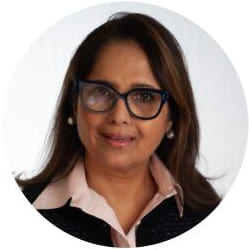
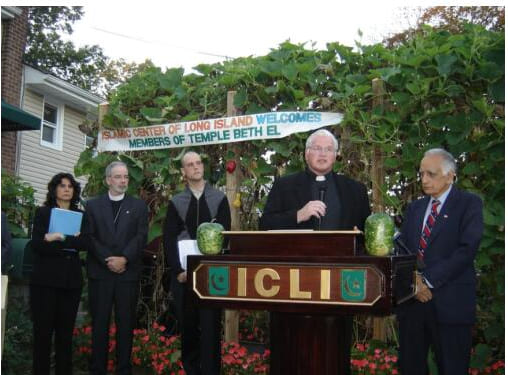
Celebrating Jewish harvest holiday Sukkoth at Islamic Center of LI.
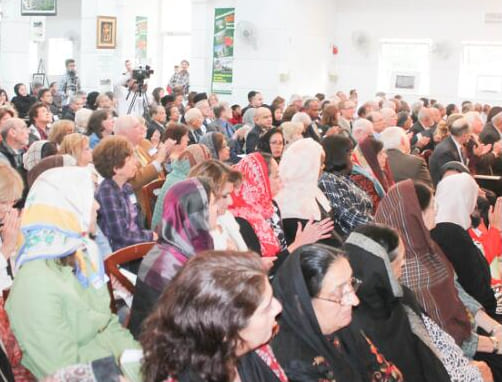
Audience at the launch of IFI on Oct 25, 2015.
 - Eric Hamza Byas-58.jpg)
IMANA was created in 1967 by a few Muslim medical trainees who had come to the United States from various countries in the Middle East and South Asia and wanted to preserve their heritage culture and develop social contacts. I had heard about the organization from some fellow Muslim trainees in the early ‘70s.
My first formal introduction was in the late ‘70s, perhaps 1977 when I had a chance to present one of my early research papers at the IMANA annual convention held in New Jersey. It was quite an experience: there were about a dozen people in attendance and the person who was registering the guests, running the 35-millimeter slide presentations, developing the program, and also moderating some of the sessions was none other than Dr. Ahmed El-Kadi. It was an eye-opener for me to see such a devoted professional who was willing to do all the tasks involved in getting this nascent organization established. I learned a lot of things from Dr. El-Kadi, his personal behaviors as well as his depth of knowledge about Islamic medical ethics and getting things done. Soon after I got involved in this organization, I interacted with some great individuals (some of whom have passed away but left a very strong impression on my professional career): Dr’s El-Kadi, Hussain Nagamia, Azhar Khan, and Farooq Selod all devoted a lot of time, resources, and attention to developing this organization and some of its offshoots like the International Institute of Islamic medicine by Dr. Nagamia. As I got more engaged in IMANA, I developed a better/deeper understanding of my own faith the many dimensions of Islam the different interpretations of Islamic teachings, and learned that basically, you benefit by listening to different viewpoints and understanding where they're coming from.
I was fortunate to be elected president in 1986. At that time, the term of office was for one year, however, IMANA was in a crisis with no bank balance, no headquarter, and no paid staff, and the organization was teetering. I was asked to extend my tenure as president, so I stayed for two years and we developed the lifelong membership initiative, which brought in several members who contributed, I believe $1000 each. And that was the seed money for keeping the organization functioning. Alhamdulillah (thank God), over the many years that I have watched this organization grow, it has now become a global entity providing all kinds of support in the medical field not just in North America but around the globe. The relief component of the organization has now received recognition globally, including an award from the American College of Physicians.
Another important aspect of this organization was the benefit I derived in helping organize meetings both locally as well as globally and got to visit places like Istanbul, Kuala Lumpur, Beijing, and Morocco where we held very well-attended international conventions. I might add here that as a Kashmiri, I was keen in organizing IMANA's first international meeting in Kashmir in 1987. Sadly, the Government of India refused IMANA permission to come to Kashmir to host this conference. As IMANA outreach expanded, we got connected with FIMA (Federation of Islamic Medical Associations), which has organizations globally in most of the Muslim-majority countries and I ended up meeting many great physicians from around the globe.
One of the personal benefits is that my son Arif met his future wife Seema, daughter of IMANA pioneer Azhar Khan, at one of the IMANA conventions. Arfa and I were blessed to have Seema join us as a daughter-in-law.
The accompanying testimonials from Dr. Bashir Ahmed, Hossam Fadel, Salim Bajwa, Khalique Zahir, Pervez Malik, Ayaz Samadani, Hafiz Rahman, and Mariam Hussain will give the reader an overview of some of the early challenges IMANA faced and its current global stature, since its humble beginnings in 1967.
For me, the culminating point was the publication of the book Serving Faith, Profession, and Community which highlighted the 50 years of growth of IMANA and the impact it had in advancing medical care both in the USA and globally. Enjoy the write-ups from different leaders of IMANA.
Islamic Society of North America is an umbrella organization based in Plainfield, IN which oversees the diverse activities of various local Muslim organizations and communities in North America. It is the largest Muslim organization in North America. I was fortunate to be invited to join the board (Majlis) in 2001. I served on the board till 2008 when I requested Dr. Ingrid Mattson, the president, to relieve me as I was in Saudi Arabia and I could not handle both these assignments in the manner I wanted to. She was kind enough to give me an "honorable" discharge from the ISNA Majlis. Serving on ISNA Majlis gave me a bird's eye view of the issues facing Muslims in North America, particularly after 9/11 and the emerging Islamophobia.
A few testimonials from the leadership of ISNA are attached. One of the challenges which still remains a work in progress is the interaction between the immigrant and the native Muslims. In the attached lead news article by New York Times issued on March 11, 2007, the interaction I had with Imam Talib Rashid, the Imam of Harlem Mosque, is addressed in great depth. Lastly, another area that needs attention is the interaction between the different sects of Islam, particularly Sunni and Shia.
In closing, both IMANA and ISNA leaderships have interacted quite well at the highest levels and many IMANA leaders have served on the Majlis of ISNA, which clearly has been mutually beneficial.
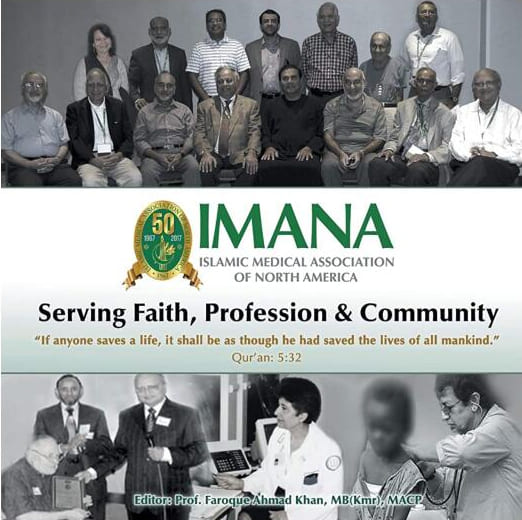
Book cover of IMANA's Serving Faith, Profession, and Community edited by Faroque A. Khan.
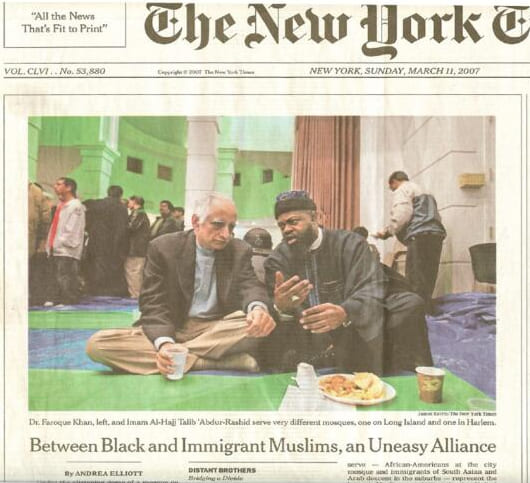
Lead article by Andrea Elliot focused on the evolving relationship/collaboration between the native American Muslims and the Immigrant Muslims.
I am writing to express my deep appreciation of Dr. Faroque A. Khan’s service as the President of the Islamic Medical Association North America (IMANA), as the president of the Board of Regents of IMANA, and as a dedicated life member of IMANA. Dr. Faroque’s leadership and dedication have been instrumental in advancing the organization's mission and making a positive impact on the community.
I have known Dr. Faroque Khan for almost 40 years since he joined the IMANA. I am very impressed with his commitment and support for the organization. With his vast experience as a professor of medicine and chairman of Medicine at Nassau University Medical Center in New York, he made a valuable contribution to the organization. He was elected as president of IMANA in 1986 for the usual one-year term. The organization was facing some unusual circumstances and with the majority opinion, his term was extended to two years. He demonstrated exceptional vision, strategic thinking, and a commitment to excellence. He worked tirelessly to ensure that the organization remained true to its core values and continued to fulfill its mission. His efforts have resulted in a significant increase in the organization's reach and impact, and he helped to establish it as a leader in its field.
I have attended several national and international meetings where he made contributions on many subjects related to medicine. He also organized a conference on “end-of-life decisions Islamic perspective” and has published many papers on that subject.
During our time together in the organization, I was consistently impressed by his dedication and commitment to the mission and goals of the organization. He brought a positive attitude and strong ethics, and his contributions were invaluable to the organization.
I was impressed with his ability to communicate effectively, and he always found a way to connect with the members and build meaningful relationships. His positive attitude and spirit of collaboration helped make the organization stronger and more effective.
Dr. Faroque’s passion for the organization's mission has inspired many, and his willingness to lead by example has set a high standard for all of us. His ability to inspire and motivate others has been vital to the organization's success, and his commitment to transparency and accountability has earned the trust and respect of all stakeholders.
He spent six years in Saudi Arabia as a senior consultant to King Fahad Medical City in Riyadh, Saudi Arabia. He helped the institution to become a landmark institute providing services, research, and teaching physicians and health professionals.
I am very impressed with his work to promote interfaith dialogue and interfaith harmony, which has resulted in the development of the Interfaith Institute of Long Island. This has resulted from his efforts, commitment, and devotion since the early ‘90s to bring Christian and Jewish Communities to the Islamic Center of Long Island, promoting harmonious relationships. This venture became of more importance to the whole country after 9/11 when there were strained relationships between the Muslim communities and people of other faiths.
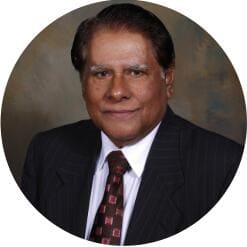
Dr. Faroque Khan is a close friend. I knew him through meetings of the Islamic Medical Association of North America (IMANA) beginning in the early 1970s where we both made presentations. We were both academicians. We enjoyed the presentations and discussing them. We have been strong supporters of IMANA. We believed that Muslim physicians, who constitute a significant percentage of US physicians and serve a significant percentage of underserved US populations, deserve to have a voice in the American medical establishment. The best way to
accomplish this is to strengthen our own organization. We also used to meet during the Islamic Society of North America (ISNA)’s annual meetings which further strengthened our relationship. Our relationship grew especially when I became the Editor-in-Chief of The Journal of Islamic Medical Association of North America (JIMA) in 1986. He supported the journal by submitting articles and encouraging his friends and students to do the same. In addition, he was active in financially supporting JIMA through ads and sponsorship by drug companies in whose medical research he was the principal investigator.
Dr. Faroque’s academic position allowed him to assist many Muslim medical students including foreign graduates to gain access to the US training programs and eventually become successful US physicians.
I retired from JIMA editorship in 2000. Dr. Faroque convinced me to resume the editorship and promised to help me which I did in 2005. He committed to publishing a book review and a life story of a contemporary Muslim physician in each issue, in addition to periodically submitting editorials and articles. He never failed in his commitment. Through Dr. Faroque’s connections in NY, he helped me to organize a symposium on “End of Life Issues” at Fordham University, NY. The speakers included Muslim, Jewish, and Catholic theologians, in addition to physicians from different specialties, and other scholars. The symposium covered many significant topics such as brain death, management of the terminally ill, and how the different faiths deal with these topics.
During his presidency from 1968-1988, IMANA’s finances were in trouble. Thanks to his love of IMANA and his visionary leadership, the crisis was averted. During his tenure at KSA, he arranged for several joint conferences. I personally participated in 2 of these, one in Madina and the other in Riyad.
Dr. Faroque edited a book about IMANA, its brief history, mission, achievements, and outlook. The book, IMANA: Serving Faith, Profession, and Community, was published in 2017 and is a great source to know about IMANA.
In addition to our shared efforts in IMANA, we shared interest in interfaith activities, and in politics.
On a personal level, Faroque is a gentle, calm, and wise person. I know from experience that, whenever a problem emerges, we could talk it over and suggest solutions to the involved parties. I know he is well-appreciated by all who know him. I greatly value his friendship. I wish him and his loving family good health and happy life. May Allah reward him for his efforts.
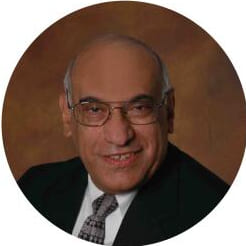
My first introduction to Dr. Faroque Khan was in 1997 when he contacted me from New York to present my paper on “Islam and Medicine” at the International Islamic Medical Association of North America (IMANA) Conference that was going to take place in Aman, Jordan. The conference was an absolute wonderful event with Dr. Faroque as an organizer and leader of the conference, making it an unforgettable experience. I consider Dr. Khan as the “light and top leader” of IMANA who led IMANA to its greatest height with scholarly activities that were beautifully executed at each conference that was planned, including the conference on “Islamic Medical Ethics” and “End of Life Issues” at Hofstra University in New York. He made IMANA the beacon of light for Islamic Medicine.
The greatest leader mobilizes others by coalescing people around a shared vision- Dr. Khan’s leadership was defined by his results and not attributes. As a leader he had a vision to take any project to its greatest height whenever the occasion demanded. Dr. Khan has held innumerable leadership roles in his career, such as Professor of Medicine for 21 years at the State University of New York, awarded the unique mastership designation by the American College of Physicians (ACP), he was elected as board of Regent of ACP and President of IMANA, and was President of the Islamic Center of Long Island in Westbury. Dr. Khan was also elected as a member of “Majlis Shura” of the Islamic Society of North America. Dr. Khan has also served on the executive board of NAACP Westbury Chapter. Dr. Khan and his wife, Dr. Arfa, have the unique honor of being two of the founding members of the Islamic Center of Long Island.
Dr. Khan also laid the foundation for the interfaith institute of he Islamic center of Long Island which is the central point for many interfaith activities over the years.
Dr. Khan’s pioneering work reached out to far away countries and nations such as King Fahd Medical City (KFMC) in Riyadh, Saudi Arabia from 2005-2011 where he established the KFMC Research Center and the first College of Physicians Medical Chapter in the Middle East. He was also a consultant to ailing H.E King Fhad at King Feisal Research Center. He had amazing accomplishments in a short period of time at the KFMC.
Dr. Faroque Khan’s medical career is star studded with many well deserved, highly prestigious awards and recognition from well recognized institutions from within the US and abroad. Dr. Khan’s outstanding work and achievements have been an inspiration to one and all. We wish Dr. Faroque Khan and his beloved family, ie. his wife Dr. Arfa Khan, his daughter Shireen, his son Arif and his daughter in law Seema, and beautiful grandchildren Hassan and Leena a lifetime of happiness, good health, good luck, peace, and prosperity as they move forward. May Allah (SWT)'s blessings be upon them eternally.
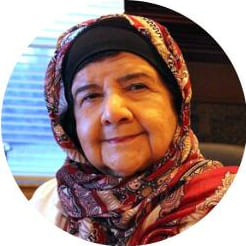
Growing up in the US as a first-generation American Muslim, it wasn’t always easy to find strong Muslim role models. It wasn’t until I joined IMANA as a second-year medical student that I got to meet some of them— these pioneering physicians who had exemplified the balance of deen and Dunya. One of those physicians is Dr. Faroque Khan. Between the student observership program with Saudi Arabian medical students, establishing connections with the American College of Physicians, authoring IMANA’s 50-year history in a published book, receiving multiple awards, elevating climate change concerns, empowering his local community for more than 40 years, and helping a junior physician understand her roots in an organization like
IMANA, Faroque uncle has been and continues to be a shining role model for the Muslim community. I’m very grateful for his foundational work and May Allah continue to bless him and his family.
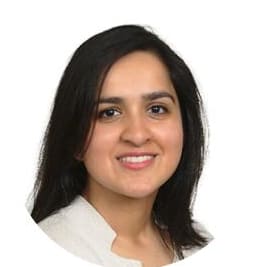
It is very difficult, if not impossible, to draw a circle around the multifaceted and multitalented Dr. Faroque Khan. Just his accomplishments in the field of medicine are breathtaking. As an academic physician/researcher, he broke new ground in his chosen field of pulmonary and critical medicine. Along the way, he rose through the ranks to become a regent of the American College of Physicians. He has also led the Islamic Medical Association as president.
Dr. Khan is a practicing Muslim and has been at the forefront of helping build the Islamic Center of Long Island that he led for many years. Realizing the religious divide between various faith, he was among the handful of Muslims who reached across the divide to find a middle ground. That culminated in the Interfaith Institute of Long Island. In the short span of a few years, the Institute has made its name as a shining example of interfaith understanding and cooperation.
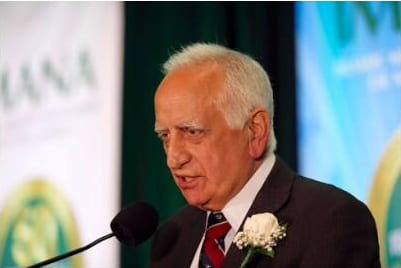
Faroque Khan at 50th anniversary of IMANA where his book Serving Faith, Profession and Community was launched.
But to talk about only the remarkable accomplishments of Faroque Khan is to neglect the man himself. To properly characterize him one must borrow from literature. Atticus Finch, the central character of Harper Lee’s classic novel To Kill A Mockingbird portrays what Faroque Khan exemplifies: empathetic, kind, non-judgmental, and treating people regardless of their social status, race, or background.
There are thousands of people that Faroque Khan has touched with his grace and kindness, including this writer. Perhaps William Wordsworth summarizes best a person like Faroque Khan: “The best portions of a good man’s life: His little, unremembered acts of kindness and of love.”
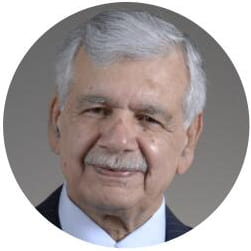
It is an honor indeed to have known Dr. Faroque Ahmad Khan for more than 40 years. I had the pleasure of working with him on the executive boards of the Islamic Medical Association of North America, the Islamic Society of North America, the Federation of Islamic Medical Associations, and several other platforms. Dr. Faroque is a man of character and integrity and works hard on the projects he gets assigned to or he elects to adopt. We have all benefitted from his wisdom and sincere contributions toward strengthening these organizations. His involvement with King Fahad Medical City in Riyadh Saudi Arabia from 2005-2011 was one the highlights of his career. He established the KF Research Center and the American College of Physicians chapter there, and Saudis loved him so much that he ended up spending six years instead of one year contract. Dr. Khan has touched the lives of many through his dedication to his profession, his commitment to helping those in need, and his advocacy for medical policies not only in the US but around the world. He always played a very constructive role with his organizational skills. He is a beacon of hope for us all and his legacy will continue to influence the lives of many for years to come. We are thankful for all the work he has done and for the example he has set for us. We wish him a long and healthy life.
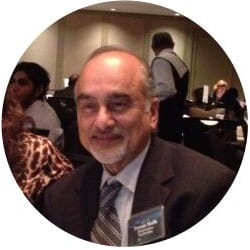
Always was the backbone of IMANA. He was the only person to become the President of IMANA for two terms in 1986 and 1987. Both Faroque and Arfa are life members of IMANA.
Coming from Kashmir Government Medical College, he went on to specialize in internal medicine and pulmonary diseases. From 1987 to 1999, he served as Chairman of the Department of Medicine at Nassau Medical University Hospital. We can give him credit for training over 350 Internists and Pulmonologists now scattered around the globe. He was a Professor of Medicine at Stony Brook and has received numerous teaching awards. Dr. Khan was the first Muslim awarded a Mastership of ACP (American College of Physicians), indeed a rear distinction. Dr. Khan steered IMANA to its present status. He served on the Board of Regents of IMANA a number of times and played a leading role in continuing Medical Education both locally and internationally. He was a key person in bringing forth to discuss difficult issues of Islamic Ethics and End of Life issues and played a key role in articles in JIMA (Journal of IMANA).
He was appointed as a Consultant to King Fahd Medical City in Riyadh, Saudi Arabia, and pioneered its Research programs and was able to establish a linkage between KFMC and many leading institutions in the USA: like NIH, Stanford, and IMANA. This was instrumental in bringing Saudi Medical Students to the USA to do observerships in IMANA Physicians' private offices. There are at least 150 medical articles to his credit.
Dr. Khan played a key role in Long Island Interfaith Relations and was the founding person of IFI (Interfaith Institute of Long Island).
It’s been a pleasure and honor to work and learn from Dr. Faroque Khan. I wish him and Dr. Arfa Khan a long healthy life. God bless you for all you have done for humanity.
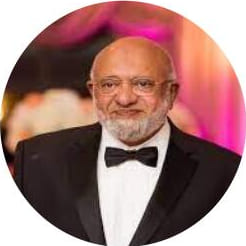
I find myself fortunate to work with Dr. Faroque Ahmad Khan. His tremendous stamina, interest, and input have been valuable to our CME committee. He helped us to achieve full commended accreditation from the ACCME. His leadership in establishing relationships with Saudi Arabia medical facilities is of tremendous value to IMANA and the participants.
His valuable insight and wisdom were fruitful when he facilitated the onsite visit of four members of the IMANA executive team to King Fahd Medical City. This effort resulted in the Saudi Medical Students Exchange program. Consequently, every year several medical students were accommodated in the United States for their training. This program helped in the education and learning of skills of Saudi graduates.
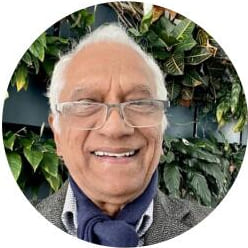
I met Faroque thanks to his spouse Arfa, a great radiologist in my field as she invited me to give lectures at her institution in 1986. I was struck by their kindness and while Faroque was chief of the Department of Medicine, I was immediately struck by his dedication to the wider community around him and attachment to his roots in Kashmir. With his gentle, affable manner and hospitality, we became friends and I understood his exceptional nature. Over the years, we remained connected and I was privileged to be invited again during my tenure as director of the National Institutes of Health of the United States this time to meet his Muslim community and to support his efforts at linking with other religious communities in a positive and constructive way to increase mutual understanding so much needed in those challenging times to the present. His continued commitment to advancing medical sciences worldwide was again demonstrated when he assumed responsibilities in Saudi Arabia to advance medical research there.
Humanity is blessed to have benefited so much from Faroque ́s compassionate leadership in times when the world is in dire need of such a legacy.
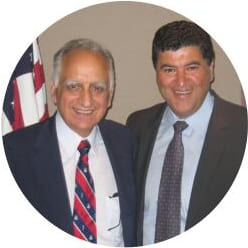
Dr. Faroque Khan and Dr. Elias Zerhouni at NIH in 2007 after concluding an agreement between NIH and King Fahd Medical City in Riyadh, Saudi Arabia.
We are so happy and excited to hear about this event honoring your lifelong work. We are so grateful to Allah SWT for connecting us with you. We feel so blessed to know you for so many years and to work with you so closely at ISNA. You are an inspiration to so many of us.
We look up to you for your leadership and for your pioneering inter-religious and interfaith work. You have been a blessing to our community. May Allah SWT accept your sincere efforts and continue to shower his special blessings and mercy on you and your whole family.
With sincere salaams and fervent prayers.
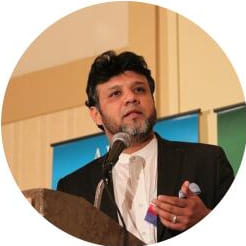
I would like to express sincere appreciation, from myself and on behalf of all the supporters of the Islamic Society of North America (ISNA), for your years of giving of your time, energy, ideas, and wealth to this organization. We pray Allah SWT will bless you for your dedication and service, and Allah is the Most Gracious.
It takes the efforts and contributions of all of us to successfully fulfill out goals of improving the quality of life of Muslims in North America, indeed of all people. I personally am deeply grateful for your sound advice and brotherhood these past years.
With deepest regards and Salams.
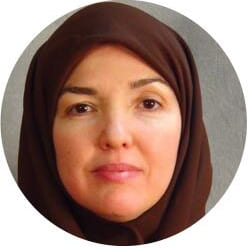

 - Eric Hamza Byas-67.jpg)
The purpose of the AFK Foundation is to provide humanitarian, charitable, and relief work to people in need. To assist poor, needy, and underprivileged youth with financial assistance and scholarships. These services will be provided irrespective of race, religion, ethnicity, or creed.
Over the past 26 years, the AFK Foundation has provided these services with a particular focus on Kashmir. Since September 2009, each year, ten to fifteen nursing students from Bibi Halima Nursing College in Kashmir have hands-on three-month training at King Fahd Medical City in Riyadh/KSA. AFK, with generous support from donors, provides transportation from Kashmir to Riyadh, Kashmir, and other incidentals. KFMC provides housing/training.
The average cost per trainee is $750-$800 and the total cost of the project for 90+ trainees is approximately $70,000 to over $70,000. Sadly, the program was stopped due to COVID-19 restrictions.
Attached are a few comments from BHNC trainees after spending three months at KFMC:
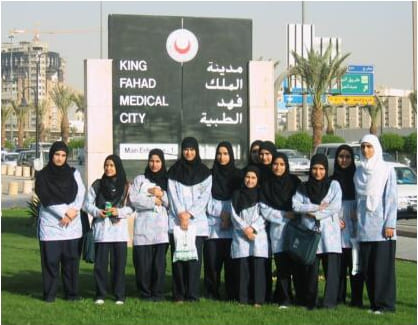
Images of BHNC trainees.
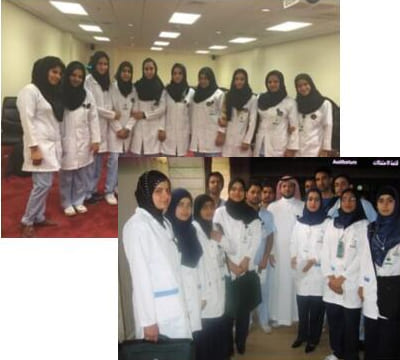
BHNC trainees at the King Fahad Medical City.
Currently, in 2023, the AFK supports the following students: 1. FB— The postgraduate university of Duluth pursuing Masters in Environmental Exploration 2. IA– University at Buffalo pursuing Masters in Urban Planning 3. SB– University of London, UK, pursuing Masters in Public Policy, Finance, and Management 4. QB– University of London, UK, pursuing Masters in Cultural Curation 5. MKA—Bishek, Krygstan as a 4th year medical student. Plans are currently in place to further expand the outreach and programs of the AFK Foundation Inc. AFK support for US-based NGOs: Kashmir Education Initiative and Chinar are highlighted in the reports from Yunus Fazili and Irfan Shahmiri and the impact of the AFK foundation on educational and health care is summarized in the report from Professor Ghulam Malik from Kashmir.
“A good teacher is like a candle— it consumes itself to light the way for others.” - Mustafa Kemal Ata Turk
Dr. Khan, a luminary, an icon, has served as a founder, supporter, visionary leader, and mentor to a host of charitable organizations operating in various domains. While his financial largesse and resourcefulness have been immense, it is my conviction that his most important contribution to philanthropy has been sculpting the souls and minds of those whose lives he has touched by ensuring that they endeavor to make this world a better place. Given the imprint that he has left on their lives, it is no coincidence that his students and mentees have founded and marshaled many philanthropic organizations here and abroad.
I serve as the President of the Kashmir Education Initiative (KEI), a US-based non-profit organization, that provides access to education to a thousand, bright but underprivileged children, in Kashmir, India. Right from our humble beginnings in 2008 where we supported 11 children, till today, Dr. Khan’s contributions to KEI have been immense. As a highly talented physician and a thought leader in the field of medicine, his contributions to inspiring, educating, and training generations of young physicians are very well known. Notwithstanding his immense contributions in the area of Medical Science, his contributions to organizations like KEI are, perhaps, noteworthy. From our inception, he has served as a champion supporter of our mission, by providing:
His unmatched ability to inspire and connect people across the cultural, religious, and geographic spectra has implied that he has facilitated our growth by spreading our message far and wide across his network over the years. Financial support from luminaries like Dr. Khan has allowed us to grant 7000+ scholarships over the years and provide access to education to almost 2000 scholars since inception. His and Dr. Arfa’s pioneering efforts in establishing a Named Scholarship for higher education in areas like Anthropology, Art, Journalism, Languages, and Law have allowed the organization to promote scholarship in areas outside its traditional domain. However, the greatest testament to his imprint is that this organization has always endeavored to inculcate the same values and spirit of leadership in our scholars in the same manner as he did in our past Presidents and Board Members when they learned under his able tutelage as his students years ago. To him, we owe our entire paradigm!
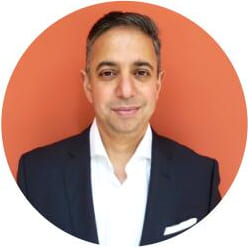
Dr. Faroque Khan, individually and via the AFK Foundation, has helped medical education in Kashmir through conferences, Continuing Medical Education workshops, and access to USA fellowships, training, and jobs. Professors Faroque and Arfa Khan, and their team, are the first batch MBBS Alumni of GMC Srinagar and the leading Kashmiri physicians in the world.
Dr. Faroque Khan helped guide many doctors in Kashmir, as well as those in the USA fulfill their potential and achieve national and international recognition. Dr. Khan takes great pride in the accomplishments of his trainees both from Kashmir and from around the world. Over 350 trainees at NUMC graduated from the NUMC during Dr. Khan’s twelve-year tenure as chair of Medicine from 1987-1999. God bless him and his Foundation team.
Dr. Malik tries to follow Dr. Khan as his academic social guru in Kashmir. Dr. Malik established the 28-year-old JK Practitioner, got Kashmir on the World Medical Map, and established a 4 story guest house cum auditorium with Kashmir IMA offices from voluntary donation, along with facilities for CME conferences at GMC Hostel Bemina Srinagar: www.kashmirimahouse.org. More photos are available in www.jkpractitioner.com issues and GM Malik’s Facebook.
Life was tough, there was, pain, killing, and, scare all around Kashmir in the ’90s. For those of us studying medicine, there was double trouble. Healthcare was gasping, Government Medical College Srinagar was just surviving... While I was remembering, recollecting, and rehearsing the difficult chapters of medicine and surgery-death, destruction and pain were too conspicuous to be missed. I wanted to write about the sorry state of affairs here and express my views about the ongoing pain.
essay on any aspect of healthcare in Kashmir was desired by AFK (Arfa and Faroque Khan) Foundation USA. I wrote my essay— a sentimental one about the plunder of healthcare in Kashmir amidst turmoil and highlighted the agony of Kashmiri patients. One day, I was informed that my essay titled “Kashmiri patients— innocent or ignorant” had won AFK sponsored Dr. Ghulam Rasool Memorial Award. I attended the award ceremony; an immaculately dressed gentleman with a clear voice gave “Dr. Ghulam Rasool Memorial Oration”. I was called to the stage, praised for my essay, and presented a cheque for $75. Someone had read my essay, appreciated my views, and encouraged me. The man was Dr. Faroque Khan who helped me to pen my thoughts and honored my work. With this award, hitherto, clogged— my mind started opening. I rejoiced as my essays were adjured the best by the AFK foundation for three consecutive years. I had found an outlet; my thoughts had found a channel. After this opening, I won almost every competition that I participated in. I wrote regularly in local dailies on varied topics though primarily focusing on healthcare. After a few years, I wrote a book titled White Man in Dark, purging out my experience as a doctor and a medical student studying medicine in the worst phase of Kashmir’s history. Dr. Faroque purchased 100 copies of my book, distributing them for free amongst non-resident Kashmiri doctors. The book reached where our voice would never reach!
Next, I realized not much was written about Kashmiri doctors of yore or present who had contributed to healthcare in Kashmir or abroad. I wanted to collect their inspiring stories and write about them. I shared my idea with Dr.Faroque Khan; he endorsed my idea and agreed to be the co-author. He collected the stories of some of his colleagues from Kashmir who were working in the US and contributed to the book titled Warriors and Falcons. I struggled to collect nearly 80 more stories. It was a difficult task but he encouraged me to continue and actually would skillfully remind me of my goal... After 6 years of struggle and hard work, the book was completed and will be published soon. I need to thank the trustee of AFK Foundation, Dr.Faroque A Khan, who recognized a non-entity and transformed me into a writer.
I have been aware of Dr. Faroque Khan since my childhood, but it wasn't until 2014 that I truly got to know him. Growing up with Dr. Khan’s nephews in Kashmir in the ‘70s and ‘80s, I often heard stories about this larger-than-life person who lived in the USA and was known as Faroque Chacha (Chacha meaning uncle). When I moved to Florida in 1990, I became more aware of his inspiring work, as he was helping young doctors in Nassau County, New York.
It wasn't until much later, when I co-founded CHINAR International for children and youth in Kashmir in the early 2000s, that I finally met Dr. Khan. In 2014, when devastating floods hit Kashmir, I was leading CHINAR's disaster relief efforts, and Dr. Khan came to Kashmir to offer his support. This is when our relationship truly began.
Over the years, Dr. Khan has been a tremendous help not only to CHINAR, but all NGOs focused on Kashmir. He has been loving, kind, passionate, objective, and neutral in his support, tirelessly raising funds and opening doors for us. To me, Faroque Chacha is more than a larger-than-life figure; he is a humanitarian par excellence and a true legend.
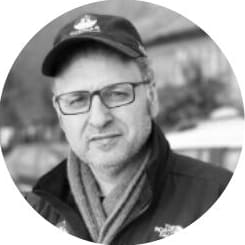
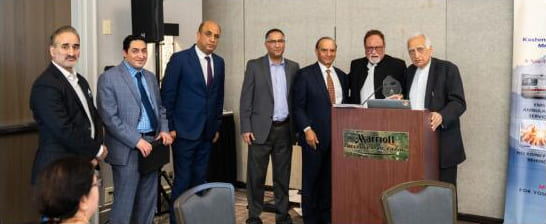
I’m Fouzia Bhat, from Kashmir pursuing a graduate degree in Outdoor Environmental Education at the University of Duluth, MN. Dr. Khan and the AFK Foundation have been supporting my education and I express my sincere gratitude for the financial support the AFK Foundation provided me with to help pay for my tuition. This generosity has allowed me to continue pursuing my academic goals and has made a significant difference in my life. I have been able to focus on my studies without the added stress of worrying about how I would pay for my tuition fees. It has also enabled me to access resources and opportunities that I may not have been able to otherwise. This has allowed me to grow as an individual and develop the skills I need to succeed in my academic and professional endeavors. While studying Outdoor Environmental Education, I have had access to resources and opportunities that were previously unavailable to me. This included my observation time for a full semester at a nature preschool to have a hands-on experience with my class work. Studying Outdoor Environmental Education has a significant impact on the environment and communities by promoting sustainability and conservation efforts. By supporting my education in this field, Dr. Khan is also contributing to the overall well-being of the environment and society. I hope to return to Kashmir and use my knowledge and skills for the community in general and women in particular.
Thanking the AFK Foundation for their kindness and generosity. I will always be grateful for their ongoing support and will strive to make a positive impact in the world as I continue on my academic and professional journey.
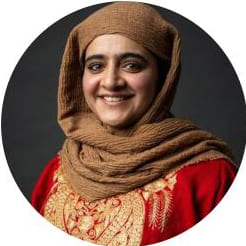
 - Eric Hamza Byas-74.jpg)
 - Eric Hamza Byas-75.jpg)
ACP is the premier organization for all internists and medical sub-specialists. My first experience with ACP in late 1970s was disappointing in that my application for Fellowship in ACP was REJECTED, even though I thought I had met all the required criteria for FACP including having a faculty position at Stony Brook, I had published several articles and held an administrative position. No reason for the rejection was provided.
Fast forward a few years and I was visited by the governor of the New York State chapter Dr. Eleanor Wallace at my office in Nassau County Medical Center. Dr Wallace shared with me her concerns about the complaints from International Medical Graduates (IMG) who were complaining about discrimination in hospital jobs, assignments, and promotions. Dr Wallace went on to say: “Faroque as a prominent IMG chair of medicine at NUMC kindly get together some folks and give me some recommendations of how to address this issue, she went on to add the caveat the ACP local chapter was unable to provide budget support".
I put together a team of co-chairs and program directors from the NY area and also consulted with some key foreign graduates who were in training and together, we formulated and prepared a book titled: International Medical Graduates in U.S Hospitals—A guide for Program Directors and Applicants—published in 1995 by the American College of Physicians.
After that, I was nominated to run for a Regent of American College of Physicians, a highly prestigious position with about 24 individuals from across the country, basically setting the tone and governance of this major internal medicine organization. I served in this prestigious impactful position
from 1995—2001. I got elected as the first Muslim Regent of American College of Physicians. At the first meeting of the Regents of the ACP on the 9th floor of the imposing headquarter of ACP in Philadelphia, we were presented a report about a recent the conference held by ACP in China which was a total flop both in numbers as well as in finances. ACP I felt was a bit hesitant on embarking on future overseas programs and initiatives.
I requested the Regents to give me permission to conduct a meeting in an international arena, that I will need no funds and the only thing I need is the support of the ACP headquarter with publicity. The board gave me the green light. I organized a meeting in Amman Jordan in consultation with the Jordanian Faculty of Medicine and the Islamic Medical Association of North America of which I was a executive committee member and the American College of physicians, we put together a program in Amman where over 600 people showed up. Yes, that's correct:
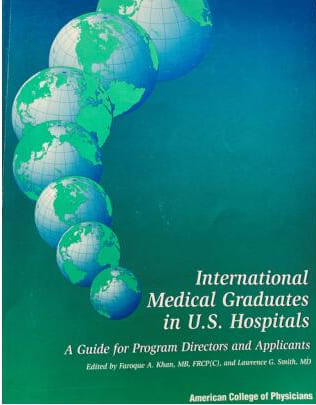
Shot of ACP book cover: International Medical Graduates in U.S. Hospitals- A Guide for Program Directors and Applicants.
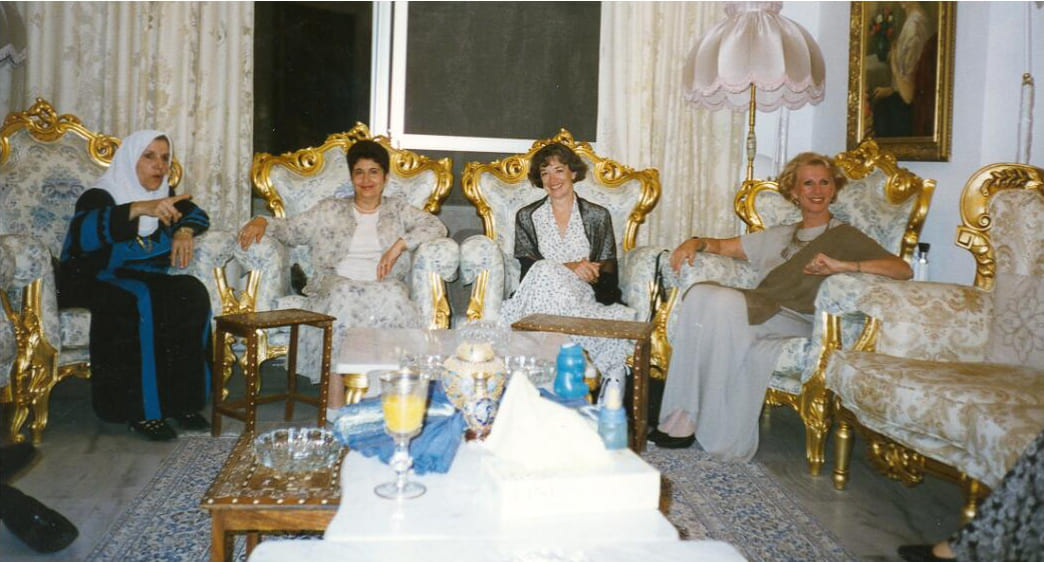
ACP CEO Dr. Walter McDonald and Regent John Noble and spouses interacting with the local meeting hosts Dr. Naif Sliman and Hassan Mousli. Also seen in the picture is Dr. Arfa Khan.

over 600 attendees, we ran out of hotel rooms, it was an overflow overflow crowd, and the icing on the cake was that several of the ACP national leaders also came to the meeting. When I returned back to New York and attended the Regent board meeting, I presented a copy of the check showing the profit for the ACP, so here we were, when we were actually had exposed ACP to over 600 new physicians, run a top notch CME course in Amman, Jordan and turned the profit in the process. So, I think this meeting kind of paved the way for the ACP to pay closer attention to the potential for expanding its base of international medical graduates both in USA and globally.
In late 90’s, I had to visit Jeddah for a family wedding, and in my capacity as the Regent of the college, I sent a note to all the members of the ACP in Jeddah if they would like to meet with me and share their issues and concerns about ACP. Luckily, professor Mohammad Al Hadramy, a senior faculty member at King Abdulaziz University a senior faculty member at King Abdulaziz University and I had a lovely conversation. We exchanged ideas of how we could develop relationship which would be mutually beneficial for ACP and Saudi Arabia. Soon, a request came from Dr. Hadramy for joint medical meeting with ACP. This led to a unique meeting in Jeddah attracting over 500 people and kind of cementing the name of American College of Physicians in that part of the world. Soon after that, one thing led to another, I was called to consult on a very prominent patient in Saudi Arabia. During that visit, I was approached by Dr. Abdullah al Amro, who was the CEO of a new newly established King Fahad Medical City (KFMC) in Riyadh. Dr. Amro invited me to join his team as he was developing the policies, procedures, and programs for this mega medical center and initiating a new research center for KFMC which had over thousand beds and four hospitals and a medical school. I agreed to come for a year however ended up staying six years, and what we did there was amazing and it's summarized very nicely in the accompanying write up by professor Omar Hassan Kasule who is still at KFMC. Drs. Khalid Qushmaq, Walid Hassan, Saima Chaudhry, Mahmoud Al Jurf provide additional insights of the work and impact at KFMC from 2005-2011. The take home lesson from this experience which spans of twenty plus years is that personal contacts and personal interaction makes all the difference in the world and earning the trust of the hosts in Saudi Arabia and then convincing the leadership of ACP that there was much to be gained by joining and expanding ACP presence in that part of the world was the take home message. The crowning accomplishment was when we launched the first overseas chapter of ACP in Saudi Arabia in 2011. This chapter is now thriving and has almost doubled and tripled its membership since it was started in 2011. That summarizes my experience in Amman with the mega conference in 1996 and then the many projects initiated in Saudi Arabia from 2005-2011.
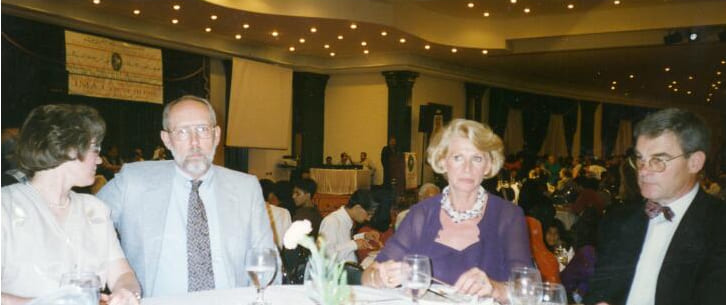
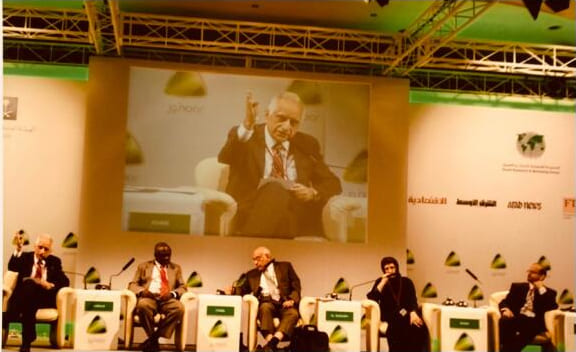
All this transpired following the task assigned to me by late Dr. Eleanor Wallace, ACP governor who was considered with the prevalent IMG discrimination in NY. I accepted the assignment, completed the task, which led to publication of the IMG book, followed by awarding of Mastership by ACP to me and then getting elected to be a Regent of the college.
All this happened to Dr. Faroque A. Khan who’s initial application for Fellowship in ACP was rejected in the '70s and then got elected Reagent in 1995.
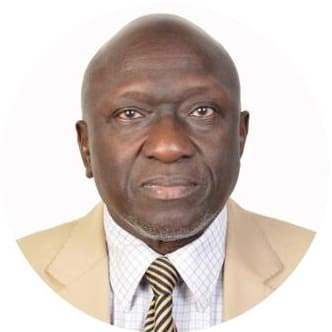
Professor Faroque Khan was invited to Saudi Arabia in 2005 as a specialist consultant on an important patient. His hosts were so impressed they asked him to stay which was an excellent decision for Saudi Arabia because over a period of 6 years, he made tremendous contributions to medicine in the country. Based at King Fahad Medical City (KFMC), Professor Faroque founded the Research Center which became a major clinical research organ under his stewardship. He then founded the Institutional Review Board (IRB) that was among the first of its kind in Saudi Arabia. It became a model for other hospitals and universities. KFMC benefitted a lot from Prof. Faroque’s extensive management experience. He established the bye laws and advised all departments on planning and executing programs. He was an advisor to the Chief Executive Officer on a daily basis and all other top administrators sought his guidance. He alone was responsible for specialist physician recruitment from all over the world to come and work at KFMC. A major achievement that is still remembered today was inviting Dr. Elias Zerhouni, director of NIH, who was very inspirational.
Professor Faroque Khan was invited to Saudi Arabia in 2005 as a specialist consultant on an important patient. His hosts were so impressed they asked him to stay which was an excellent decision for Saudi Arabia because over a period of 6 years, he made tremendous contributions to medicine in the country. Based at King Fahad Medical City (KFMC), Professor Faroque founded the Research Center which became a major clinical research organ under his stewardship. He then founded the Institutional Review Board (IRB) that was among the first of its kind in Saudi Arabia. It became a model for other hospitals and universities. KFMC benefitted a lot from Prof. Faroque’s extensive management experience. He established the bye laws and advised all departments on planning and executing programs. He was an advisor to the Chief Executive Officer on a daily basis and all other top administrators sought his guidance. He alone was responsible for specialist physician recruitment from all over the world to come and work at KFMC. A major achievement that is still remembered today was inviting Dr. Elias Zerhouni, director of NIH, who was very inspirational. Professor Faroque Khan was a great support to the newly established faculty of medicine where he taught and worked on developing academic programs. The crowning achievement of Professor Faroque’s career in Saudi Arabia was the founding of the Saudi Chapter of the American College of Physicians which is still active to date. This is one of the few chapters outside the U.S. At last, Saudi medicine had reached a level of international recognition. Even after leaving KFMC in 2011, Professor Faroque continued being invited to Saudi Arabia almost every year as a consultant on on-going projects and as a trouble shooter for emergingproblems.
During his stay in Saudi Arabia, Professor Faroque made contributions that were two-way benefitting Saudi Arabia and other countries. One of these was bringing Kashmiri nurses to train at KFMC for a period of three months. They exposed their Saudi counterparts to foreign experiences while they themselves got to learn about the practice at KFMC. This exercise carried out over a period of several years was mutually beneficial and provided a model of medical cooperation that can be emulated.
On a personal level, Professor Faroque was a father figure in KFMC who guided and mentored hundreds of young physicians, both Saudi and non- Saudi. He encouraged and inspired many who look up to him as a mentor and teacher. He had a pleasant personality and interacted easily with physicians and nurses from all parts of the world. He played an important role in encouraging inter cultural understanding between different nationalities and ethnicities since he was friendly and close to all.
Dr. Faroque Khan is a living legend, who is adept and comfortable in numerous leadership roles that have come to define his life, as his towering humanity. For almost six decades, he has followed the noble example of his ancestors, adding value to the community he called home. As a Muslim, he modeled his faith to the benefit of neighbors, and as a physician, he sculpted his calling in the service of humanity. He excelled in all arenas because he remained true to himself, his family, his friends, and strangers.
The American College of Physicians (ACP), the largest medical specialty organization in the United States, honored him as the first Muslim “Master”, and Regent of the College, for his exemplary services as an International Medical Graduate (IMG), to the cause of medicine through the elevation of the importance of IMGs in the United States, and indeed, worldwide. He helped merge the shared ambitions and aspirations of IMGs and US medical graduates for easing the attainment of their mutual goal of service to humanity, and for that, he will always be reverently and fondly remembered.
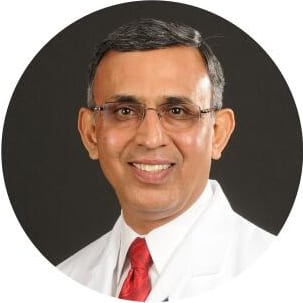
I have fond memories of working with Dr. Khan at KFMC in 2010-2011. My involvement at KFMC began when Dr. Khan, always thinking of new ways to bring value to healthcare and his community, reached out to enlist my help in faculty development for the teaching faculty at KFMC. I had recently completed a train the trainer course at Stanford University on “Improving Your Clinical Teaching Skills”, a course aimed at helping clinical faculty become better teachers. After some brainstorming and planning, we decided that I would join Dr. Khan at KFMC, along with Dr. Kelley Skeff and Georgetta Stretos from Stanford, and run the course for the teaching faculty of KFMC. Before long, we were on our way to Saudi. Dr. Khan welcomed us with open arms, helped us prepare and plan our course, and ensured active participation by all faculty. We toured the amazing facilities and I personally was hosted by Dr. Khan and his son at their residence, a true treat. Dr. Khan was the ever present moderator, facilitator, and take charge organizer, qualities that I had seen many times previously in Long Island, now on full display at KFMC. He played a major role in coordinating the event, something he has done hundreds of times in all kinds of professional endeavors in NY. Without his leadership skills, our course would not have been successful. I can honestly say that Dr. Khan deserves all the accolades that would be due to a genuinely caring, proactive, committed, and collaborative leader that he is. Long Island, NY, and Saudi owe him a debt of gratitude that can never really be repaid. I too owe Dr. Khan a debt of gratitude for his kindness and mentorship for the years that I have known and worked with him both in healthcare and in religion. He is a true role model for all.
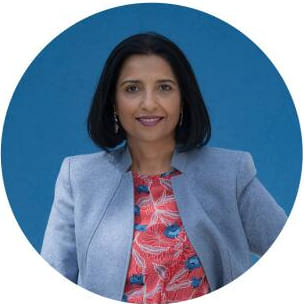
It was great meeting you in Saudia Arabia during your visit as a Regent of the American College of Physicians (ACP) in the late '90s. I remember when you introduced the ideas of cooperation with the ACP, and facilitated with us the Organization of the 1st joint medical conference in Jeddah, which was attended by more than 500 attendants, and was a great success. You continued your hard work which resulted in establishing an ACP chapter in the kingdom in 2011. We were motivated by your friendly approach, and benefitted from your extensive connections in the USA.
You have shown us how a dedicated and talented Muslim can make his way in a new country, and gain the trust and appreciation of everybody. We cannot thank you enough. I pray to ALLAH to grant you full health and complete cure from your illness.
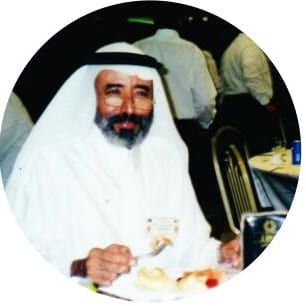
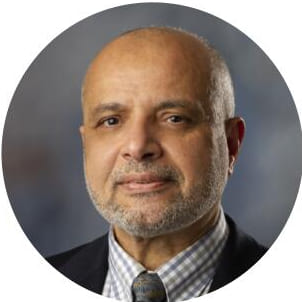
Dr. Faroque Khan worked for six years (2005-2011) as a Senior Consultant and also as an advisor to the CEO at the King Fahad Medical City (KFMC) in Riyadh, Saudi Arabia. He made an exceptional contribution within this relatively limited time including the establishment of KFMC's Research Center, the establishment of American College of Physicians (ACP) chapter in Saudi Arabia, hosting and sponsoring nursing students from BHNC in Kashmir (almost a hundred of them benefitted from this unique exposure), and inviting and hosting Dr. Elias Zerhouni, the Director of NIH, and many other leading academicians from the USA to KFMC. His contributions extended beyond KFMC at both national and regional level. He conducted several national/regional meetings in partnership with the ACP. He provided courtesy input for several national and regional medical schools in a spectrum of fields including, but not limited to, suggestions for curriculum, medical, and clinical education and research. His engagement with some medical school continued for many years after he left and moved back to the USA. He was strong committed partner with the medical schools at King Abdul-Aziz University, Alfaisal University and Almajmaa University and obviously, the medical school at KFMC. He initiated the Riyadh monthly academic evening in partnership with ACP. One other important notable contribution is the Journalism Workshop that he conducted with the ACP and Chief Editor for Annals of Internal Medicine.
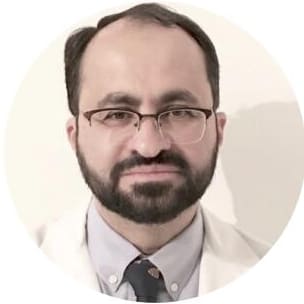
It was a lunch meeting with Professor Khan that ignited a long term relation with a senior internist and pulmonologist and a young chairman, me, establishing the department of medicine at King Fahad Medical City in Riyadh, Saudi Arabia in 2005 when Professor Faroque Khan was visiting as advisor to the CEO, and working with him closely on many tasks.
I had a dream of building international collaboration for internal medicine for my newly evolving department at King Fahd Medical City (KFMC). Professor Khan suggested working towards creating a new ACP chapter in Saudi Arabia would be a goal to aspire for and would greatly help in building bridges between Saudi Arabia and the USA. The requirements for new ACP chapter formation were formidable. We worked with Dr. Khan in creating opportunities for young physicians to train in the U.S., and through his support and advice, ACP Saudi Chapter was successfully established and hosted a delegation from ACP including the president, chair of the board of regents board and support staff. We made history in KSA (see picture above). Dr. Khan continued his support of the newly formed ACP chapter, attended chapter receptions during ACP annual meetings and I had the pleasure to work with him in the ACP international committee, and I learned a lot from him during these activities.
I had the chance to visit New York and visit the Islamic Center, and witness the effort of Professor Khan in upgrading the community service and make the center modern and comfortable for worship.
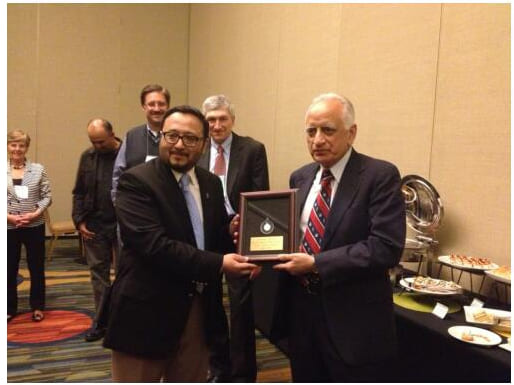
ACP Governor Dr. Khalid Qushmaq presenting Dr. Faroque Khan the Saudi ACP chapter award.
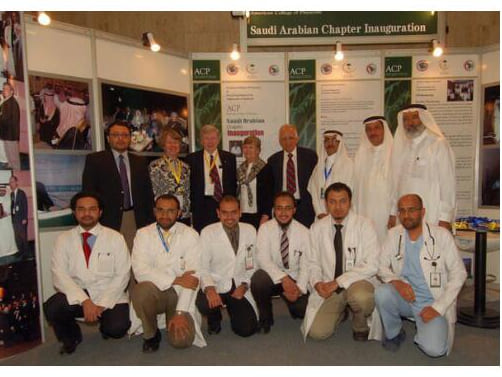
Launch of the ACP chapter in Saudi Arabia.
“No one is born hating a person— People must learn to hate and if they can be taught to hate, they can be taught to love, love comes more naturally to the human heart” - Nelson Mandela.
I was born and educated in Kashmir, a Muslim-majority state. My early education was in a private Christian school managed by Irish nuns, and I had friends who were Hindus, Jains, and Sikhs. In essence, I grew up in a multicultural multi-religious environment.
After arriving in the USA on Memorial Day 1966, Arfa, my wife, and I quickly realized that we were in a very small minority as Muslims in the USA. Our children, Arif and Shireen, were perhaps the only Muslim kids in Jericho school. To maintain our religious identity, we, along with a few other Muslim friends, helped establish the ICLI which was formally inaugurated in 1984.
As we became involved in the activities of the Muslim community, a few events helped in launching our interest and enthusiasm for interfaith outreach. Below are some key events in the 30+ years of this journey:
Mid-'80s:I, along with the late Professor Roger Bone, Dean of Rush Medical College, were attending an update on Pulmonary Medicine in Amman, Jordan. As Roger was observing and watching the Muslims, he asked me: “Do Muslims believe in Jesus Christ?”. I thought to myself that if Dr. Bone, one of the premier educators and an American dean has such limited knowledge regarding Islam and Muslims, what about the average guy? So, I needed to do something to educate my fellow citizens. Quranic verses 5:82, 3:45, 2:62, and 3:42 clearly highlight the status of Prophet Jesus and the status of his mother, Mary. In fact, chapter 19 in the Quran has titled Mary and describes the miraculous birth of Prophet Jesus. He and his teachings are mentioned in 11 chapters of the Quran (out of 114 chapters), and his unique attributes rank him as one of the five great prophets for Muslims along with prophets Noah, Abraham, Moses, and Mohammad (Peace be upon all of them).
January 1992:The ICLI office received an inquiry from Temple Beth El in Great Neck inquiring about the presence of Muslims on LI and if there was an interest in a dialogue between Jews and Muslims. The late Ghazi Khankan and I went to the Temple and met with Rabbi Jerome Davidson and Ms. Bobby Rosenzweig. Thus began the long-standing conversation between the Jews and Muslims titled American Muslims and Jews in Dialogue (AMJID), whose details are in chapter 6 of the book: Story of a Mosque in America which I wrote and published in March 2001. Also, the eloquent report from the co-founder Rabbi Jerome Davidson summarizes the initiation and highlights of AMJID.
Post 9/11:Sadly, this terrorist event was a negative introduction for Muslims to our American community in the USA. Monsignor Thomas Hartman, the CEO of the Telecare TV channel in a public forum said: “The news media is not talking about the Muslims I know and respect”. May Allah bless Father Tom. We met with him and his staff which led to 20 half-hour programs over a period of two years on Telecare with Father Tom and Rabbi Marc Gellman acting as the hosts for this much-needed and appreciated program titled Our Muslim Neighbors. These programs are available on the ICLI website at www.icliny.com. Some of the topics discussed includes: Visit to the Mosque, Women in Islam, Hajj, Prophet Muhammad, Ramadan, Holy Quran, Muslims Serving the Community, Growing up Muslim in America, The Muslim Life Cycle, Prophets in Islam-Noah, Abraham, Moses, and Jesus, Muslim Experience on College Campus, The Sunni and Shia’s, Sharia, and Frequently Asked Questions.
2013 Summer:My neighbor and IFI board member, Robert De Sena, wanted to know if ISIS represented Islam and why were they murdering, beheading Christians and Journalists, etc. I shared with Bob the results of my research, the teachings of our Prophet (PBUH), the guidelines in the Quran regarding Muslim conduct during conflicts, and clearly, the actions of ISIS were NOT representing our faith. Gary Krupp in the Pave The Way Foundation (PTWF) distributed my analysis regarding ISIS in the PTWF newsletter titled: “Muslims and Religious Tolerance”.
Conclusion:As the Islamic Center of Long Island's spokesperson post-9/11, I was actively sharing our beliefs in public forums. We thought having an organized approach would help enhance make our outreach more effective. The ICLI board of trustees was receptive to the formation of the Interfaith Institute at ICLI.
I shared this idea with the late Rev Dr. Calvin Butts, President of the State University of New York at Old Westbury. He was supportive and enthusiastic and accepted my invitation to be on the board of the institute. After that auspicious grand start, we approached key members from clergy, education, social, and religious backgrounds and assembled the board of directors. During this time, we managed to host a few programs and conferences some of which are highlighted elsewhere in the journal.
Looking ahead, I would like this institute to be a safe space where an open dialogue would be welcome, where we would learn from one another, improve our inter-religious understanding, dispel stereotypes and misconceptions, address issues of injustice, anti-Semitism, islamophobia, fundamentalism, intolerance, and hopefully go beyond tolerance. An ambitious agenda that will serve as a guideline as we plan programs for the institute in the coming years. Using a quote from Rabbi Davidson’s write-up—“When we do not talk to each other. We end up inventing each other”.
We hope and pray that this humble effort will bear fruit and that our children and grandchildren will live in a peaceful cohesive welcoming society, something that I experienced growing up in Kashmir. The Interfaith Institute board members have shared their thoughts which are reproduced in this section. After reading them, the reader will get a better appreciation of the impact and cohesiveness of IFI. My deep gratitude to all the board members who have provided great ideas and made it possible for IFI to develop an outreach with some great programs and samples of a few programs which are enclosed in this section.
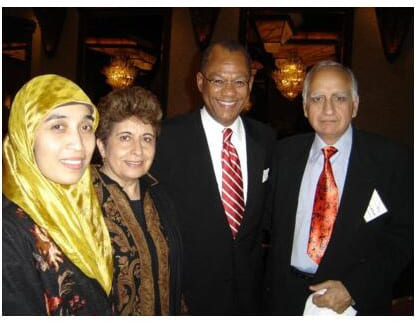
From left to right: Sister Kiki Byas, Arfa Khan, late Rev Calvin Butts, and Dr. Faroque Khan at an IFI award event.
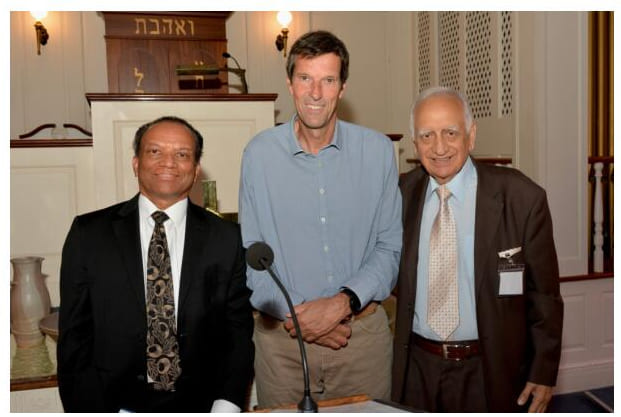
Awardee Pierre Pirard with IFI President Unni Mooppan and Chairman Faroque Khan at the Annual IFI Award Event 2022.
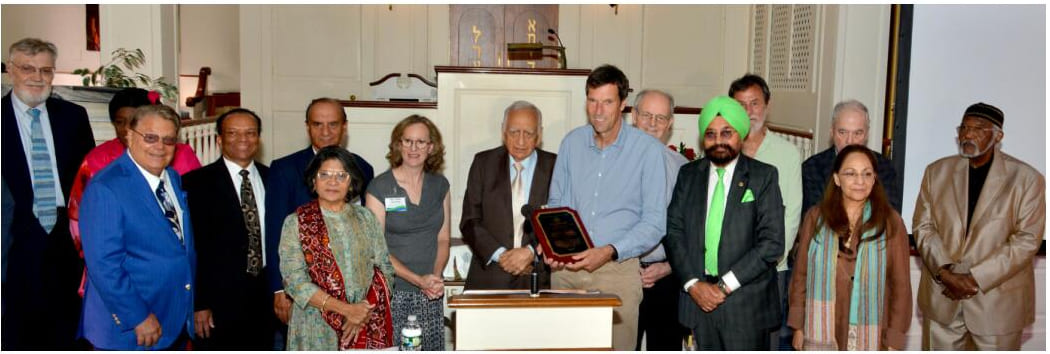
IFI board members with the awardee Pierre Pirard at the Annual IFII Award Event 2022.
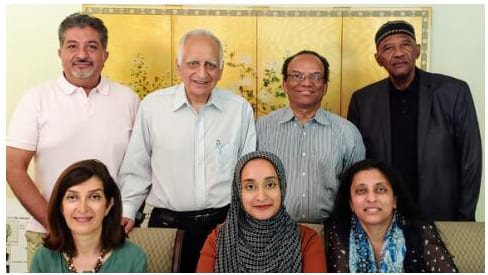
IFI executive committee: From left to right, seated: Marjaneh Issapour, Sahar Hussain, and Seema Rahman. Standing: Sohail Nabi, Faroque Khan, Unni Mooppan, and Khalid S Lateef.
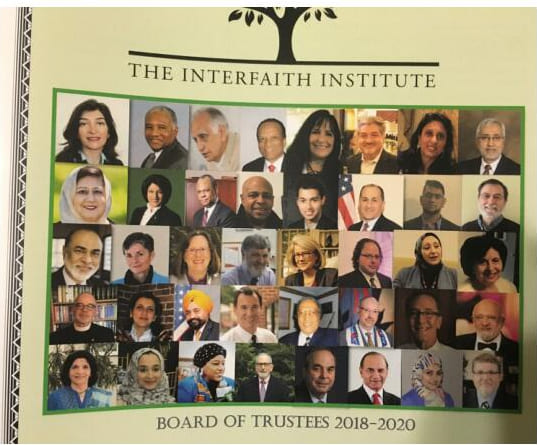
IFI Board of Trustees from the years 2018-2020.
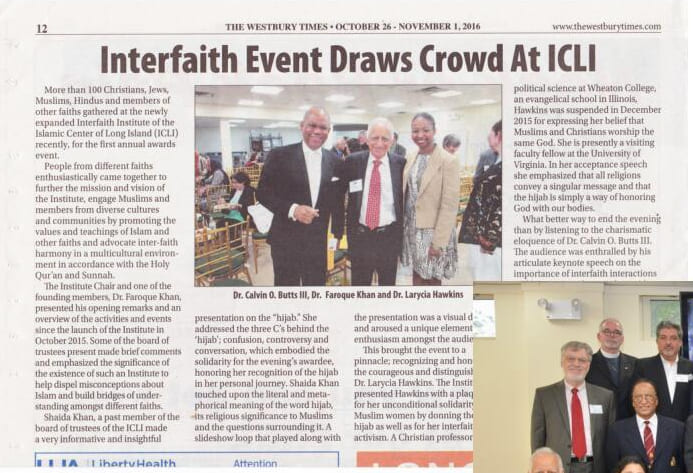
Article published by The Westbury Times in 2016.
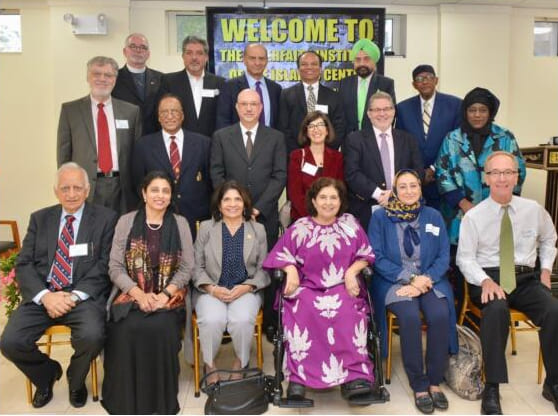
IFI Board: Seated left to right: Faroque Khan, Seema Rahman, Panna Shah, Arfa Khan, Sanaa Nadim, & Dwight Wolter; standing first row left to right: Tom Goodhue, Yousuf Syed, Michael White, Marjaneh Issapour, & Ben Rifkin, & Zainab Bey; standing back row left to right: Mark lukens, Sohail Nabi, Farooq Kathwari, Unni Mooppan, Sant Singh Parhar, & Khalid Lateef.

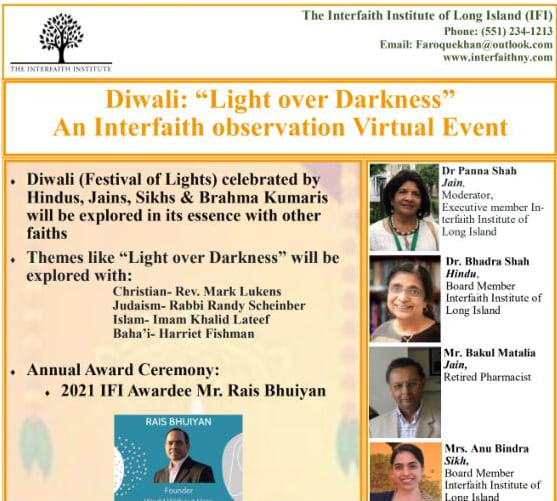
Events held by IFI over the years.
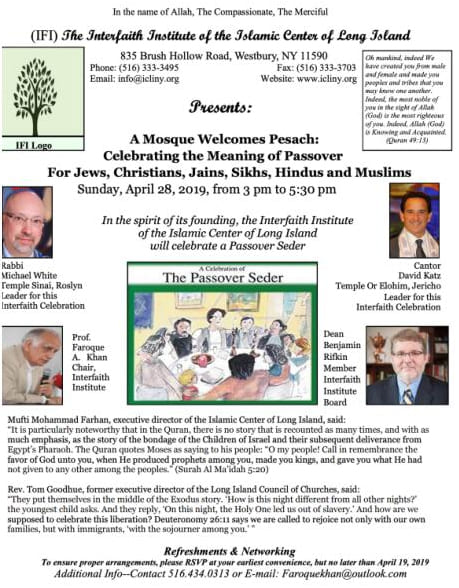
I am not a Clergy, a Priest, or a person who holds a high position in any organization.
I am a simpleton, born into a loving Sikh family, growing up with core Sikh values, that I have tried to implement in my day-to-day life.
Dr. Khan and I met by chance, or did we? Isn’t there a famous saying, “When the student is ready the teacher will appear.” I guess our paths were meant to cross!
As Dr. Khan invited me into his circle of friends, I didn’t merely get the opportunity to share the principles of my religion but imbibe the essence of all other faiths. To say the open dialogues that I have experienced at some of these events were enriching is an understatement.
The numerous ZOOM activities that the Interfaith Institute hosted, even throughout the COVID-19 era, are evidence of their dedication and ongoing commitment to educating the minds of all, young and old alike. All this would not be possible today had Dr. Khan not initiated this project in the years, bygone!
I am truly grateful to WAHEGURU for that chance meeting with Dr. Khan!
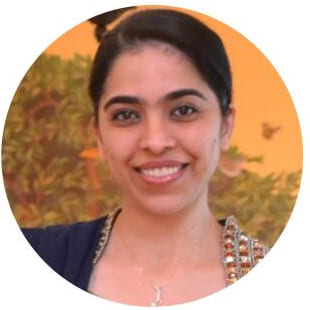
It is a privilege for me to participate in this tribute to Dr. Faroque Khan. In looking back over 50 years of serving as Rabbi of Temple Beth-El of Great Neck, I regard the interreligious work I shared with him to have been among the most gratifying of my rabbinic life. I treasure a yellowing two-page article in Newsday of November 13, 1993, and especially the photograph it highlighted, of our synagogue pulpit with a group from the Islamic Center and Beth-El, observing as I read from the Torah Scroll. Faroque Khan was at my side. It was AMJID, American Muslims and Jews in Dialogue, worshipping together on a Sabbath eve. At that time, the dialogue program we had initiated together was less than two years old; we were not aware we were on a historic path of developing a bond of understanding and friendship among our communities and beyond.
Today, our country is fractured by hateful outbreaks of Islamophobia, antisemitism, racism, and the violence that often accompanies them. We are also witnessing explosive Middle East hostilities. However, we are celebrating the courage, vision, and leadership of Faroque Khan, which enables us to more effectively challenge the enemies of pluralistic democracy, here and abroad, and to do so together with a united voice.
In the early 1990s, America was moving toward a Balkanization that was dividing our population. We no longer idealized America as a melting pot. Nor were we a nation of just Catholics, Protestants, and Jews.
I was most anxious to reach out to the fast-growing Islamic community. Having been chairman of Reform Judaism’s Inter-religious Commission, I knew there had been Islamic and Jewish contacts, but mostly between organizational professionals. We needed to encourage people-to-people contact, rather than each group stereotyping the other. When we do not talk to each other, we end up inventing each other.
History has taught us of the fruitful relationships between Muslims and Jews in the past, especially in the Middle Ages, the Golden Age in Spain as Jews refer to that period. As well, in modern times, Jews in the Middle East were part of the culture of the Muslim world. In Tunisia, Jews and Muslims worshipped together in Mosques in different parts of the building. Muslims saved Jewish children when Nazis invaded.
But in the 1990s, American Jews were profoundly ignorant about Muslims; Jewish Muslim contacts were practically non-existent. Largely because of Middle East tensions, many Jews incorrectly believed most Muslims to be inherently anti- Jewish and anti-American, as well as hostile to Israel’s existence. Also, many Muslims were wary of relationships with Jews, having experienced a lack of acceptance and discrimination by much of the American population. Coming together again was not going to be easy. Many members of both faiths were threatened by the thought of collaboration.
Faroque Khan, however, warmly welcomed our suggestion to meet. In his eloquent writings, Dr. Khan would express his heartfelt feelings with the words, “We found one another again.” And it could not have happened without his enthusiastic conviction that this project was to be truly a sacred mission. I know that it was only because of the great respect for Faroque’s leadership of the ICLI, that he was able to bring an extraordinary group of Muslims, some of whom surely with mixed emotions, to our first gathering. His resolute conviction that we must go forward never weakened, not in the most difficult times, through the decades ahead.
At first, it was a group of Muslims and Jews from two communities, meeting in their homes, and talking about their personal lives. They spoke about being immigrants to America, about aspects of their religions that were most important to each of them, and about beliefs, practices, attitudes, and sacred texts. Soon, we realized how much we had in common: preserving family and religious traditions, confronting the assaults on tolerance and pluralism from a threatening religious right, and the struggle against violence and vulgarity in our society. We recognized the same challenges.
After a number of years, we held large sessions, welcoming the people of both congregations to worship together, shared multiple Passover Seders, concluded a Ramadan fast at the Temple, built a Sukkah in the Mosque, welcomed Muslim and Jewish children to visit each other’s religious schools, and joined in social justice work in the Long Island community.
Tragically, hatred and violence have flamed up in the Middle East during these past months. It makes the work of the Interfaith Institute created by Faroque Khan and the ICLI even more crucial and courageous. The tensions between Israel and the Palestinians were always in the background, however, throughout the many years of AMJID’s existence, and especially when Intifada II erupted in the year 2000, there were expressions of anger on both sides. But with friendship and trust intact, we would shake hands and continue. Faroque’s determination and vision held us to our mission.
There were, also, local attempts to derail our purposes. As Faroque has written, “When we have been attacked by some of our political leaders, when Islamophobes like Pam Geller wanted to spew hatred in Great Neck, Rabbis who have been part of our movement, publicly denounced their falsehoods and hate speech.” I would add that when Mosques and synagogues in the US and elsewhere were targets of antisemitic and anti-Islamic violence, Muslims and Jews went to the victims’ places of worship to bring comfort and express solidarity.
I cannot conclude without emphasizing how Faroque Khan brought his mission, our mission, to Jews and Muslims throughout our nation. Once our local programs were well underway, Dr. Khan spoke to Jewish and Islamic groups, often at national conventions, persuading representatives to begin dialogues in their local communities. There was skepticism and even resistance, but Faroque’s visionary determination planted seeds that developed into significant interreligious dialogues and activism around the US.
Faroque, along with Dr. Isma Chaudhry, and Habeeb and Seemi Ahmed, also visited and taught future rabbis at the Hebrew Union College in New York, encouraging them to prioritize interfaith activity in their future careers. That is why I suggested at the outset of this message, that we are far stronger as we confront the social and political conflicts of today, because of Faroque Khan’s heroic work.
A few years ago, Faroque shared with me some teachings of his dear father, Ghulam Hassan Khan: “We Muslims must, individually and in cooperation with one another, do good, fight against the evil, and cultivate centers of service to bring rays of hope and happiness to homes and to communities.... “
Faroque’s father would surely be very proud of him, as indeed are we.
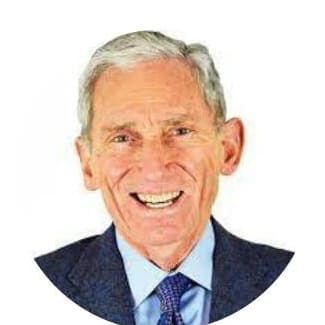
Dr. Faroque Khan is truly A Man for All Seasons. He has done more than any individual I know to build bridges within the faith-based community to promote mutual respect and understanding between and among all faiths, to create a community of activists to combat bias in all its forms, and to stand as a bulwark against those that would divide us.
His fostering of ecumenism has created in the religious community what the Council for Unity does in the schools and communities it serves. Beyond that he has been a catalyst to change the perceptions of children whose views of the Islamic faith were negatively impacted by the media and by politicians who reflect Islamophobia.
To address this, he sponsored an articulation with the Council for Unity members at Westbury Junior High School to attend an orientation on Islam at the Islamic Center of Long Island. The event was covered by Newsday with quotes from both children and teachers of how positively they were impacted by the visit.
And Dr. Khan took this to a broader stage when he invited Board members from ICLI to attend the Council for Unity Induction luncheon at the Crest Hollow Country Club in 2020 where over 1,200 CFU members reflecting over 130 different cultures received benediction from ICLI Imams, ministers, and rabbis. The impact on our kids was profound and uplifting. They were witness to clergy from different faiths embracing the same unity they profess as Council for Unity members. Most had never been witness to such an experience and gave good cause for ‘’Hope’’ for a future of tolerance, mutual respect and common cause.
Dr. Khan has been a heroic instrument for change within the Long Island community and beyond. He deserves every accolade for his capacity to unite us at a time in our nation where so much division exists. He’s our beacon of hope.
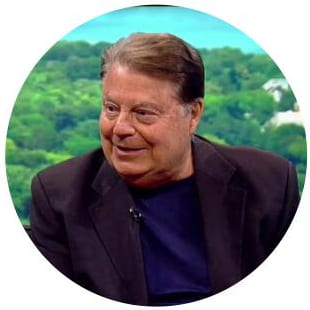
Lyn and I became acquainted with Dr. Khan years ago. My wife and I live just a few blocks from ICLI and attended a Black History Month celebration. Following that afternoon’s presentation, Dr. Khan, knowing about my academic interest in moral development, asked me to lead a session at the mosque on raising a moral child. Following this, knowing about Lyn’s work as a food columnist for the Westbury Times, asked her to organize Eid al-Adha.
This was the beginning of a long association with ICLI and Dr. Khan. His outreach into the local community and beyond, combined with his openness to new ideas for programs that build communities across sectarian lines, has resulted in many programs that have brought together people of varied backgrounds to learn about each other and to learn from one another.
Dr. Khan is a wonderful listener who takes what he considers the best ideas and more often than not brings those ideas to fruition. We’re not sure how he does it, but we can guess: it is his keen sense of what needs to be done combined with an unassuming certainty that it ought to be tried.
If people are judged by their character, by the way they treat others, and by their humility and generosity, then Dr. Khan deserves the accolades he receives. For me, he is a model in more ways than one.
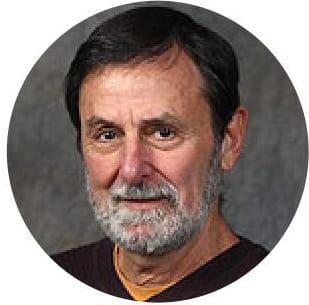
I remember receiving a phone call from Dr. Khan several years ago. We knew of each other through interfaith circles. He said that the work the Interfaith Institute was doing was very similar to the bridge building we are doing on the Brookville Multifaith Campus and that we should collaborate. It was at that time that I became a member of the advisory board. Eventually, Dr. Khan invited me to move to the executive board.
Over the years, we have co-sponsored several events that have promoted learning and dialogue between various religions. Through our work together, I have witnessed Dr. Khan’s desire to build interfaith relationships. This passion for interfaith work has remained evident. His gentle spirit, along with his willingness to allow ideas from both boards of IFI have been strong indicators of his strength of character and ability to work in harmony with others to promote a more peaceful coexistence among those of various faiths.
It has been a privilege to work alongside Dr. Khan and to call him a friend. He has always shown a spirit of camaraderie and treated me as an equal in the work we have done together. I am blessed to know him.
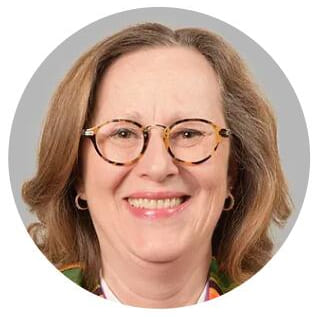
For several decades, Dr. Faroque Khan has been a major force for interreligious understanding and cooperation. Under his leadership, the Interfaith Institute has promoted fruitful exchanges among people of many faiths and has flourished even despite pandemic lockdowns. I am grateful for everything I have learned myself at IFI events, both in- person and in cyberspace.
I am told that “Allahu akbar”, an expression that is common among Muslims, is often translated “God is great”, but literally, it says “God is greater”: The Holy One, the Almighty, the All-Merciful is greater than any conception we have of our Creator, which should cause all of us to question whether we ever are entirely right and others entirely wrong. I learned in an IFI program about Emir Abd el-Kader who said: “If you think God is what the different communities believe— the Muslims, Christians, Jews, Zoroastrians, polytheists, and others— He is that, but also more. If you think and believe what the prophets, saints, and angels profess, He is that, but He is still more.”
Faroque and the IFI remind us that God is more than we know and we all have much to learn from one another.
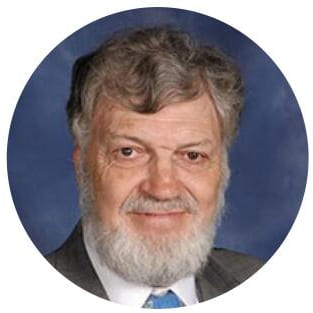
Dr. Faroque Khan has dedicated his life to bringing people together to create understanding, peace, and harmony. I have had the pleasure of knowing Dr. Faroque Khan for most of my life. We grew up in the beautiful, historic region of Kashmir where amazing nature and religious tolerance surrounded us. Faroque Khan studied medicine, while I studied literature and spent most of my time in sports, engaging also with the Medical College team.
I again met Faroque and Arfa when they came to the United States in the late 1960s. They were both physicians working in the Queens area.
Faroque has been a great friend all my life. I remember our times together when as a student I could not afford a car and he would let me use his occasionally! Thank you!
Over the years, Faroque has been engaged as a professional in the medical profession and also in community affairs, particularly as an early and dedicated leader in bringing together first the Muslim community of Long Island and later, forging bonds with other interfaith communities. He has always been a model for projecting tolerance and community involvement. In this regard, his leading the Interfaith Institute has been very important in building cooperation among persons of various faiths, especially at a time when there are many challenges to divide communities.
To me that involvement and leadership have been the most important legacy of my friend Dr. Faroque Khan. He has set a great precedent for all to follow.
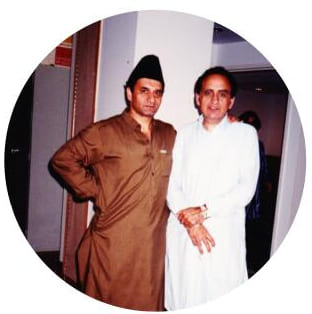
Value our life long friendship between Farooq Kathwari and Faroque A. Khan.
In its brief history, the Interfaith Institute of Long Island has approached the advancement of interfaith understanding and cooperation in many ways.
We’ve had an interfaith Passover Seder at the Islamic Center of Long Island in Westbury, beautifully led by one of our board members, Rabbi Michael White. We’ve had events examining how different faiths approach life cycle events, led by board member Benjamin Rifkin. We’ve had multiple discussions of ethical issues, often based on the writings of board member Arthur Dobrin, a former leader of the Ethical Humanist Society in Garden City. We have also explored subjects that are not specifically interfaith issues, but vital to the understanding of our society, such as the history of slavery on Long Island and the question of “fake news”.
At the heart of all this has been the powerful vision of the institute’s founder, Dr. Faroque Khan. He does not raise his voice or exert undue pressure, but his persistence in pursuing his vision makes it almost impossible to say no to him. (I should know. I haven’t said no to him yet.) You might call him He Who Must Be Obeyed. At this event, he is He Who Must be Honored.
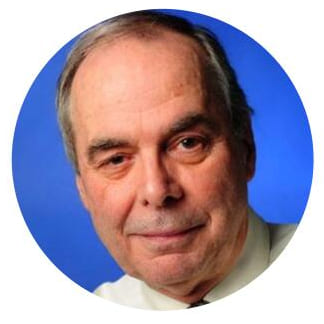
IFI was formally introduced to the community almost eight years ago (since Oct. 25, 2015). A key ingredient for the success of IFI has been its Chairman Dr. Faroque Khan. I’ve known Dr. Faroque Khan since the early 1980s and I’ve never witnessed him being hostile to anyone or expressing anger at anyone. He is always taking the “high road”, trying to keep the peace. He genuinely enjoys bringing people together to learn from each other in an atmosphere of peace. He genuinely enjoys the company and friendship of people of different races, religions, and cultures.
Dr. Faroque Khan is good at recognizing the strengths of individuals and motivating them to action, and periodically reviewing their progress. Over the years, I’ve watched him take an event from an idea to a plan, to the assigning of tasks, to oversight and monitoring, and finally to completion. He has exceptional administrative skills that enable him to coordinate efforts to a successful conclusion.
I join with members of IFI and other interfaith communities in honoring Dr. Faroque Khan for his abilities, thinking, character, and spirit.
May Allah (God) continue to bless him and the Interfaith Institute/IFI to continue to come together with the faithful, and the right-minded people to share mutual teaching, while being patient in the pursuit of the worthy goal of bringing the human family together.
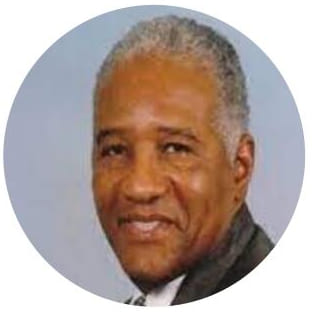
Who would have thought 25 years ago, that a question from a youngster in my Sunday School class would lead me to the Islamic Center of Long Island and the community that owes so much of its vibrant and growing ministry to the vision and the efforts of Dr. Faroque Khan. In my own tradition, our scriptures tell us, “that the one who knows love, knows God and is a child of God... because God is love.” Dr. Khan’s life and work are all about that kind of love in service to the Creator and the people of His Creation. A man of quiet but determined courage and compassion, a brilliant and renowned physician, Dr. Khan works just as hard (and effectively) at building the blessed community through institutions like the Interfaith Institute which has built bridges of education and goodwill across our Island and the world. Dr. Khan proves every day that indeed we can learn to work, grow and live together for the good of all, in harmony and goodwill, even in the divisive times in which we live.
On a personal level, Dr. Khan has been a mentor, a teacher, a comrade, and most of all, an honored and trusted friend. Blessings be upon him and his family!
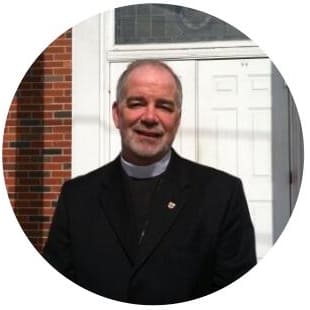
It has been my pleasure and privilege to know and work with Dr. Faroque Khan for more than forty years. He has been an inspiration, a guide, and moreover, a close friend I have cherished all these years.
Whatever initiatives he starts or gets involved in, he participates in them wholeheartedly. His remarkable achievements in running a successful Medicine Residency Training Program in Long Island, his involvement in the establishment and running of The Islamic Center of Long Island (ICLI), his active participation in the initial stages of the Islamic Medical Association of North America (IMANA), as well as The Nargis Dutt Foundation; and various Inter- Faith initiatives are only a few of the activities that come to my mind.
For me, coming from the South Indian state of Kerala, where people of various faiths have been living side by side amicably for thousands of years, Dr. Khan’s efforts in establishing the Interfaith Institute of Long Island (IFI-LI) where people of Abrahamic and Non-Abrahamic faiths are being brought together, have been exemplary. The gradual progress in the development of Inter-Faith activities, first as a dialogue between only Abrahamic religions, and then the establishment of Inter Faith Institute of Long Island where Abrahamic and Non-Abrahamic faiths actively participate, is a commendable achievement.
Let us all pray to God Almighty for his continued well-being so that he can be a guide and inspiration to all of us for many, many more years. Ameen!
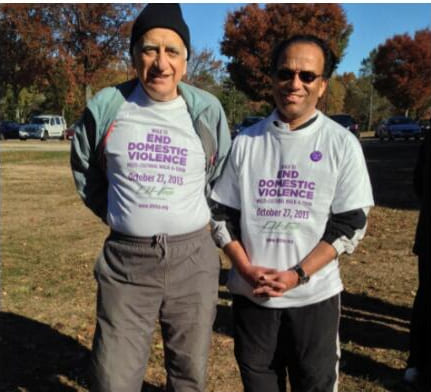
My first memory of Dr. Faroque Khan was from 20 years ago at ICLI, after I enrolled my children in Sunday school and started volunteering for weekend programs. My first impressions of Dr. Faroque were that he was cool, calm, and collected with a great sense of humor and amazing stories to tell of his experiences.
As my volunteering expanded during Dr. Faroque’s leadership as president of ICLI, several key strengths stood out. His vision, motivation, and leadership skills to get the best out of his teams. He entrusted me with producing the ICLI Newsletter for over 3 years. His leadership style is a perfect blend of empathy, respect, and decisiveness, making him a natural motivator for those around him.
He was also instrumental in promoting ICLI to the Long Island community by engaging the center in numerous interfaith and political activities and collaborations. I would say one of his best achievements was creating “Our Muslim Neighbors” TV program with Telecare as part of the God Squad team of the late Monsignor Thomas Hartman and Rabbi Marc Gellman. Under his guidance and leadership, the community has seen unprecedented growth and success. His ability to inspire and rally people around a common goal has led to significant accomplishments in areas such as education, interfaith, and community development.
Dr. Faroque’s achievements have been limitless, and all have been extremely successful with the most recent being the founder of Interfaith Institute of Long Island of which I have been a member since its inception in 2015. The institute has exceeded its spectacular growth by being recognized globally and having key international figures become board members of the institute.
All I can say is that whatever initiatives Dr. Faroque is involved in whether it’s professional, community or volunteer his leadership and participation have brought a different dimension to the success of those initiatives.
I am grateful for his leadership, dedication, and vision for the community of Long Island. He has definitely left an indelible mark on the lives of so many including myself and has shown us what it truly means to be a visionary, motivator, and a leader. Wishing the very best to Dr. Faroque’s future!
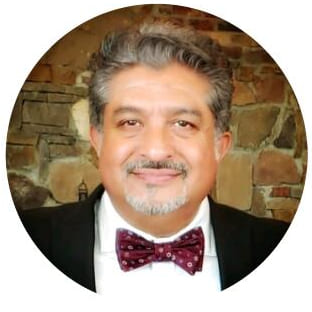
“He who does not thank people does not thank Allah/God.”
I would like to extend my gratitude to Dr. Faroque Khan for his courage in advocating against social and political divisiveness. His leadership has affected generations of Muslims and non- Muslims. He is committed to a deep sense of humanity and human connection and teaches others to value difference and diversity. He is a unifying voice for those who have felt separated by their cultures, religions, and political affiliations. May Allah (SWT) reward him for his efforts and his contributions to our richly varied communities. His intellectual and spiritual nourishment has led many to build bridges across divides and it has brought peace to many. Dr. Khan is a rare kind of person whose legacy lives on through the lives of others.
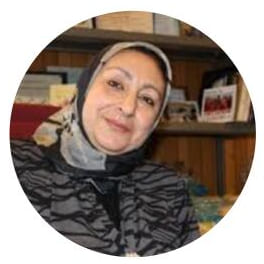
This event is a little reminder just like the movie It’s a Wonderful Life about how you have impacted people’s lives, both professionally and personally. I have been with you since the planning days before ICLI was built. The fundraising parties, Eid party planning, and the efforts to bring the community together and make the holidays memorable for the children always left us with a heartwarming feeling. I personally want to say “Thank you” for normalizing being Muslim when no other classmates knew what Islam was. Then to work with you on the ICLI Board later on in life, to witness the fruits of your dream, and to start The Interfaith Institute of Long Island come to life was an inspiration. Working side by side with you on the Executive Board for IFI, we helped to spearhead many programs to help build bridges between faiths. Under your aegis as Chair of IFI, you have touched many lives, taught about Islam, and made many friends on this path.
Thank you from The Rahman Family for helping us be a brick in the foundation of the Islamic Center of Long Island and thank you personally for being an example one can emulate and be an influence to the next generation of Muslim leaders.
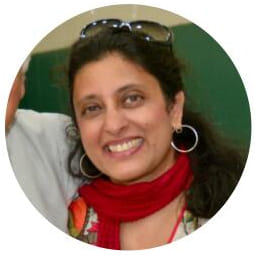
I have known Dr. Khan for as long as I have lived in the U.S., which is over 50 years. It would not be an overstatement to say that Dr. Khan has been a guiding force in my life. He was the elder, the senior we looked up to and admired, as we watched him establish the first mosque on Long Island. In the 1970s, this was no easy feat. I watched in awe as he started an interfaith dialogue program at the Islamic Center of Long Island (ICLI). That feat took courage and immense strength as Muslim- Jewish-Christian dialogue was an unknown entity at the time and launching a new program required consensus building and skill in change management. Today, that effort has matured into the Interfaith Institute of Long Island. Being the trailblazer he is, Dr. Khan memorialized his work in his book, Story of a Mosque in America. That book would serve as a footprint or manual for future mosque-building aspirants. When my husband and I took the first steps in building a mosque on Staten Island, we looked up to Dr. Khan for inspiration. If he could pull it off, perhaps we had a chance too.
Fast forward to post-9/11. As the Muslim community went into shock in the aftermath of the tragedy, Dr. Khan led the movement to restore the image of Muslims in the U.S. When I tried to emulate him in my efforts to engage in interfaith dialogue, Dr. Khan guided me through his counsel in how to phrase my speech, how to respond to questions, and what to do if I didn’t have an answer. To this day, that remains part of my guidebook.
When I decided to write a memoir Threading My Prayer Rug, he offered me all the encouragement I needed, including hosting a book talk at ICLI. For a budding author, it meant a lot. As I continued to write, he graciously agreed to read the manuscript of my next book We Refuse to be Enemies, and provided valuable critique including fact-checking, for which I am grateful. He helped expand my audience when he hosted my book talk in collaboration with Temple Or Elohim and the Interfaith Institute. I reached out to him when my book It’s Not What You Think was being published and once again, agreed to read the manuscript and write a blurb. For someone who is so pressed for time, he has always made time to pull us along. It takes effort, but more than that, it takes a commitment to pave the way for one’s followers.
Dr. Khan is my mentor, my teacher, my supporter, and someone I am proud to call my friend. Congratulations Dr. Khan on receiving this honor. It is well deserved and well earned.
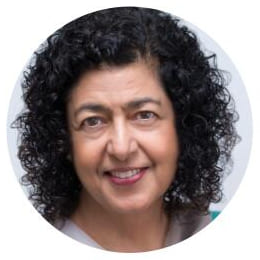
The measure of a person is the number of souls they inspire, touch, heal, and connect, the ways in which they make a difference in the lives of others over an extended period of time or in the brief flash of a moment’s interaction. In all these ways, Dr. Faroque Khan is a giant. In his work as a doctor and in his volunteer activities as a founder of the Interfaith Institute of Long Island, Dr. Khan has contributed to healing both physical and spiritual, bringing together people from diverse backgrounds, inspiring them to put aside preconceived notions of “other” to embrace our common humanity. I served on the board of the IFI for only a few years before moving away from LI. That time in my life was a blessing precisely because I had the opportunity to be inspired by Dr. Khan, an inspiration I take forward into the rest of my life’s journey, to continue the work of bridging that which so often divides us.
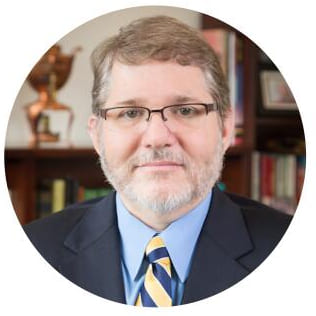
I have a great opportunity to be a part of the Interfaith Institute of Long Island community and grow through its diverse activities in a meaningful way. 40+ board members represent a very highly knowledgeable in their own religion as well as open to understanding, participating, and promoting all interfaith activities.
Jainism promotes “Parasparograho Jivanam”, meaning all life is bound together by mutual support and interdependence. Mahatma Gandhi said, “Like the bee gathering honey from different flowers, the wise person accepts the essence of different scriptures and sees only the good in all religions”.
I witnessed this firsthand by participating in Long Island Multi-Faith Forum. We promoted understanding of different religions in schools, hospitals, and different places of worship. Joining Interfaith Institute of Long Island elevated my spirit to embrace all knowledge possible.
Among participating in diverse activities, what stands out is joining in the discussion on “Shila”, a story written by Professor Arthur Dobrin that aroused different opinions among Christianity, Judaism, Islam, and Jainism and gave me an opportunity to discuss Jain beliefs and principles in detail.
During COVID-19 limitations, Dr. Faroque Khan, being a Kashmiri, encouraged me to plan a Zoom Diwali celebration in which Hindu, Jain, Buddhist, and Sikh representatives participated. What stood out was the principles of Diwali: “Light over darkness, Knowledge over ignorance & Good over evil” was discussed as represented in all other religions making it a true interfaith celebration.
Professor Ben Rifkin explored an idea of an interfaith discussion of “the Life cycle events”, where rituals in birth, adolescence, marriage, and death were explored each month. These discussions truly brought out the meaning of each of our routine rituals.
By participating in IFI activities, I realized, “River, pond, lake, and stream have different names but all contain water. Religions have different names but all contain truth”, a quote by Muhammad Ali.
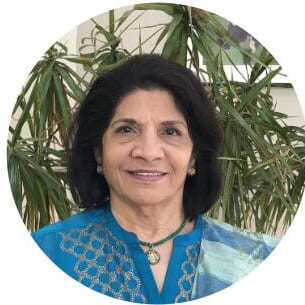
May God grant mercy, compassion, empathy, and grace....
These words are from the Jewish prayerbook; they are a prayer for peace, included in every morning service. In our Jewish faith, divine attributes become aspirational for humanity. It is the understanding that God’s blessings of mercy, compassion, empathy, and grace come through us.
I have known Dr. Faroque Khan for over two decades, and our friendship is one of the greatest blessings in my life. Dr. Faroque Khan is indeed an emissary of the divine blessings of grace, empathy, compassion, and more. He is both a powerful and influential leader and among the kindest men I know. I imagine his sensitive, empathetic bedside manner as a physician and his gentle, yet firm, mentorship as a teacher And I know his great gifts as a founder and leader of the Islamic Center of Long Island and the Interfaith Institute of Long Island. Dr. Khan listens, is always interested in what others have to say, and lifts up others in partnership. Compassion and warmth flow from his soul.
I have had the honor of collaborating with Dr. Khan on many important initiatives, including discussions at the Interfaith Institute, an interfaith Passover Seder, and a discussion on the horrific genocide of Uyghurs in China. In every collaborative conversation, Dr. Khan reminds us of our commitment to universal values of human dignity, human rights, and justice. And his engaging, accessible leadership style draws us in and enables outstanding, sacred work.
Dr. Khan is a man of unceasing dignity, wisdom, and humor. He is, truly, one of the finest human beings and leaders I know. The members of my community, Temple Sinai of Roslyn, have benefitted from his talks over the years, and we consider him part of our temple family. I am honored to know him.
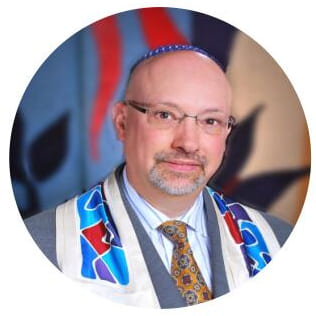
I do not remember when I met Dr. Faroque Khan, but I will never forget how I felt when I did. We had a discussion on how to address an environment of suspicion, hostility, resentment, and, worst of all, indifference to those people and institutions enduring the ravages of Islamophobia and other scourges. It was a painful discussion. But at the core of Dr. Khan was love.
People with justifiable anger, righteous indignation, an unwillingness to endure injustice, and a commitment to take action to create change, but without love at their core, seem to eventually become bitter, frustrated, and burnt out. I have been close, more than once, to being one of these people.
I have learned from Dr. Khan to pace myself, keep my expectations realistic, keep my eyes on the prize, and even in very upsetting circumstances of which there have been many, to remain civil, decent, and proper. I came to the ICLI, the IFI, and to Dr. Khan to be of service, and in so doing I have become a better person, and more effective in my mission to help as best I can to improve the world.
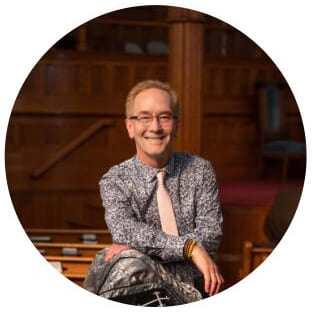
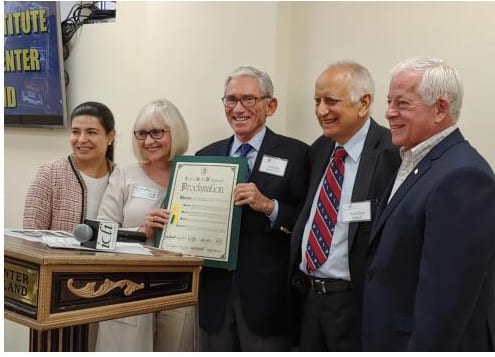
Rabbi J. Davidson, the recipient of the 3rd annual IFI award for his pioneering in initiating the American Muslims and Jews Dialogue in Jan. 1992. Left to right: Senator Anna Kaplan, Supervisor Judy Bosworth, Rabbi J Davidson, Faroque Khan, and Assemblyman Charles Levine.
 - Eric Hamza Byas-97.jpg)
 - Eric Hamza Byas-98.jpg)
 - Eric Hamza Byas-99.jpg)
 - Eric Hamza Byas-100.jpg)